You are using an outdated browser. Upgrade your browser today or install Google Chrome Frame to better experience this site.

Bosnia and Herzegovina Traveler View
Travel health notices, vaccines and medicines, non-vaccine-preventable diseases, stay healthy and safe.
- Packing List
After Your Trip
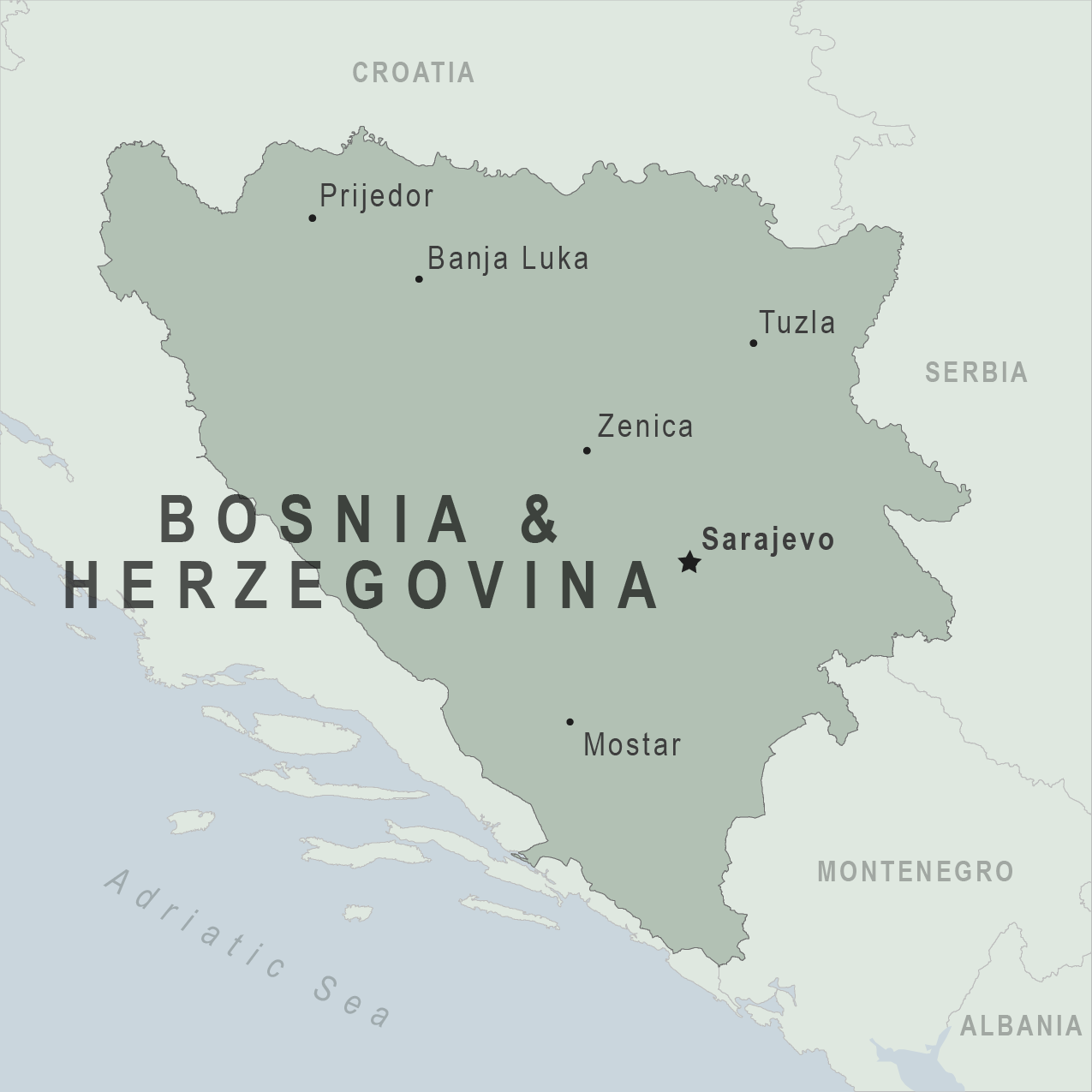
There are no notices currently in effect for Bosnia and Herzegovina.
⇧ Top
Check the vaccines and medicines list and visit your doctor at least a month before your trip to get vaccines or medicines you may need. If you or your doctor need help finding a location that provides certain vaccines or medicines, visit the Find a Clinic page.
Routine vaccines
Recommendations.
Make sure you are up-to-date on all routine vaccines before every trip. Some of these vaccines include
- Chickenpox (Varicella)
- Diphtheria-Tetanus-Pertussis
- Flu (influenza)
- Measles-Mumps-Rubella (MMR)
Immunization schedules
All eligible travelers should be up to date with their COVID-19 vaccines. Please see Your COVID-19 Vaccination for more information.
COVID-19 vaccine
Hepatitis A
Recommended for unvaccinated travelers one year old or older going to Bosnia and Herzegovina.
Infants 6 to 11 months old should also be vaccinated against Hepatitis A. The dose does not count toward the routine 2-dose series.
Travelers allergic to a vaccine component or who are younger than 6 months should receive a single dose of immune globulin, which provides effective protection for up to 2 months depending on dosage given.
Unvaccinated travelers who are over 40 years old, immunocompromised, or have chronic medical conditions planning to depart to a risk area in less than 2 weeks should get the initial dose of vaccine and at the same appointment receive immune globulin.
Hepatitis A - CDC Yellow Book
Dosing info - Hep A
Hepatitis B
Recommended for unvaccinated travelers younger than 60 years old traveling to Bosnia and Herzegovina. Unvaccinated travelers 60 years and older may get vaccinated before traveling to Bosnia and Herzegovina.
Hepatitis B - CDC Yellow Book
Dosing info - Hep B
Cases of measles are on the rise worldwide. Travelers are at risk of measles if they have not been fully vaccinated at least two weeks prior to departure, or have not had measles in the past, and travel internationally to areas where measles is spreading.
All international travelers should be fully vaccinated against measles with the measles-mumps-rubella (MMR) vaccine, including an early dose for infants 6–11 months, according to CDC’s measles vaccination recommendations for international travel .
Measles (Rubeola) - CDC Yellow Book
Dogs infected with rabies are not commonly found in Bosnia and Herzegovina.
Rabies is present in some terrestrial wildlife species.
If rabies exposures occur while in Bosnia and Herzegovina, rabies vaccines are typically available throughout most of the country.
Rabies pre-exposure vaccination considerations include whether travelers 1) will be performing occupational or recreational activities that increase risk for exposure to potentially rabid animals and 2) might have difficulty getting prompt access to safe post-exposure prophylaxis.
Please consult with a healthcare provider to determine whether you should receive pre-exposure vaccination before travel.
For more information, see country rabies status assessments .
Rabies - CDC Yellow Book
Tick-borne Encephalitis
For travelers moving or traveling to TBE-endemic areas
TBE vaccine is recommended for persons who will have extensive exposure to ticks based on their planned outdoor activities and itinerary.
TBE vaccine may be considered for persons who might engage in outdoor activities in areas ticks are likely to be found.
Tick-borne Encephalitis - CDC Yellow Book
Avoid contaminated water
Leptospirosis
How most people get sick (most common modes of transmission)
- Touching urine or other body fluids from an animal infected with leptospirosis
- Swimming or wading in urine-contaminated fresh water, or contact with urine-contaminated mud
- Drinking water or eating food contaminated with animal urine
- Avoid contaminated water and soil
- Avoid floodwater
Clinical Guidance
Avoid bug bites.
Crimean-Congo Hemorrhagic fever
- Tick bite
- Touching the body fluids of a person or animal infected with CCHF
- Avoid Bug Bites
Leishmaniasis
- Sand fly bite
Airborne & droplet
- Breathing in air or accidentally eating food contaminated with the urine, droppings, or saliva of infected rodents
- Bite from an infected rodent
- Less commonly, being around someone sick with hantavirus (only occurs with Andes virus)
- Avoid rodents and areas where they live
- Avoid sick people
Tuberculosis (TB)
- Breathe in TB bacteria that is in the air from an infected and contagious person coughing, speaking, or singing.
Learn actions you can take to stay healthy and safe on your trip. Vaccines cannot protect you from many diseases in Bosnia and Herzegovina, so your behaviors are important.
Eat and drink safely
Food and water standards around the world vary based on the destination. Standards may also differ within a country and risk may change depending on activity type (e.g., hiking versus business trip). You can learn more about safe food and drink choices when traveling by accessing the resources below.
- Choose Safe Food and Drinks When Traveling
- Water Treatment Options When Hiking, Camping or Traveling
- Global Water, Sanitation and Hygiene (WASH)
- Avoid Contaminated Water During Travel
You can also visit the Department of State Country Information Pages for additional information about food and water safety.
Prevent bug bites
Bugs (like mosquitoes, ticks, and fleas) can spread a number of diseases in Bosnia and Herzegovina. Many of these diseases cannot be prevented with a vaccine or medicine. You can reduce your risk by taking steps to prevent bug bites.
What can I do to prevent bug bites?
- Cover exposed skin by wearing long-sleeved shirts, long pants, and hats.
- Use an appropriate insect repellent (see below).
- Use permethrin-treated clothing and gear (such as boots, pants, socks, and tents). Do not use permethrin directly on skin.
- Stay and sleep in air-conditioned or screened rooms.
- Use a bed net if the area where you are sleeping is exposed to the outdoors.
What type of insect repellent should I use?
- FOR PROTECTION AGAINST TICKS AND MOSQUITOES: Use a repellent that contains 20% or more DEET for protection that lasts up to several hours.
- Picaridin (also known as KBR 3023, Bayrepel, and icaridin)
- Oil of lemon eucalyptus (OLE) or para-menthane-diol (PMD)
- 2-undecanone
- Always use insect repellent as directed.
What should I do if I am bitten by bugs?
- Avoid scratching bug bites, and apply hydrocortisone cream or calamine lotion to reduce the itching.
- Check your entire body for ticks after outdoor activity. Be sure to remove ticks properly.
What can I do to avoid bed bugs?
Although bed bugs do not carry disease, they are an annoyance. See our information page about avoiding bug bites for some easy tips to avoid them. For more information on bed bugs, see Bed Bugs .
For more detailed information on avoiding bug bites, see Avoid Bug Bites .
Stay safe outdoors
If your travel plans in Bosnia and Herzegovina include outdoor activities, take these steps to stay safe and healthy during your trip.
- Stay alert to changing weather conditions and adjust your plans if conditions become unsafe.
- Prepare for activities by wearing the right clothes and packing protective items, such as bug spray, sunscreen, and a basic first aid kit.
- Consider learning basic first aid and CPR before travel. Bring a travel health kit with items appropriate for your activities.
- If you are outside for many hours in heat, eat salty snacks and drink water to stay hydrated and replace salt lost through sweating.
- Protect yourself from UV radiation : use sunscreen with an SPF of at least 15, wear protective clothing, and seek shade during the hottest time of day (10 a.m.–4 p.m.).
- Be especially careful during summer months and at high elevation. Because sunlight reflects off snow, sand, and water, sun exposure may be increased during activities like skiing, swimming, and sailing.
- Very cold temperatures can be dangerous. Dress in layers and cover heads, hands, and feet properly if you are visiting a cold location.
Stay safe around water
- Swim only in designated swimming areas. Obey lifeguards and warning flags on beaches.
- Practice safe boating—follow all boating safety laws, do not drink alcohol if driving a boat, and always wear a life jacket.
- Do not dive into shallow water.
- Do not swim in freshwater in developing areas or where sanitation is poor.
- Avoid swallowing water when swimming. Untreated water can carry germs that make you sick.
- To prevent infections, wear shoes on beaches where there may be animal waste.
Keep away from animals
Most animals avoid people, but they may attack if they feel threatened, are protecting their young or territory, or if they are injured or ill. Animal bites and scratches can lead to serious diseases such as rabies.
Follow these tips to protect yourself:
- Do not touch or feed any animals you do not know.
- Do not allow animals to lick open wounds, and do not get animal saliva in your eyes or mouth.
- Avoid rodents and their urine and feces.
- Traveling pets should be supervised closely and not allowed to come in contact with local animals.
- If you wake in a room with a bat, seek medical care immediately. Bat bites may be hard to see.
All animals can pose a threat, but be extra careful around dogs, bats, monkeys, sea animals such as jellyfish, and snakes. If you are bitten or scratched by an animal, immediately:
- Wash the wound with soap and clean water.
- Go to a doctor right away.
- Tell your doctor about your injury when you get back to the United States.
Consider buying medical evacuation insurance. Rabies is a deadly disease that must be treated quickly, and treatment may not be available in some countries.
Reduce your exposure to germs
Follow these tips to avoid getting sick or spreading illness to others while traveling:
- Wash your hands often, especially before eating.
- If soap and water aren’t available, clean hands with hand sanitizer (containing at least 60% alcohol).
- Don’t touch your eyes, nose, or mouth. If you need to touch your face, make sure your hands are clean.
- Cover your mouth and nose with a tissue or your sleeve (not your hands) when coughing or sneezing.
- Try to avoid contact with people who are sick.
- If you are sick, stay home or in your hotel room, unless you need medical care.
Avoid sharing body fluids
Diseases can be spread through body fluids, such as saliva, blood, vomit, and semen.
Protect yourself:
- Use latex condoms correctly.
- Do not inject drugs.
- Limit alcohol consumption. People take more risks when intoxicated.
- Do not share needles or any devices that can break the skin. That includes needles for tattoos, piercings, and acupuncture.
- If you receive medical or dental care, make sure the equipment is disinfected or sanitized.
Know how to get medical care while traveling
Plan for how you will get health care during your trip, should the need arise:
- Carry a list of local doctors and hospitals at your destination.
- Review your health insurance plan to determine what medical services it would cover during your trip. Consider purchasing travel health and medical evacuation insurance.
- Carry a card that identifies, in the local language, your blood type, chronic conditions or serious allergies, and the generic names of any medications you take.
- Some prescription drugs may be illegal in other countries. Call Bosnia and Herzegovina’s embassy to verify that all of your prescription(s) are legal to bring with you.
- Bring all the medicines (including over-the-counter medicines) you think you might need during your trip, including extra in case of travel delays. Ask your doctor to help you get prescriptions filled early if you need to.
Many foreign hospitals and clinics are accredited by the Joint Commission International. A list of accredited facilities is available at their website ( www.jointcommissioninternational.org ).
In some countries, medicine (prescription and over-the-counter) may be substandard or counterfeit. Bring the medicines you will need from the United States to avoid having to buy them at your destination.
Select safe transportation
Motor vehicle crashes are the #1 killer of healthy US citizens in foreign countries.
In many places cars, buses, large trucks, rickshaws, bikes, people on foot, and even animals share the same lanes of traffic, increasing the risk for crashes.
Be smart when you are traveling on foot.
- Use sidewalks and marked crosswalks.
- Pay attention to the traffic around you, especially in crowded areas.
- Remember, people on foot do not always have the right of way in other countries.
Riding/Driving
Choose a safe vehicle.
- Choose official taxis or public transportation, such as trains and buses.
- Ride only in cars that have seatbelts.
- Avoid overcrowded, overloaded, top-heavy buses and minivans.
- Avoid riding on motorcycles or motorbikes, especially motorbike taxis. (Many crashes are caused by inexperienced motorbike drivers.)
- Choose newer vehicles—they may have more safety features, such as airbags, and be more reliable.
- Choose larger vehicles, which may provide more protection in crashes.
Think about the driver.
- Do not drive after drinking alcohol or ride with someone who has been drinking.
- Consider hiring a licensed, trained driver familiar with the area.
- Arrange payment before departing.
Follow basic safety tips.
- Wear a seatbelt at all times.
- Sit in the back seat of cars and taxis.
- When on motorbikes or bicycles, always wear a helmet. (Bring a helmet from home, if needed.)
- Avoid driving at night; street lighting in certain parts of Bosnia and Herzegovina may be poor.
- Do not use a cell phone or text while driving (illegal in many countries).
- Travel during daylight hours only, especially in rural areas.
- If you choose to drive a vehicle in Bosnia and Herzegovina, learn the local traffic laws and have the proper paperwork.
- Get any driving permits and insurance you may need. Get an International Driving Permit (IDP). Carry the IDP and a US-issued driver's license at all times.
- Check with your auto insurance policy's international coverage, and get more coverage if needed. Make sure you have liability insurance.
- Avoid using local, unscheduled aircraft.
- If possible, fly on larger planes (more than 30 seats); larger airplanes are more likely to have regular safety inspections.
- Try to schedule flights during daylight hours and in good weather.
Medical Evacuation Insurance
If you are seriously injured, emergency care may not be available or may not meet US standards. Trauma care centers are uncommon outside urban areas. Having medical evacuation insurance can be helpful for these reasons.
Helpful Resources
Road Safety Overseas (Information from the US Department of State): Includes tips on driving in other countries, International Driving Permits, auto insurance, and other resources.
The Association for International Road Travel has country-specific Road Travel Reports available for most countries for a minimal fee.
Maintain personal security
Use the same common sense traveling overseas that you would at home, and always stay alert and aware of your surroundings.
Before you leave
- Research your destination(s), including local laws, customs, and culture.
- Monitor travel advisories and alerts and read travel tips from the US Department of State.
- Enroll in the Smart Traveler Enrollment Program (STEP) .
- Leave a copy of your itinerary, contact information, credit cards, and passport with someone at home.
- Pack as light as possible, and leave at home any item you could not replace.
While at your destination(s)
- Carry contact information for the nearest US embassy or consulate .
- Carry a photocopy of your passport and entry stamp; leave the actual passport securely in your hotel.
- Follow all local laws and social customs.
- Do not wear expensive clothing or jewelry.
- Always keep hotel doors locked, and store valuables in secure areas.
- If possible, choose hotel rooms between the 2nd and 6th floors.
Healthy Travel Packing List
Use the Healthy Travel Packing List for Bosnia and Herzegovina for a list of health-related items to consider packing for your trip. Talk to your doctor about which items are most important for you.
Why does CDC recommend packing these health-related items?
It’s best to be prepared to prevent and treat common illnesses and injuries. Some supplies and medicines may be difficult to find at your destination, may have different names, or may have different ingredients than what you normally use.
If you are not feeling well after your trip, you may need to see a doctor. If you need help finding a travel medicine specialist, see Find a Clinic . Be sure to tell your doctor about your travel, including where you went and what you did on your trip. Also tell your doctor if you were bitten or scratched by an animal while traveling.
For more information on what to do if you are sick after your trip, see Getting Sick after Travel .
Map Disclaimer - The boundaries and names shown and the designations used on maps do not imply the expression of any opinion whatsoever on the part of the Centers for Disease Control and Prevention concerning the legal status of any country, territory, city or area or of its authorities, or concerning the delimitation of its frontiers or boundaries. Approximate border lines for which there may not yet be full agreement are generally marked.
Other Destinations
If you need help finding travel information:
Message & data rates may apply. CDC Privacy Policy
File Formats Help:
- Adobe PDF file
- Microsoft PowerPoint file
- Microsoft Word file
- Microsoft Excel file
- Audio/Video file
- Apple Quicktime file
- RealPlayer file
- Zip Archive file
Exit Notification / Disclaimer Policy
- The Centers for Disease Control and Prevention (CDC) cannot attest to the accuracy of a non-federal website.
- Linking to a non-federal website does not constitute an endorsement by CDC or any of its employees of the sponsors or the information and products presented on the website.
- You will be subject to the destination website's privacy policy when you follow the link.
- CDC is not responsible for Section 508 compliance (accessibility) on other federal or private website.
Security Alert May 17, 2024
Worldwide caution, update may 10, 2024, information for u.s. citizens in the middle east.
- Travel Advisories |
- Contact Us |
- MyTravelGov |
Find U.S. Embassies & Consulates
Travel.state.gov, congressional liaison, special issuance agency, u.s. passports, international travel, intercountry adoption, international parental child abduction, records and authentications, popular links, travel advisories, mytravelgov, stay connected, legal resources, legal information, info for u.s. law enforcement, replace or certify documents.
Before You Go
Learn About Your Destination
While Abroad
Emergencies
Share this page:
Bosnia and Herzegovina
Travel Advisory July 26, 2023
Bosnia and herzegovina - level 2: exercise increased caution.
Reissued with obsolete COVID-19 page links removed.
Exercise increased caution in Bosnia and Herzegovina due to terrorism and land mines .
Country Summary: Terrorist groups continue plotting possible attacks in Bosnia and Herzegovina. Terrorists may attack with little or no warning, targeting tourist locations, transportation hubs, markets/shopping malls, local government facilities, hotels, clubs, restaurants, places of worship, parks, major sporting and cultural events, educational institutions, airports, and other public areas.
Minefields and land mines are present throughout Bosnia and Herzegovina. While suspected hazardous areas are normally clearly marked, several people are killed or injured each year.
Read the country information page for additional information on travel to Bosnia and Herzegovina.
If you decide to travel to Bosnia and Herzegovina:
- Be aware of your surroundings when traveling to tourist locations and crowded public venues.
- Monitor local media for breaking events and adjust your plans based on new information.
- Remain on hard-surfaced roads and stay out of abandoned buildings due to risks from land mines.
- Enroll in the Smart Traveler Enrollment Program (STEP) to receive Alerts and make it easier to locate you in an emergency.
- Follow the Department of State on Facebook and Twitter .
- Review the Country Security Report for Bosnia and Herzegovina.
- Visit the CDC page for the latest Travel Health Information related to your travel.
- Prepare a contingency plan for emergency situations. Review the Traveler’s Checklist .
Embassy Messages
View Alerts and Messages Archive
Quick Facts
Three months past your planned date of departure
One page required for entry stamp
Not required for stays under three months
None required
Amounts exceeding 10,000 Euros or equivalent must be declared on arrival
Amounts exceeding 10,000 Euros or equivalent require a bank certificate that the amount has been taken out from currency savings or bought from an authorized bank.
Embassies and Consulates
U.s. embassy sarajevo.
1 Robert C. Frasure Street 71000 Sarajevo Bosnia & Herzegovina Telephone: +(387) (33) 704 000 Emergency After-Hours Telephone: +(387) (33) 704-000. If after dialing you receive a recorded message, press “0” and ask for the embassy duty officer. Fax: +(387) (33) 221 837 Email: [email protected]
Destination Description
Learn about the U.S. relationship to countries around the world.
Entry, Exit and Visa Requirements
Visit the Embassy of Bosnia and Herzegovina website for the most current visa information.
You need a passport valid for at least three months past your planned date of departure.
Bosnia and Herzegovina will deny entry to U.S. passport holders who attempt to enter on expired U.S. passports or U.S. passports which were previously reported as lost or stolen.
U.S. citizens do not need a visa for stays of up to 90 days total within a period of six months from the date of first entry.
Bosnia and Herzegovina does not issue visas to U.S. travelers prior to travel for any length of stay or purpose of travel, including diplomatic assignments.
Airlines may deny boarding to travelers on a one-way ticket or a ticket with a return date beyond three months from the date of arrival. Verify with the airline before travel.
If staying in a private residence for three or more days, you or your host must register your stay with the local police or field office of the Department for Foreigners within 24 hours of arrival.
Temporary Residence Permits:
U.S. citizens staying more than 90 days must apply for a temporary residence permit from the local field office of the Department for Foreigners of the Bosnia and Herzegovina Ministry of Security. The process is complex. Visit the Department for Foreigners of the Ministry of Security website for detailed information and requirements.
Gather the required documentation well in advance and submit the application as soon after arriving in-country as possible. You must submit your temporary residence permit application at least 15 days prior to the expiration of the initial 90-day visa-free period of stay.
You are required to submit a police report from your local, U.S. police department certifying you have no criminal record. This must be issued within 6 months of the application.
After all application requirements are met, a months-long delay can occur before a residence permit is issued. U.S. citizens who submit complete applications may remain in Bosnia and Herzegovina while awaiting decisions.
The maximum duration of a temporary residence permit is 12 months (renewals are possible).
Your U.S. passport must be valid for at least three months after the end of the requested temporary residence permit period.
Requirements for minors traveling to Bosnia and Herzegovina:
- Notarized permission from the parents or guardians is required for minors under 18 traveling alone.
- If the child is accompanied by one parent, particularly if the parent has a different last name from the child’s, it is recommended, although not legally required, that the accompanying parent carry a notarized letter from the other parent giving permission to travel.
The U.S. Department of State is unaware of any HIV/AIDS entry restrictions for visitors to or foreign residents of Bosnia and Herzegovina.
Find information on dual nationality , prevention of international child abduction and customs regulations on our websites
Safety and Security
Terrorism : Terrorist groups and those inspired by such organizations are intent on attacking soft targets and are increasingly using less sophisticated methods of attack – including knives, firearms, rudimentary explosive devices, and vehicles – to more effectively target crowds. Frequently, their aim is unprotected or vulnerable targets, such as:
High-profile public events (sporting contests, political rallies, demonstrations, holiday events, celebratory gatherings, etc.)
- Hotels, clubs, and restaurants frequented by tourists
- Places of worship
- Shopping malls and markets
- Public transportation systems (including subways, buses, trains, and scheduled commercial flights)
Violent incidents :
- Local criminals use firearms and explosives to settle disputes, with the majority of incidents involving improvised explosives in Sarajevo occurring after dark. The foreign community is rarely targeted, but collateral damage can occur.
- See LGBTQI+ Travelers, below, for information regarding recent violent incidents targeting members of the LGBTQI+ community.
For more information, see our Terrorism page.
Crime : The overall crime rate for the country is high, and Sarajevo has a high rate of property-related crime.
- The most common criminal activities in Sarajevo are robberies, residential break-ins, vehicle break-ins and theft, and pickpocketing.
- Pickpocketing occurs in areas frequented by tourists in Sarajevo.
- Be alert at all times, especially after dark and in locations frequented by tourists, such as cafés, parking garages, shopping areas, and restaurants.
- Take normal precautions to protect your property from theft and employ personal security measures, such as traveling in groups and staying in well-lit areas after dark.
- Avoid carrying large sums of money.
- People wearing backpacks stand out and attract the attention of pickpockets.
Landmines :
- Landmine explosions have injured over 1,200 and killed over 600 people in Bosnia and Herzegovina since 1995.
- Minefields, active landmines, and unexploded ordnances are a threat throughout the country and deaths from explosions have occurred as recently as March 2023.
- Stay on hard surfaced areas and out of abandoned buildings. Observe mine warning signs throughout the country. Consult with the latest landmine maps via the Bosnia and Herzegovina Mine Action Center . Regardless of an area’s mine status, avoid unmarked trails.
- For more information about landmines and unexploded ordinance, please visit the website of the Bosnia and Herzegovina Mine Action Center .
Demonstrations can occur anywhere in Bosnia and Herzegovina. They may take place in response to political or economic issues, on politically significant holidays, and during international or sporting events.
- Demonstrations can be unpredictable. Avoid areas around protests and demonstrations.
- Check local media for updates and traffic advisories.
- Large demonstrations, even if peaceful, can create traffic congestion and lead to closures of public transportation, roadways, and sidewalks.
Soccer matches :
- Rival fans occasionally fight and cause property damage and physical injuries. Plan ahead to avoid the area.
- Physical confrontations surrounding soccer matches have included right-wing nationalist, racist, or anti-LGBTQI+ violence.
- Large groups of soccer fans can quickly become violent. Avoid crowds and large groups.
- Large crowds before and after matches can create significant traffic congestion, crowding at drinking and eating establishments, and problems for pedestrians. Road and sidewalk closures are common.
Feral dogs :
- Avoid stray dogs. Packs or individual dog attacks occur in urban and rural areas and can be unpredictable.
- Though emergency medical facilities can treat dog bites and rabies vaccines are available, travelers should consider a series of pre-exposure rabies vaccinations prior to arrival.
- For further information, please consult the CDC’s information on rabies .
International Financial Scams : See the Department of State and the FBI pages for information.
Victims of Crime : U.S. citizen victims of sexual assault are encouraged to contact the U.S. Embassy for assistance. Report crimes to the local police at 122 and contact the U.S. Embassy at (387) 33 704 000. Remember that local authorities are responsible for investigating and prosecuting crimes.
See our webpage on help for U.S. victims of crime overseas .
Assistance the Embassy may be able to provide to crime victims:
- Help you find appropriate medical care
- Assist you in reporting a crime to the police
- Contact relatives or friends with your written consent
- Explain the local criminal justice process in general terms
- Provide a list of local attorneys
- Provide our information on victim’s compensation programs in the United States .
- Provide an emergency loan for repatriation to the United States and/or limited medical support in cases of destitution
- Help you find accommodation and arrange flights home
- Replace a stolen or lost passport
Domestic Violence : U.S. citizen victims of domestic violence may contact the Embassy for assistance but should also report incidents to the police in the area where the incident occurred.
Tourism : The tourism industry is unevenly regulated, and safety inspections for equipment and facilities are infrequent. Hazardous areas/activities are not always identified with appropriate signage, and staff may not be trained or certified. In the event of an injury, medical treatment may only be available in/near major cities. Outside of cities, first responders may not be available to provide urgent medical treatment. U.S. citizens are encouraged to purchase medical evacuation insurance .
Local Laws & Special Circumstances
CRIMINAL PENALTIES : In Bosnia and Herzegovina, you are subject to local laws. If you violate local laws, even unknowingly, you may be arrested, imprisoned, or deported. Individuals establishing a business or practicing a profession that requires additional permits or licensing should seek information from the competent local authorities, prior to practicing or operating a business.
It is against the law to photograph military or secure installations, including airports, equipment, bridges, government checkpoints, troops, or embassies. If in doubt, ask permission before taking photographs.
In Bosnia and Herzegovina, penalties are severe for possessing, using, or trafficking in illegal drugs. Courts impose long jail sentences and heavy fines.
See our website on crimes against minors abroad and the Department of Justice website.
Arrest Notification : If you are arrested or detained, ask police to notify the U.S. Embassy immediately. See our webpage for further information.
Faith-Based Travelers : See our following webpages for details:
- Faith-Based Travel Information
- International Religious Freedom Report – see country reports
- Human Rights Report – see country reports
- Hajj Fact Sheet for Travelers
- Best Practices for Volunteering Abroad
Financial Services/Transactions :
- The official currency in Bosnia and Herzegovina is the Convertible Mark (KM or BAM), which is pegged to the euro at approximately 2 KM = 1 euro.
- Bosnia and Herzegovina is predominantly a cash economy.
- Some businesses accept credit cards, but travelers should not expect to use credit cards to cover all expenses.
- Automated teller machines (ATMs) are available at the banks in Sarajevo and other cities and towns.
- Traveler’s checks are not widely accepted and cannot be cashed in every bank.
- Cash transfers from abroad may involve delays, but Western Union transfers are available in many banks and post offices throughout the country.
- All official payments must be made in convertible marks (KM).
- Foreigners attempting to exchange money or claim a wire transfer should be prepared to present their passport to complete the transaction.
LGBTQI+ Travelers : There are no current legal restrictions on same-sex sexual relations or the organization of LGBTQI+ events in Bosnia and Herzegovina, although elected officials in the Republika Srpska have proposed banning LGBTQI+ rights activists from holding events at, visiting, or working in educational institutions. Elected officials have also said that they will not permit any LGBTQI+ events in the Republika Srpska entity.
- Discrimination based on sexual orientation and gender identity is widespread in Bosnia and Herzegovina.
- Acts of violence and harassment targeting LGBTQI+ individuals or organizations supporting LGBTQI+ rights have occurred, and police were sometimes slow to respond or failed to investigate the incidents and prosecute perpetrators.
- Government officials have made derogatory comments about LGBTQI+ persons and about organizations promoting human rights.
- While the laws at the state, entity, and Brcko District levels prohibit discrimination based on sexual orientation, authorities have not fully enforced them. Some elected officials have proposed laws to restrict the activities of LGBTQI+ rights groups.
- Pride event participants have been threatened in the past and participants should expect a heavy police presence.
- See our LGBTQI+ Travel Information page and section six of our Human Rights report for further details.
Travelers with Disabilities : Bosnia and Herzegovina’s laws prohibit discrimination against persons with physical, sensory, intellectual, or mental disabilities, but the law is only partially enforced, and discrimination continues.
- Social acceptance of persons with disabilities is not as prevalent as in the United States. The most common type of accessibility is wheelchair accessibility to public buildings.
- Accessibility is limited in urban public transportation, lodging, and communication/information and generally unavailable outside urban areas.
- There is limited availability of sign language interpreters, personal assistants, or other related services. Access to special rental, repair, or replacement equipment is very limited.
Students : See our Students Abroad page and FBI travel tips .
Women Travelers : See our travel tips for women travelers .
Medical Facilities and Medications:
- The U.S. Embassy maintains a list of doctors and hospitals . We do not endorse or recommend any specific medical provider or clinic.
- Adequate medical facilities may not be available outside of Sarajevo and may not be up to U.S. standards.
- Medications may not be obtainable in, or shippable to Bosnia and Herzegovina.
- You may consider bringing your own supply of prescription drugs and preventive medicines, but you should confirm with a medical professional before you travel that medications are legal for use or importation to Bosnia and Herzegovina. Some medications which are legal for use in the United States may not be legal in Bosnia and Herzegovina.
- Marijuana-derived compounds, such as cannabidiol (CBD), are not legal in Bosnia and Herzegovina. Travelers are limited to a seven-day supply of any medications that are considered controlled substances in the United States.
- Carry prescription medication in original packaging, along with your relevant medical documentation, such as a recent doctor’s prescription and transcript of medical history.
- All major surgery is performed in public hospitals.
- English-speaking health providers (including mental health services) may not be available.
- Be up-to-date on all vaccinations recommended by the U.S. Centers for Disease Control and Prevention.
For Emergency Services in Bosnia and Herzegovina, dial: Police – 122, Ambulance – 124, Fire – 123
We do not pay medical bills. Be aware that U.S. Medicare/Medicaid does not apply overseas. Most hospitals and doctors overseas do not accept U.S. health insurance.
Medical Insurance: Make sure your health insurance plan provides coverage overseas. Most care providers overseas only accept cash payments. See our webpage for more information on insurance coverage overseas. Visit the U.S. Centers for Disease Control and Prevention for more information on type of insurance you should consider before you travel overseas.
We strongly recommend supplemental insurance to cover medical evacuation.
Always carry your prescription medication in original packaging, along with your doctor’s prescription. Check with the Bosnia and Herzegovina Agency for Medicines to ensure the medication is legal in Bosnia and Herzegovina.
Vaccinations: Although no vaccinations are required to enter BiH, be up-to-date on all vaccinations recommended by the U.S. Centers for Disease Control and Prevention.
Additional Health Information:
- World Health Organization
- U.S. Centers for Disease Control and Prevention (CDC)
Air Quality: Visit AirNow Department of State for information on air quality at U.S. Embassies and Consulates.
Air pollution is a significant problem in most cities in BiH. Consider the impact seasonal smog and heavy particulate pollution may have on you and consult your doctor before traveling if necessary.
The air quality varies considerably and fluctuates by season. It is at its worst in the winter. People at the greatest risk from particle pollution exposure are:
- Infants, children, and teens
- People over 65 years of age
- People with lung disease such as asthma and chronic obstructive pulmonary disease (COPD), which includes chronic bronchitis and emphysema.
- People with heart disease or diabetes
- People who work or are active outdoors
Adventure Travel: Visit the CDC website for more information about Adventure Travel .
Tuberculosis: Tuberculosis is an increasingly serious health concern in Bosnia and Herzegovina. For further information, please consult the CDC's information on TB .
Travel and Transportation
Road Conditions and Safety :
- Many roads are poorly maintained and are sometimes blocked because of landslides, public gatherings, and traffic accidents.
- Two-lane roads between cities are often narrow, lack guardrails, and curvy.
- Winter driving can be hazardous because of fog, snow, and ice.
- Be alert for drunk drivers, drivers traveling at excessive speeds, heavy vehicles, and agricultural equipment. Street lights are uncommon outside of cities.
- See the Department of State’s road safety page for more information.
Visit the websites of Bosnia and Herzegovina’s national tourist office and the local automobile association (in Bosnian) road safety information.
The emergency number for vehicle assistance and towing service is 1282 in the Federation of Bosnia and Herzegovina and 1285 in the Republika Srpska.
Traffic Laws :
- Seat belt use is mandatory.
- Talking on a cell phone while driving is illegal.
- The legal blood alcohol limit is .03 percent.
- BiH law requires a safety vest, spare tire, jack, first aid kit, safety triangle, tow rope, and spare light bulbs in the car at all times.
- You must have an international driving permit and a U.S. license to drive in Bosnia and Herzegovina.
- Snow tires are required from November through April.
Public Transportation : Public transportation such as buses, taxis, trams, and trains operate in and between major cities. These operators should be licensed and clearly post fares.
During the winter months, flights at Sarajevo’s airport are frequently delayed or canceled due to heavy fog. Be prepared for last-minute cancellations, schedule changes, lengthy delays, alternate routings, or time-consuming overland transportation.
Aviation Safety Oversight : As there is no direct commercial air service to the United States by carriers registered in Bosnia and Herzegovina, the U.S. Federal Aviation Administration (FAA) has not assessed the Government of Bosnia and Herzegovina’s Civil Aviation Authority for compliance with International Civil Aviation Organization (ICAO) aviation safety standards. Further information may be found on the FAA’s safety assessment page .
Maritime Travel : BiH has a small port in the town of Neum. Mariners planning travel to Bosnia and Herzegovina should check for U.S. maritime advisories and alerts , U.S. Coast Guard homeport website , and NGA broadcast warnings .
For additional travel information
- Enroll in the Smart Traveler Enrollment Program (STEP) to receive security messages and make it easier to locate you in an emergency.
- Call us in Washington, D.C. at 1-888-407-4747 (toll-free in the United States and Canada) or 1-202-501-4444 (from all other countries) from 8:00 a.m. to 8:00 p.m., Eastern Standard Time, Monday through Friday (except U.S. federal holidays).
- See the State Department’s travel website for the Worldwide Caution and Travel Advisories .
- Follow us on Twitter and Facebook .
- See traveling safely abroad for useful travel tips.
Review information about International Parental Child Abduction in Bosnia and Herzegovina. For additional IPCA-related information, please see the International Child Abduction Prevention and Return Act ( ICAPRA ) report.
Travel Advisory Levels
Assistance for u.s. citizens, bosnia and herzegovina map, learn about your destination, enroll in step.

Subscribe to get up-to-date safety and security information and help us reach you in an emergency abroad.
Recommended Web Browsers: Microsoft Edge or Google Chrome.
Make two copies of all of your travel documents in case of emergency, and leave one with a trusted friend or relative.
Afghanistan
Antigua and Barbuda
Bonaire, Sint Eustatius, and Saba
British Virgin Islands
Burkina Faso
Burma (Myanmar)
Cayman Islands
Central African Republic
Cote d Ivoire
Curaçao
Czech Republic
Democratic Republic of the Congo
Dominican Republic
El Salvador
Equatorial Guinea
Eswatini (Swaziland)
Falkland Islands
France (includes Monaco)
French Guiana
French Polynesia
French West Indies
Guadeloupe, Martinique, Saint Martin, and Saint Barthélemy (French West Indies)
Guinea-Bissau
Isle of Man
Israel, The West Bank and Gaza
Liechtenstein
Marshall Islands
Netherlands
New Caledonia
New Zealand
North Korea (Democratic People's Republic of Korea)
Papua New Guinea
Philippines
Republic of North Macedonia
Republic of the Congo
Saint Kitts and Nevis
Saint Lucia
Saint Vincent and the Grenadines
Sao Tome and Principe
Saudi Arabia
Sierra Leone
Sint Maarten
Solomon Islands
South Africa
South Korea
South Sudan
Switzerland
The Bahamas
Timor-Leste
Trinidad and Tobago
Turkmenistan
Turks and Caicos Islands
United Arab Emirates
United Kingdom
Vatican City (Holy See)
External Link
You are about to leave travel.state.gov for an external website that is not maintained by the U.S. Department of State.
Links to external websites are provided as a convenience and should not be construed as an endorsement by the U.S. Department of State of the views or products contained therein. If you wish to remain on travel.state.gov, click the "cancel" message.
You are about to visit:

Bosnia & Herzegovina Travel Guide
Last Updated: August 17, 2023
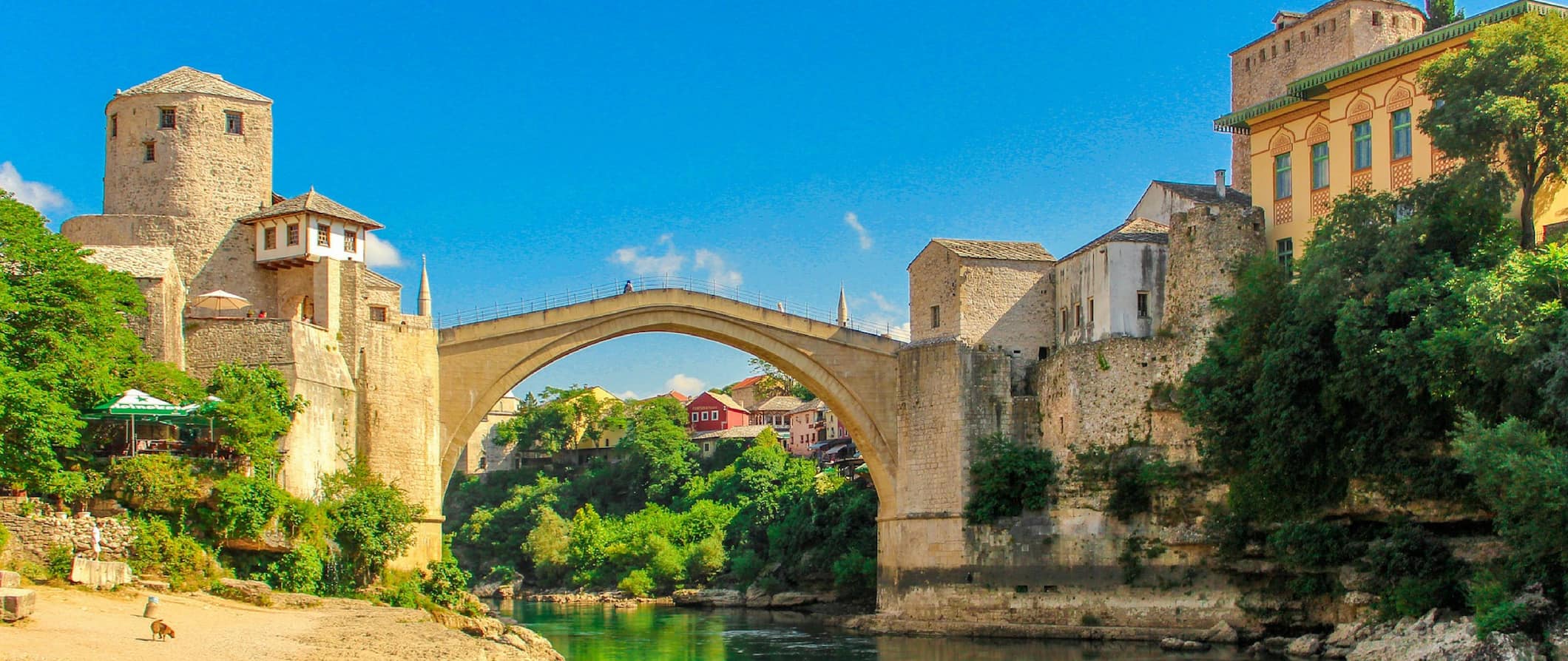
Often overlooked because the country’s name is still synonymous with the Yugoslavian War of the 1990s, Bosnia & Herzegovina deserves your attention. It’s one of the most underrated destinations in Europe .
Not a lot of people backpack or travel through the country but it is rich in history, culture, and natural beauty.
Three major religions (Islam, Roman Catholic, and Serbian Orthodox) all come together in this small area to form a vibrant blend of cultures. You’ll hear the Muslim call to prayer over the minarets one minute, and church bells ringing from a nearby church the next.
Watch skilled divers jump from the iconic bridge in Mostar, enjoy some hookah at one of Sarajevo’s sidewalk cafes, take a dip in the turquoise pools below the cascading Kravica Falls, or raft down the Tara Canyon, the deepest canyon in Europe.
The country (especially the capital) has become more popular in recent years thanks to increasing tourism in the region and cheaper prices but you can still catch it before the big crowds come!
This travel guide to Bosnia & Herzegovina will help you plan your trip, save money, and make the most of your time in this off-the-beaten-path destination!
Table of Contents
- Things to See and Do
- Typical Costs
- Suggested Budget
- Money-Saving Tips
- Where to Stay
- How to Get Around
- How to Stay Safe
- Best Places to Book Your Trip
- Related Blogs on Bosnia & Herzegovina
Top 5 Things to See and Do in Bosnia & Herzegovina
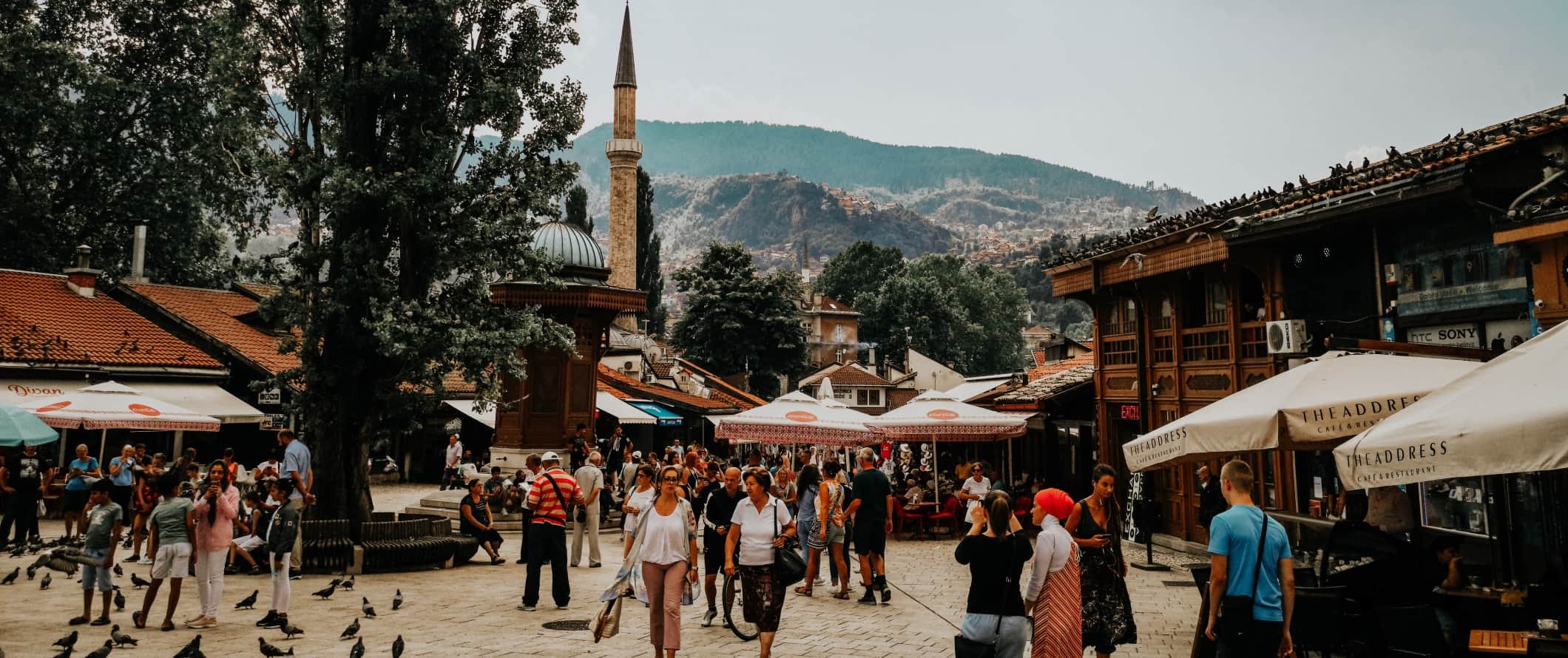
1. See Sarajevo
Bosnia’s capital has a distinct “east meets west” vibe. Perched alongside the Miljacka River and surrounded by mountains, the city is both scenic and historic. It is well-known for its cultural diversity and is sometimes referred to as the Jerusalem of Europe; within the city you can sometimes find a mosque, a catholic church, and a synagogue all within a few blocks. Wander the colorful Bascarsija Square for excellent people-watching, and while you’re there visit the iconic Sebilj Fountain. This Ottoman-style wooden fountain was originally built in 1753 and relocated in 1891. Local legend claims that if you drink from the fountain, you will always return to Sarajevo. Enjoy some hookah, take the cable car to the top of Mount Trebevic for incredible views, and visit the Bašcaršija historic market for some snacks and more people-watching.
2. Check out Mostar
Mostar is a medieval city best known for its 16th-century bridge, which is a UNESCO World Heritage Site, straddling the Neretva river. The bridge is constructed in the Ottoman style, and on warm days you will often spot locals jumping off into the river. Mostar’s name comes from the word mostari , which translates to bridge keeper (the original bridge was crucial to an important trade route). Strolling through Mostar is like traveling back in time, with its picturesque cobblestone streets and incredible architecture. Explore this historic town and see the ancient Ottoman homes and panoramic views from the local mosque. It’s one of the best cities in the country.
3. Visit the Pliva Lakes
The Pliva Lakes are two emerald lakes surrounded by wooded mountains, just outside Jajce. The area is home to the famous Pliva watermills, unique wooden watermills that were traditionally used to grind wheat. With rivers, waterfalls, and easy bike paths, outdoor lovers flock here to swim, paddle, bike, and explore. Surrounded by amenities like picnic tables, fire pits, kayak rentals, cafes, and playgrounds, the lakes are an ideal place to enjoy a day surrounded by nature. The lakes are formed from the widening Pliva River, which joins the Vrbas River and empties over the 22-meter (72-foot) Pliva Waterfall. For something unique, plan your visit to the annual waterfall jumping competition held here each August.
4. Marvel at the Kravica Waterfall
These marvelous cascades drop 25 meters (82 feet) into a bright emerald pool. During the springtime, the forests surrounding the pool and waterfall blossom into lush greenery, giving the area an oasis-like appearance. You can spend the day splashing in the swimming hole and swinging from the rope swing. Afterward, there’s a little café next to the water where you can grab a snack or a cold beer. Admission is 20 BAM, and swimming is allowed. To see the falls as part of a day trip from Mostar or Dubrovnik costs around 70 BAM.
5. Explore Trebinje
Other things to see and do in bosnia & herzegovina, 1. ostrožac fortress.
This Gothic castle in the Una Valley is one of Bosnia’s most photogenic landmarks thanks to its brick torrents and stone wall running along the valley’s edge. Ostrožac has plenty to explore within its grounds, including a sculpture garden, ramparts, towers, and a manor house dating back to 1286. You can only visit the castle during the summer. Admission is 4 BAM.
2. Walk the Tunnel of Hope
Surrounded by Bosnian-Serb forces, Sarajevo had just one link with the outside world from 1992–1995: an 800-meter long (2,624-feet), 1-meter (3-feet) wide, 1.6-meter (5-feet) high tunnel connecting two houses on opposite sides of the airport runway. Eventually, the tunnel was equipped with rails to transport food and supplies. You can walk through part of the tunnel from the house at the western entrance while learning about the story of the siege through informational displays and videos. It’s an incredibly moving experience. The tunnel is open 9am-5pm daily and admission is 10 BAM.
3. Visit the National Museum of Bosnia & Herzegovina
The National Museum of Bosnia & Herzegovina in Sarajevo houses the Sarajevo Haggadah (a Jewish text) illuminated manuscript, which contains the illustrated text of the Passover Haggadah that goes with the Passover Seder. It’s one of the oldest Haggadah in the world, dating from 1350 and originating in Barcelona. In addition to Greek pottery and Roman mosaics, this museum is also home to a collection of stecci (medieval tombstones found scattered around the country). They started appearing in the 12th century for various Christian churches like the Bosnian Church, and most of them are inscribed with the extinct Bosnian Cyrillic alphabet. The entrance to the museum is 8 BAM.
4. See the Mehmed Pasha Sokolovic Bridge
Mehmed Pasha Sokolovic Bridge was built in Višegrad in 1571 and was designed by Mimar Sinan, the famous chief architect for the Ottoman Empire. He was the master builder behind both the Sehzade Mosque and the Süleymaniye Mosque in Istanbul, and this 11-arch bridge is the only confirmed work he completed in Bosnia & Herzegovina. It stretches 179 meters (587 feet) across the Drina River, and although it’s now closed to traffic, you can still appreciate its perfectly symmetrical beauty from the land.
5. See the watermills of Jajce
Jajce is known as the “city of falling water” thanks to its giant waterfall that connects the rivers Pliva and Vrbas. During the days of the Austro-Hungarian Empire (1867-1918), the small wooden huts stood on stilts over the gushing water used to ground local farmers’ wheat into flour. You can’t go inside, but you can see the huts up close as you explore.
6. Take a tour of Tito’s Bunker
On the bank of the river Neretva, just outside of Konjic and hidden behind a seemingly normal house, the once-forgotten bunker was built under the command of the Yugoslav revolutionary Josip Tito. It was kept secret for many years — even the construction workers were blindfolded until they arrived on site. The bunker cost billions of dollars to build and is now home to a contemporary art biennial called D-0 ARK Underground. You can only visit as a part of a guided tour with Visit Konjic, which costs 22 BAM.
7. See the Bosnian Pyramids
Located near Visoko, the Bosnian Pyramids are a set of four pyramids dating back 12,000 years ago that have perfect cardinal alignment, some reaching heights of 220 meters (721 feet). While most of the scientific community has debunked the theory that an ancient civilization built these structures, it’s a pretty amazing coincidence that they’re so aligned with the north. There are no official tours, so you’re free to explore on your own.
8. Visit Galerija 11/07/95
One of the most tragic events of the Yugoslavian War was the Srebrenica massacre, the largest genocide since World War II carried out by Bosnian Serb forces. With 8,372 victims, the gallery stands as a memorial to those that lost their life while also sharing survivor stories. It’s a powerful exhibition made up of photography, video footage, and audio testimonies. Admission is 12 BAM. An audio guide costs 3 BAM and a tour is 4 BAM.
9. Go whitewater rafting
Whitewater rafting on the Tara River Canyon, the deepest canyon in Europe, is one of the most exciting things to do in the country as you tackle rapids and fast-flowing water. Other than navigating 25 kilometers (15 miles) of white water, your guide will take you to waterfalls, springs, and swimming holes. I recommend Rafting Center Drina Tara. Their full-day tour costs 140 BAM and ends with a delicious traditional dinner of homemade goat pies, soup, grilled lamb, and drinks.
Bosnia & Herzegovina Travel Costs
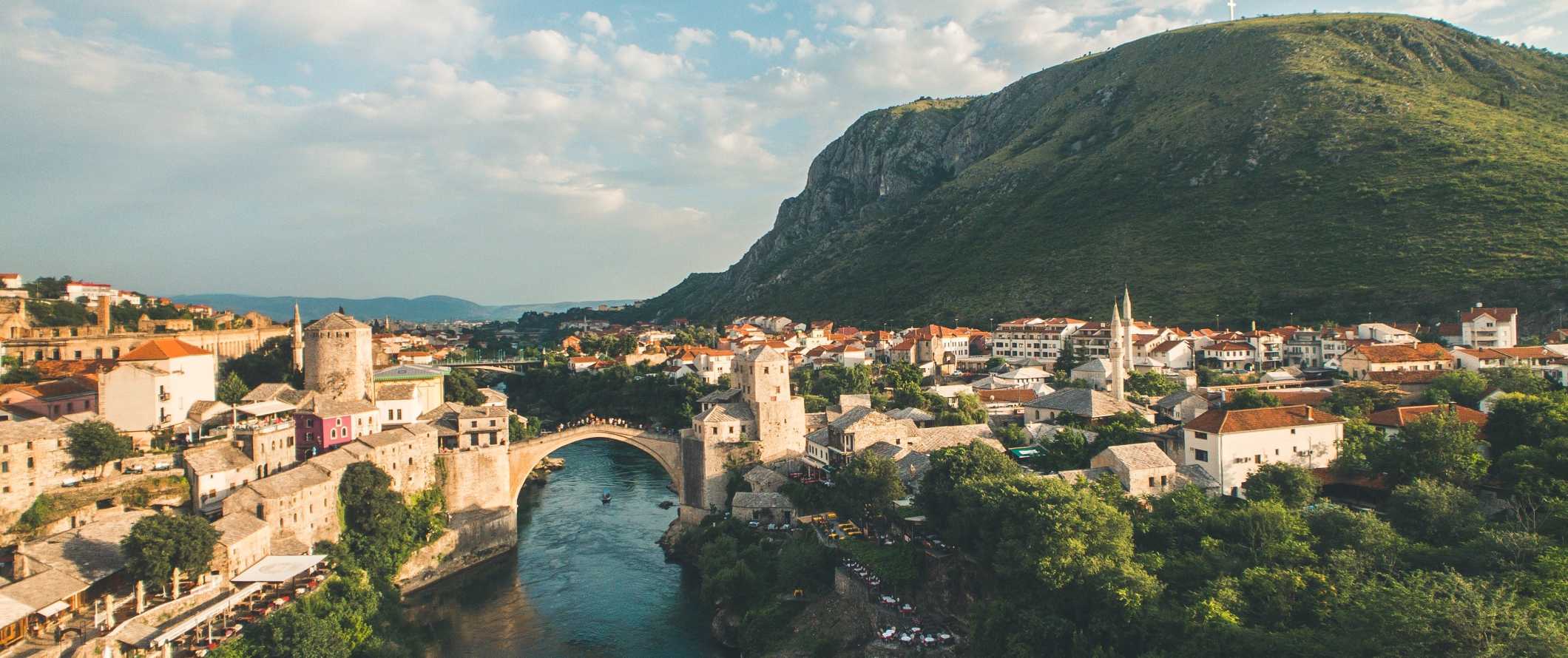
Accommodation – Hostel dorms start at around 19 BAM per night for an 8-10-bed dorm while a bed in a 4-6 person dorm costs closer to 28 BAM. For a private room, expect to pay at least 45-63 BAM per night for a twin.
Budget hotels in bigger cities (like Mostar and Sarajevo) cost around 63 BAM per night for a double or twin. In the more rural areas, you’ll find rooms for as low as 35 BAM.
Airbnb is another affordable option, with private rooms starting around 30 BAM per night while a full home or apartment costs at least 40 BAM (though prices average double that or more).
For anyone traveling with a tent, wild camping on public land is legal in Bosnia & Herzegovina. Additionally, there are campsites available throughout the country. Tent plots cost about 10.50 BAM per person.
Food – Traditional food in Bosnia & Herzegovina is very cheap and filling (and meat-heavy). Beef and lamb are popular staples, and influences from the Middle East and the Mediterranean are common. Sarma (meat and rice in pickled cabbage leaves), cevapi (a pita filled with cream and sausage), and burek (a flaky pastry with meat, cheese, and spinach) are some of the popular traditional choices. Common ingredients include potatoes, tomatoes, onions, garlic, cabbage, and plums.
You can get plates of cevapi or burek for about 7 BAM. A meal at a mid-range restaurant costs about 15 BAM and you can expect to pay about 3 BAM for a beer. Dinner at a fancy restaurant (including Western restaurants) costs about 35 BAM for an appetizer, main, and dessert.
For comparison, fast food like McDonald’s is about 9 BAM for a combo meal.
If you are planning to cook your own food, a week’s worth of groceries costs around 45-65 BAM. This gets you basic staples like rice, seasonal produce, and some meat.
Backpacking Bosnia & Herzegovina Suggested Budgets
If you are backpacking in Bosnia & Herzegovina, my suggested budget is 85 BAM per day. This assumes you’re staying in a hostel dorm, cooking your meals, sticking to mostly free activities (like free walking tours and hiking), and using public transportation to get around.
A mid-range budget of about 160 BAM covers staying in an Airbnb, eating out for all your meals at cheap local places, enjoying a few drinks, taking the occasional taxi, and doing more paid activities like museum visits or rafting.
On a “luxury” budget of 275 BAM per day or more, you will stay in a hotel, eat out for all your meals, enjoy lots of drinks, take more taxis or rent a car, and do all the tours you desire. This is just the ground floor for luxury though. The sky is the limit!
You can use the chart below to get some idea of how much you need to budget daily, depending on your travel style. Keep in mind these are daily averages — some days you’ll spend more, some days you’ll spend less (you might spend less every day). We just want to give you a general idea of how to make your budget. Prices are in BAM.
Bosnia & Herzegovina Travel Guide: Money-Saving Tips
Bosnia & Herzegovina, like most of the region, is very budget-friendly. You’ll be able to eat, drink, and stay in comfortable accommodations without breaking the bank too much. However, I always love saving money when I can so here are some tips to help you save money when you visit:
- Do a free walking tour – Both Sarajevo and Mostar have free walking tours available. They’re a great way to get familiar with the city and the culture. Just be sure to tip your guide at the end!
- Wild camp – If you really want to save money in Bosnia & Herzegovina, bring your tent. You can pitch your tent on public land throughout Bosnia & Herzegovina.
- Cook your own meals – Many hostels here include kitchen facilities, so if you want to save money, cook your own meals. It’s not glamorous but it’s cheap!
- Stay with a local – Staying with a local via Couchsurfing is a great way to not only save money but to meet a knowledgeable local. Just make sure to send your requests early as there are not a ton of hosts here.
- Walk everywhere – All of the major cities in Bosnia & Herzegovina are walkable, so skip the public transportation if you want to save a few extra dollars.
- Enjoy the free spaces – There are plenty of free parks as well as many free hiking trails around the country. Save your budget and enjoy the outdoors!
- Drink the tap water – Tap water within the cities is safe to drink, but not in the rural areas. Pick up a LifeStraw (a water bottle with a purifier) so you can cut down on your use of plastic bottles while saving money in the process.
Where to Stay in Bosnia & Herzegovina
Like many other countries in this part of Europe, Bosnia & Herzegovina only has hostel accommodation in the cities. In the smaller less popular areas, you will find B&B style accommodation or campsites. Here are some of my favorite places to stay in Bosnia & Herzegovina:
- Hostel Kucha (Sarajevo)
- Balkan Han Hostel (Sarajevo)
- Hostel Franz Ferdinand (Sarajevo)
- Villa Cardak (Mostar)
- Rooms Goa Mostar (Mostar)
- The Red Door Hostel Trebinje (Trebinje)
How to Get Around Bosnia & Herzegovina
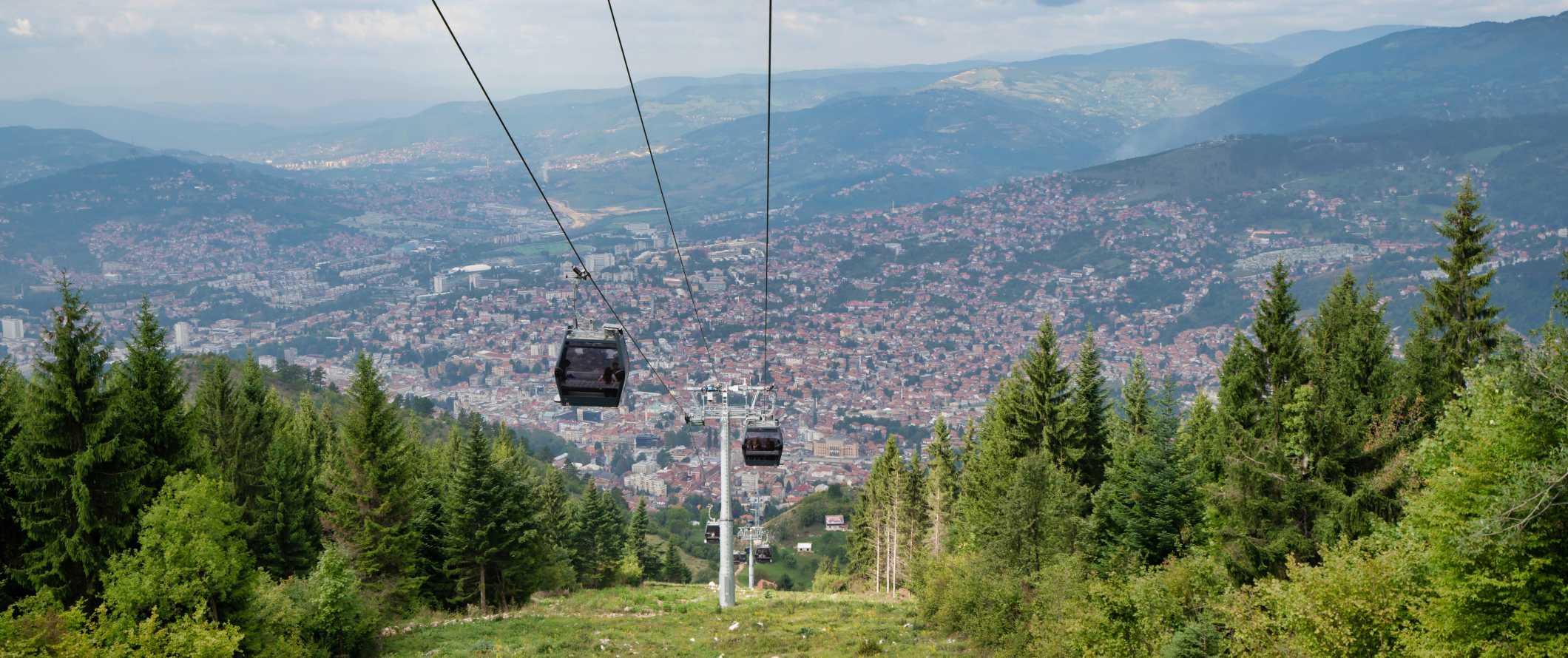
Public transportation – Most towns in Bosnia & Herzegovina are walkable. While public transportation prices vary by city, you can expect to pay around 2 BAM for a one-way ticket on buses, trams, or trolleybuses.
Taxi – If you need to take a taxi, prices start at about 3 BAM and cost about 1.60 BAM for every additional kilometer. While affordable, they do add up so skip them if you can.
Bus – There is an extensive network of long-distance intercity and international buses. Between towns, it’s normally easy enough to wave down any bus. Reservations are sometimes necessary for overnight routes or at peak holiday times but not during the day. The biggest companies include:
- Centrotrans
A bus from Sarajevo to Mostar takes 2.5 hours and costs around 11 BAM, while Sarajevo to Trebinje takes nearly 10 hours and is about 40 BAM. Mostar to Jajce is a 4.5-hour journey and costs about 27 BAM. Try to book a day in advance when possible as seats do fill up quickly in the summer season.
It is worth noting that if you buy a round trip with the same company, you can save yourself up to 60% compared to buying two single tickets. Also, if you need to put luggage in the hold, companies will often charge you an additional 2-4 BAM. (It’s common in this region to charge for the luggage hold.)
Train – Trains do operate in Bosnia & Herzegovina, however, they are outdated and extremely slow. I do not recommend using them. Take the bus instead.
Flying – No budget airlines offer domestic flights within Bosnia & Herzegovina.
Car rental – Car rentals can be found for around 40 BAM per day for a multi-day rental. Renters must be at least 21 years old and have an International Driving Permit (IDP). For the best car rental prices, use Discover Cars .
When to Go to Bosnia & Herzegovina
In general, May through to October is the best time to visit Bosnia & Herzegovina as these are the warmest months. The temperature hovers around 31°C (87°F) and rarely drops below 17°C (62°F).
Even in the summer months, Bosnia & Herzegovina doesn’t get a ton of tourism traffic. A lot of people will take a day trip to Mostar from Croatia, but you don’t have to worry too much about overcrowding in the rest of the country.
Unlike other Mediterranean countries, Bosnia & Herzegovina doesn’t have a whole lot of coastal areas to enjoy. If you’re here mostly for hiking or sightseeing, the cooler spring/fall temperatures might suit you better.
Winters here can be harsh and they often last from November to March. Temperatures often drop below freezing, and snowfall is common. I’d skip a winter visit.
How to Stay Safe in Bosnia & Herzegovina
In Bosnia & Herzegovina, violent crime against tourists is rare. However, scams and pick-pocketing are common, usually on public transport and in the cities and especially around high-traffic areas in Sarajevo. Always keep an eye on your stuff and only take the cash you need for the day. You can read about common travel scams to avoid here.
If you want to go hiking, it’s essential you stick to marked trails only. Landmines can still be found here from the war so always stick to the trail.
Solo female travelers should generally feel safe here, however, the standard precautions apply (never leave your drink unattended at the bar, never walk home alone intoxicated, etc.).
If you experience an emergency, dial 122 for assistance.
The most important piece of advice I can offer is to purchase good travel insurance. Travel insurance will protect you against illness, injury, theft, and cancellations. It’s comprehensive protection in case anything goes wrong. I never go on a trip without it as I’ve had to use it many times in the past. You can use the widget below to find the policy right for you:
Bosnia & Herzegovina Travel Guide: The Best Booking Resources
These are my favorite companies to use when I travel. They consistently have the best deals, offer world-class customer service and great value, and overall, are better than their competitors. They are the companies I use the most and are always the starting point in my search for travel deals.
- Skyscanner – Skyscanner is my favorite flight search engine. They search small websites and budget airlines that larger search sites tend to miss. They are hands down the number one place to start.
- Hostelworld – This is the best hostel accommodation site out there with the largest inventory, best search interface, and widest availability.
- Booking.com – The best all around booking site that constantly provides the cheapest and lowest rates. They have the widest selection of budget accommodation. In all my tests, they’ve always had the cheapest rates out of all the booking websites.
- HostelPass – This new card gives you up to 20% off hostels throughout Europe. It’s a great way to save money. They’re constantly adding new hostels too. I’ve always wanted something like this and glad it finallt exists.
- Get Your Guide – Get Your Guide is a huge online marketplace for tours and excursions. They have tons of tour options available in cities all around the world, including everything from cooking classes, walking tours, street art lessons, and more!
- The Man in Seat 61 – This website is the ultimate guide to train travel anywhere in the world. They have the most comprehensive information on routes, times, prices, and train conditions. If you are planning a long train journey or some epic train trip, consult this site.
- Rome2Rio – This website allows you to see how to get from point A to point B the best and cheapest way possible. It will give you all the bus, train, plane, or boat routes that can get you there as well as how much they cost.
- FlixBus – Flixbus has routes between 20 European countries with prices starting as low 5 EUR! Their buses include WiFi, electrical outlets, a free checked bag.
- SafetyWing – Safety Wing offers convenient and affordable plans tailored to digital nomads and long-term travelers. They have cheap monthly plans, great customer service, and an easy-to-use claims process that makes it perfect for those on the road.
- LifeStraw – My go-to company for reusable water bottles with built-in filters so you can ensure your drinking water is always clean and safe.
- Unbound Merino – They make lightweight, durable, easy-to-clean travel clothing.
- Top Travel Credit Cards – Points are the best way to cut down travel expenses. Here’s my favorite point earning credit cards so you can get free travel!
Bosnia & Herzegovina Travel Guide: Related Articles
Want more info? Check out all the articles I’ve written on backpacking/traveling Europe and continue planning your trip:
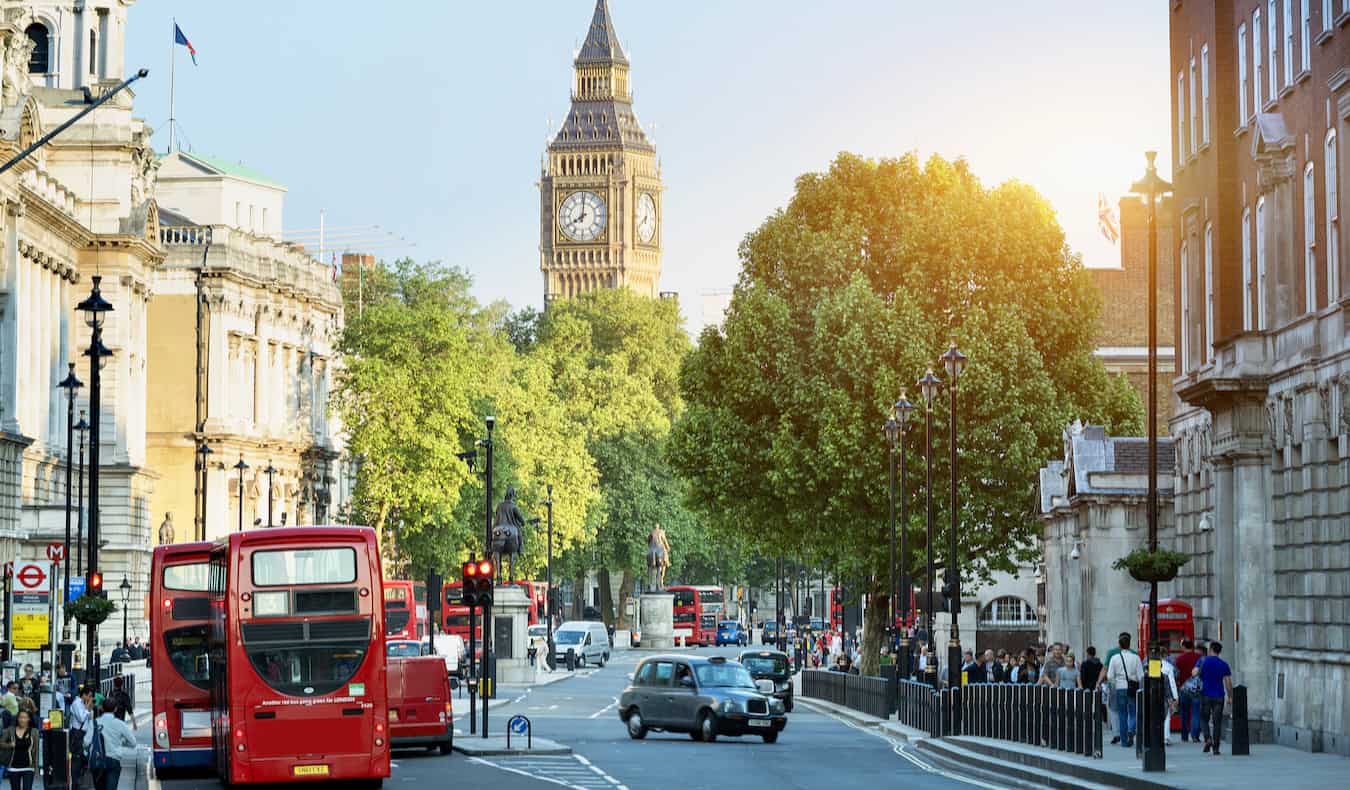
The 7 Best Hotels in London
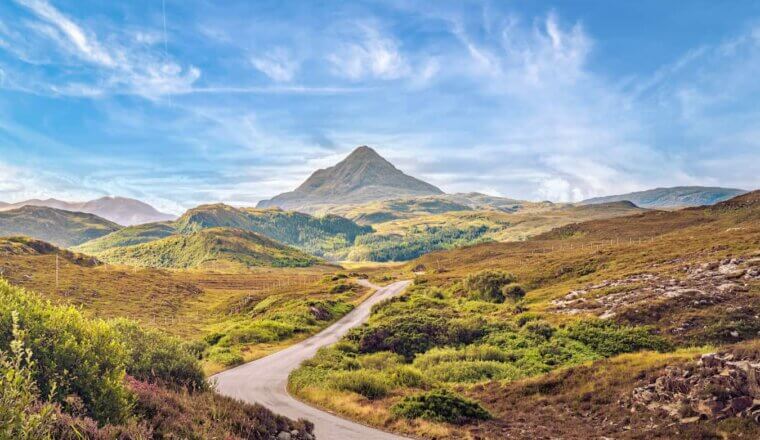
10 Scotland Road Trip Tips You Need to Know Before You Go
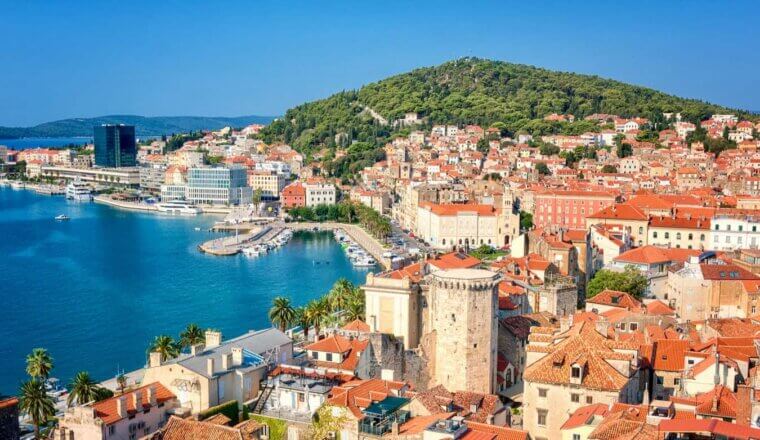
The Perfect 7-Day Croatia Itinerary
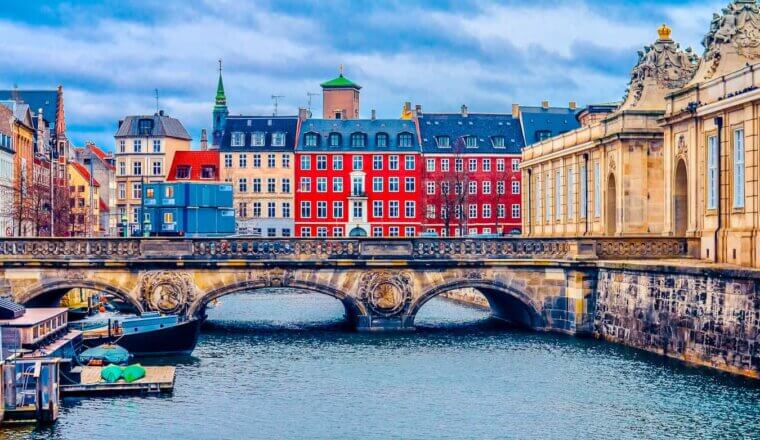
The 6 Best Hotels in Copenhagen
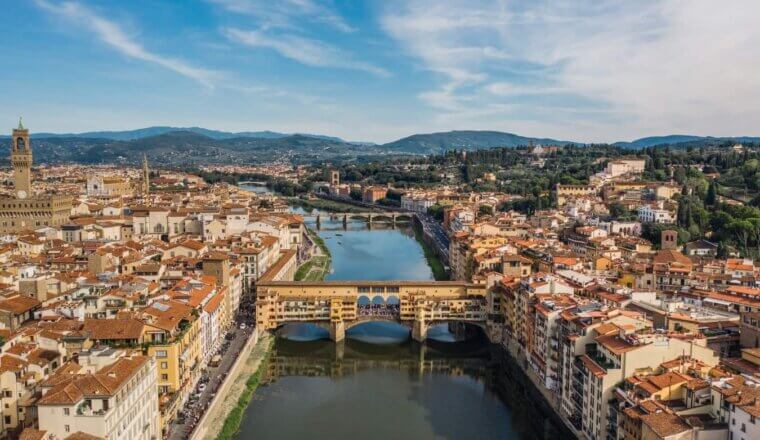
The 6 Best Hotels in Florence
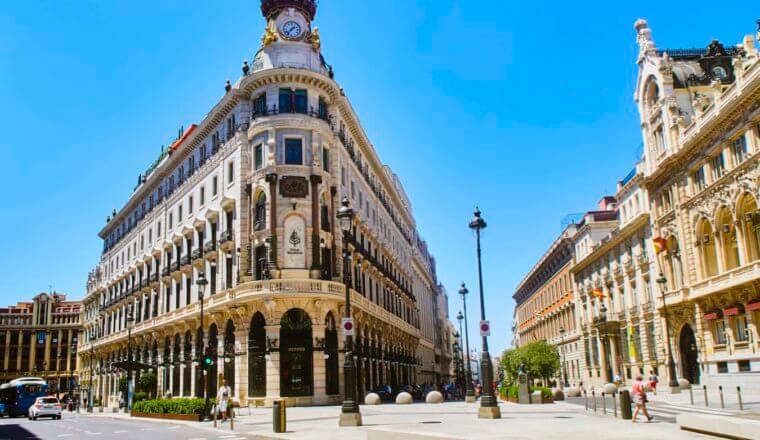
The 7 Best Hotels in Madrid
Get your free travel starter kit.
Enter your email and get planning cheatsheets including a step by step checklist, packing list, tips cheat sheet, and more so you can plan like a pro!

- Where To Stay
- Transportation
- Booking Resources
- Related Blogs

Search Smartraveller

Bosnia and Herzegovina
Latest update
Exercise a high degree of caution in Bosnia and Herzegovina due to the risk of landmines.
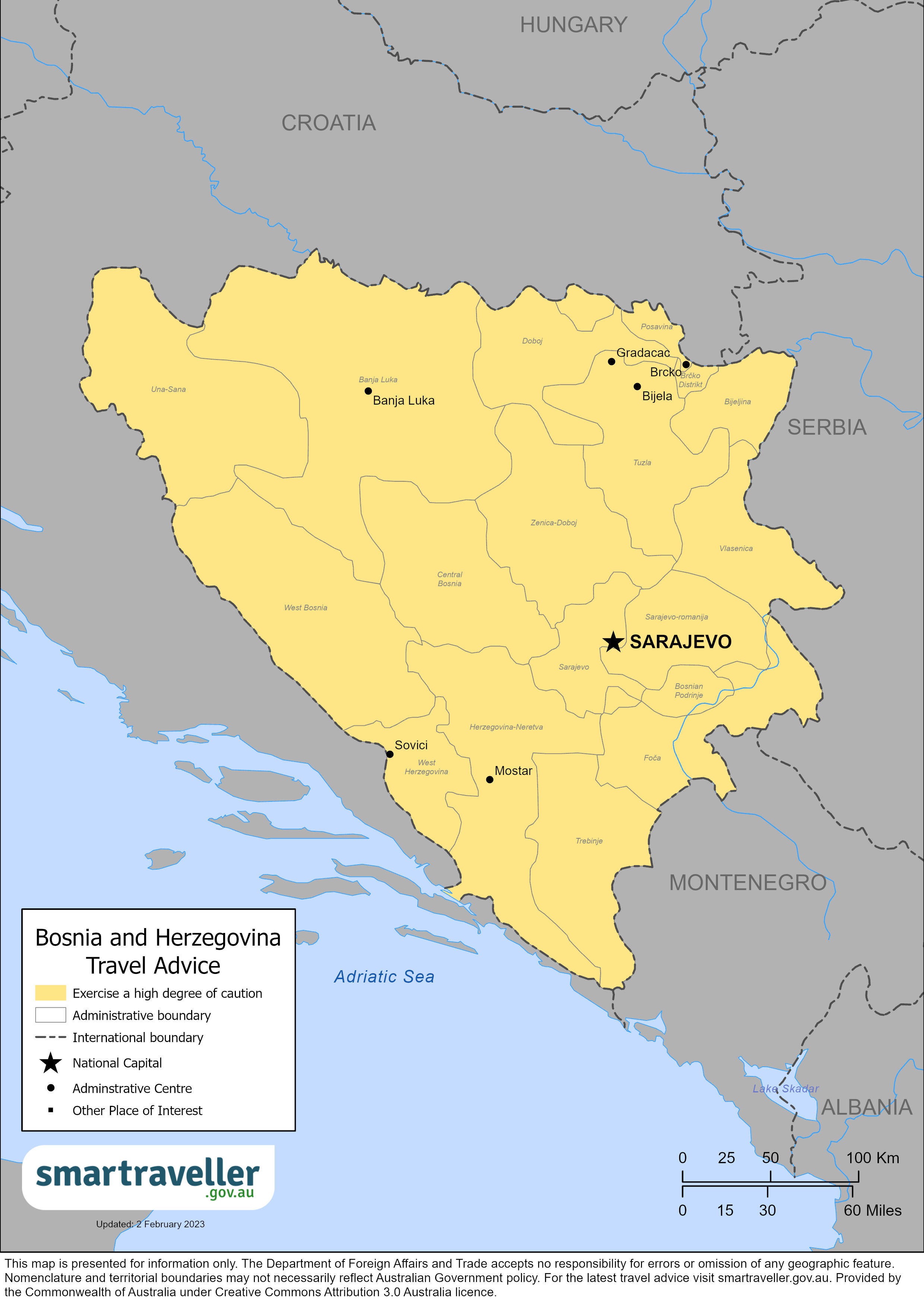
Bosnia and Herzegovina (PDF 238.42 KB)
Europe (PDF 2.62 MB)
Local emergency contacts
Fire and rescue services, medical emergencies, advice levels.
- Unexploded landmines remain a danger. Stay on main roads and avoid isolated mountain areas. Travel in daylight.
- Ethnic and religious tensions may result in demonstrations. Stay away from protests as they could turn violent.
- Many locals have firearms. You might be caught in the wrong place. Monitor the media for updates on areas with gun violence.
- Earthquakes, flooding and landslides occur. Watch out for bush and forest fires in summer. Stick to marked slopes and trails when skiing. Follow the advice of local authorities.
Full travel advice: Safety
- Take care in forests and rural areas where ticks carry encephalitis. Ticks are active from spring to autumn. Check your body for ticks and remove them as soon as possible.
- West Nile virus (WNV) can occur. There's no vaccine to prevent WNV. Use insect repellent. Make sure your accommodation is insect-proof.
- Hepatitis, trichinellosis, brucellosis and rabies are common. Avoid raw or undercooked food.
- Medical facilities in Bosnia and Herzegovina aren't up to Australian standards. Check your insurance covers medical evacuation.
Full travel advice: Health
- Always carry your ID.
- It's illegal to take photos of military and police personnel, buildings, vehicles or equipment.
- Bosnia and Herzegovina recognises dual nationality only in certain circumstances. This limits the consular help we can give. Always travel on your Australian passport.
- Same-sex relationships are legal but aren't widely accepted. Avoid public displays of affection.
Full travel advice: Local laws
You don't need a visa for stays of up to 90 days.
- Entry and exit conditions can change at short notice. You should contact the nearest embassy or consulate of Bosnia and Herzegovina for the latest details.
Full travel advice: Travel
Local contacts
- The Consular Services Charter details what the Australian Government can and can't do to help you overseas.
- The Australian Consulate in Sarajevo can provide limited consular help.
- For full consular assistance, contact the Australian Consul in Sarajevo or the Australian Embassy in Vienna .
- To stay up to date with local information, follow the embassy's social media accounts.
Full travel advice: Local contacts
Full advice
While there have been no recent terrorist attacks in Bosnia and Herzegovina, they can still happen.
Terrorists have staged attacks in European cities in recent years. Targets include:
- public transport, including train stations
- government buildings, including schools
- places of worship
- public areas that attract large groups of people, such as tourist attractions, music and cultural events, festivals, Pride events, sporting venues and shopping centres
To protect yourself from terrorism:
- always be aware of your surroundings
- take care near places known to be possible terrorist targets
- report suspicious behaviour to police
- alert police to unattended bags
- monitor the media for updates
- take official warnings seriously
- follow the advice of local authorities
If there's an attack, leave the affected area as soon as it's safe. Avoid the affected area in case of secondary attacks.
Terrorism is a threat worldwide.
More information :
The crime rate in Bosnia and Herzegovina is moderate. Home and vehicle break-ins are common, particularly in Sarajevo. Pickpocketing and bag snatching is common. Take extra care in crowded tourist areas and on public transport.
Firearms are widely available. Travellers may not be targets, but you risk being in the wrong place at the wrong time, especially late at night.
To protect yourself from crime:
- keep your accommodation and car doors locked at all times
- don't go out alone after dark or to isolated places
- pay close attention to personal belongings, especially on public transport and in crowds
- use ATMs inside banks, shops and shopping centres and avoid ATMs on the street
- monitor the media for updates on areas with gun violence
- avoid known trouble areas
- avoid obvious displays of wealth and carrying large sums of cash
Cyber security
You may be at risk of cyber-based threats during overseas travel to any country. Digital identity theft is a growing concern. Your devices and personal data can be compromised, especially if you’re connecting to Wi-Fi, using or connecting to shared or public computers, or to Bluetooth.
Social media can also be risky in destinations where there are social or political tensions, or laws that may seem unreasonable by Australian standards. Travellers have been arrested for things they have said on social media. Don't comment on local or political events on your social media.
More information:
- Cyber security when travelling overseas
Unexploded weapons
Unexploded and unmarked landmines remain dangerous, particularly in the countryside and isolated mountainous areas.
To protect yourself:
- stay on main roads and paved surfaces
- avoid abandoned houses and buildings
- travel only during daylight hours
- do not touch war relics and unknown items - report these to local authorities.
- use an experienced guide if travelling off-road in rural areas
More information:
- Bosnia and Herzegovina Mine Action Centre .
Civil unrest and political tension
Demonstrations and protests.
Public protests and events that draw large groups of people can turn violent.
Ethnic and religious tensions may result in demonstrations or conflict.
Events can happen with little or no warning and may target foreigners.
To stay safe during periods of unrest:
- avoid areas where protests may occur
- Demonstrations and civil unrest
Climate and natural disasters
Bosnia and Herzegovina experiences natural disasters and severe weather , including:
- earthquakes
- bush and forest fires
Fires can happen during summer but are usually limited to uninhabited areas.
To protect yourself if there's a natural disaster:
- secure your passport in a safe, waterproof location
- keep in contact with your friends and family
- monitor local media and other sources
If you can, access the Global Disaster Alert and Coordination System .
Travel insurance
Get comprehensive travel insurance before you leave.
Your policy needs to cover all overseas medical costs, including medical evacuation. The Australian Government won't pay for these costs.
If you can't afford travel insurance, you can't afford to travel. This applies to everyone, no matter how healthy and fit you are.
If you're not insured, you may have to pay many thousands of dollars up-front for medical care.
- what activities and care your policy covers
- that your insurance covers you for the whole time you'll be away (including if stopovers on the way to your destination are covered)
Physical and mental health
Consider your physical and mental health before you travel, especially if you have an existing medical condition.
See your doctor or travel clinic to:
- have a basic health check-up
- ask if your travel plans may affect your health
- plan any vaccinations you need
Do this at least 8 weeks before you leave.
If you have immediate concerns for your welfare or the welfare of another Australian, call the 24-hour Consular Emergency Centre on +61 2 6261 3305 or contact your nearest Australian Embassy, High Commission or Consulate to discuss counselling hotlines and services available in your location.
- General health advice
- Healthy holiday tips (Healthdirect Australia)
Medications
Not all medication available over the counter or by prescription in Australia is available in other countries. Some may even be considered illegal or a controlled substance, even if prescribed by an Australian doctor.
If you plan to bring medication, check if it's legal in Bosnia and Herzegovina. Take enough legal medication for your trip.
Carry a copy of your prescription or a letter from your doctor stating:
- what the medication is
- your required dosage
- that it's for personal use
- Embassy or consulate of Bosnia and Herzegovina
Health risks
Insect-borne diseases.
Tick-borne encephalitis is a risk in forested and rural areas.
They're active from spring to autumn.
To reduce your risk of tick-borne disease:
- check your body for ticks during and after visiting forests
- remove ticks as soon as possible, making sure to remove the whole tick
- monitor the tick site for signs of infection
West Nile virus (WNV) cases have been reported in Bosnia and Herzegovina. There's no vaccine to prevent it.
To protect yourself from illness:
- make sure your accommodation is insect-proof
- use insect repellent
- wear long, loose, light-coloured clothing
- Infectious diseases
Measles cases can routinely occur. Bosnia and Herzegovina has experienced significant outbreaks in the past. Make sure your vaccinations are up-to-date before you travel.
- Measles immunisation service (Department of Health)
Other health risks
Outbreaks of foodborne and other infectious diseases sometimes occur. These include:
- trichinellosis
- brucellosis
- COVID−19
To reduce your risk of illness:
- drink boiled or bottled water with sealed lids
- avoid ice cubes
- avoid uncooked and undercooked food, such as salads
- don't consume unpasteurised dairy products
- avoid contact with dogs and other mammals
If you're bitten or scratched by an animal, seek medical help straight away.
Get medical advice if you develop symptoms.
- European Centre for Disease Prevention and Control
- World Health Organization
Medical care
Medical facilities.
Medical facilities in Bosnia and Herzegovina aren't up to Australian standards, especially outside of major cities.
If you're seriously ill or injured, you'll need to be evacuated to a place with better facilities. Medical evacuation can be very expensive.
You're subject to all local laws and penalties, including those that appear harsh by Australian standards. Research local laws before travelling.
If you're arrested or jailed, the Australian Government will do what it can to help you under our Consular Services Charter . But we can't get you out of trouble or out of jail.
• Arrested or jailed
Don't use or carry illegal drugs. Penalties for drug offences are severe. Possessing even small amounts of illegal drugs can lead to prison sentences. This includes marijuana.
- Carrying or using drugs
You must carry your ID at all times.
It's illegal to photograph military and police:
Australian laws
Some Australian criminal laws still apply when you're overseas. If you break these laws, you may face prosecution in Australia.
- Staying within the law and respecting customs
Dual citizenship
Bosnia and Herzegovina recognises dual nationality only in certain circumstances.
If you're a dual citizen, this limits the consular services we can give if you're arrested or detained.
Always travel on your Australian passport .
Contact the nearest embassy or consulate of Bosnia and Herzegovina for advice on:
- your citizenship status
- local laws regarding access to consular help
- Dual nationals
Local customs
Same-sex relationships are legal but aren't widely tolerated. Avoid public displays of affection with someone of the same sex.
- Advice for LGBTI travellers
Visas and border measures
Every country or territory decides who can enter or leave through its borders. For specific information about the evidence you'll need to enter a foreign destination, check with the nearest embassy, consulate or immigration department of the destination you're entering.
Make sure you meet all entry and exit conditions. If you don't, the Australian Government can't help you.
Visa-free travel for short stays
You'll need a temporary residence permit if you plan to stay longer than 90 days.
Entry and exit conditions can change at short notice. Contact the nearest embassy or consulate of Bosnia and Herzegovina for details about visas, currency, customs and other travel requirements.
Other formalities
Ensure your passport is stamped when you enter the country. If it isn't stamped, you could face difficulties leaving.
For a stay of 3 days or more, you must register with the local police within 48 hours of arrival. Hotels can organise this for you and will confirm when you check in.
Children aged younger than 18 years old travelling alone or with one parent may need to produce the following:
- a letter of consent from the non-travelling parent or parents
- a copy of their birth certificate
Check with an embassy or consulate of Bosnia and Herzegovina before you travel.
More information (not all links are available in English):
- Border Police of Bosnia and Herzegovina
- Ministry of Foreign Affairs
- Ministry of Civil Affairs
Some countries won't let you enter unless your passport is valid for 6 months after you plan to leave that country. This can apply even if you're just transiting or stopping over.
Some foreign governments and airlines apply the rule inconsistently. Travellers can receive conflicting advice from different sources.
You can end up stranded if your passport is not valid for more than 6 months.
The Australian Government does not set these rules. Check your passport's expiry date before you travel. If you're not sure it'll be valid for long enough, consider getting a new passport .
Lost or stolen passport
Your passport is a valuable document. It's attractive to people who may try to use your identity to commit crimes.
Some people may try to trick you into giving them your passport. Always keep it in a safe place.
If your passport is lost or stolen, tell the Australian Government as soon as possible:
- In Australia, contact the Australian Passport Information Service .
- If you're overseas, contact the nearest Australian embassy or consulate .
Passport with 'X' gender identifier
Although Australian passports comply with international standards for sex and gender, we can't guarantee that a passport showing 'X' in the sex field will be accepted for entry or transit by another country. Contact the nearest embassy, high commission or consulate of your destination before you arrive at the border to confirm if authorities will accept passports with 'X' gender markers.
- LGBTI travellers
The currency of Bosnia and Herzegovina is the Bosnian Mark (KM or BAM).
You'll find ATMs in major centres.
While credit and debit card use is increasing, you'll still need cash outside Sarajevo.
Some banks will cash traveller's cheques for KM, but many won't accept them.
Local travel
Border delays
In recent years, asylum-seeker movements have put significant pressure on border controls in Europe.
To avoid delays at local borders, you should:
- check local news and transport providers for current information
- allow extra time if you're travelling by road or train
- have back-up plans
- avoid large groups
Driving permit
To drive a vehicle, you'll need both:
- a current Australian driver's licence
- a valid international driving permit (IDP)
Driving without an IDP could void your travel and vehicle insurance.
The minimum age for driving is 18 years old.
Road travel
The road traffic death rate in Bosnia and Herzegovina is significantly higher than in Australia.
Driving can be dangerous due to:
- poor road lighting
- poorly maintained vehicles
- drivers ignoring road rules or driving under the influence of alcohol
Black ice, fog and landslides can make roads hazardous in winter and spring.
Avoid driving off-road in rural areas in case of landmines.
Driver's insurance
You need the correct insurance cover to enter Bosnia and Herzegovina in a vehicle. If you don't, border police will direct you to an insurer at the border crossing to buy insurance.
If travelling by car, research and prepare before entry.
Not all border crossings have an insurer's office, and credit card payments aren't always possible.
Local traffic laws
You must always have your headlights on (even during the day).
From 15 November to 15 April, you must use winter tyres or tyres with snow chains.
The blood alcohol limit is 0.03%. For drivers younger than 21 or with less than 3 years of driving experience, the limit is 0%.
Police can collect traffic fines on the spot.
Speed limits
Speed limits for driving are:
- 50km/h on urban roads
- between 80 and 100km/h on roads outside urban areas
- 130km/h along motorways
They're not always signposted on rural roads.
- Driving or riding
- Bosnia and Herzegovina auto club (Bosnian)
Motorcycles
Check with your travel insurer if your policy covers you for riding a motorbike, quad bike or similar vehicle.
Always wear a helmet.
Taxis are available in most towns and for inter-city travel.
Use only registered taxis with licence plates beginning with 'TA'.
Ensure the meter is running throughout your trip. Pay particular attention at the airport.
Public transport
Public transport is usually reliable but can be crowded, and standards vary. Be wary of pickpockets.
- Transport and getting around safely
DFAT doesn't provide information on the safety of individual commercial airlines or flight paths.
Check Bosnia and Herzegovina's air safety profile with the Aviation Safety Network.
Emergencies
Depending on what you need, contact your:
- family and friends
- travel agent
Roadside Assistance
Call 1282/1285/1288.
For non-emergency criminal issues, contact the local police.
Always get a police report when reporting a crime.
Your insurer should have a 24-hour emergency number.
Consular contacts
Read the Consular Services Charter for what the Australian Government can and can't do to help you overseas.
Australia has a consulate in Sarajevo headed by an Honorary Consul. The office provides some consular assistance but can't issue emergency passports or perform notarial acts.
Get in contact before you visit.
Australian Consulate, Sarajevo
Strossmayerova 1/1
71000 Sarajevo
Tel: +387 33 209 202
Fax: +387 33 214 634
Email: [email protected]
Australian Embassy, Vienna
The Icon, Gertrude-Fröhlich-Sandner-Str. 2
1100 Vienna, Austria
Phone: +43 1 506 740
Email: [email protected]
Website: austria.embassy.gov.au
X: @AusAmbVIE
Facebook: @AusEmbassyVie
Check the Embassy website for details about opening hours and any temporary closures.
24-hour Consular Emergency Centre
In a consular emergency, if you can't contact an embassy, call the 24-hour Consular Emergency Centre on:
- +61 2 6261 3305 from overseas
- 1300 555 135 in Australia

Travelling to Bosnia and Herzegovina?
Sign up to get the latest travel advice updates..
Be the first to know official government advice when travelling.
- Skip to main content
- Skip to "About this site"
Language selection
Search travel.gc.ca.
Help us to improve our website. Take our survey !
COVID-19: travel health notice for all travellers
Bosnia and Herzegovina travel advice
Latest updates: Health – editorial update
Last updated: June 5, 2024 08:27 ET
On this page
Safety and security, entry and exit requirements, laws and culture, natural disasters and climate, bosnia and herzegovina - exercise a high degree of caution.
Exercise a high degree of caution in Bosnia and Herzegovina due to crime and the risk of unmarked landmines and unexploded ordnance in rural and isolated mountainous areas.
Back to top
Unmarked landmines and unexploded ordnance continue to pose a risk, particularly in isolated mountainous areas and in the countryside.
- Stay on main roads and paved surfaces
- Avoid abandoned houses and buildings
- Travel only during daylight hours
- Do not touch war relics and unknown items. Report these to local authorities
Landmines - Bosnia and Herzegovina Mine Action Centre
Petty Crime
Petty crime, such as pickpocketing and purse snatching, occurs, particularly in large urban centres such as Sarajevo, Banja Luka, Tuzla and Mostar. Criminals often target foreigners in crowded tourist areas and on public transportation.
Home and vehicle break-ins are common, particularly in Sarajevo and on Trebevic mountain. Foreigners have been targeted by thieves in Trebević.
- Ensure that your belongings, including your passport and other travel documents, are secure at all times
- Avoid showing signs of affluence, such as jewellery, and carrying large sums of cash
- Avoid isolated and poorly lit areas after dark
Violent Crime
Organized crime is prevalent in Bosnia and Herzegovina. Random acts of armed violence occur as a result, particularly in Sarajevo. Though foreigners are rarely targeted, they are advised to exercise caution as there is a risk of being in the wrong place at the wrong time, such as in nightclubs and cafés late at night and in the early morning hours.
There is a threat of terrorism. Terrorist attacks could occur at any time.
Targets could include:
- government buildings, including schools
- places of worship
- airports and other transportation hubs and networks
- public areas such as tourist attractions, restaurants, bars, coffee shops, shopping centres, markets, hotels and other sites frequented by foreigners
Always be aware of your surroundings when in public places.
Demonstrations
Demonstrations may occur. Even peaceful demonstrations can turn violent at any time. They can also lead to disruptions to traffic and public transportation.
- Avoid areas where demonstrations and large gatherings are taking place
- Follow the instructions of local authorities
- Monitor local media for information on ongoing demonstrations
Mass gatherings (large-scale events)
Road safety
Bosnia and Herzegovina has a disproportionately high rate of death and injury due to motor vehicle accidents.
Road conditions and road safety can vary greatly throughout the country. Poorly lit roads and poorly maintained vehicles pose a risk to tourists.
Drivers do not respect traffic laws and are known to speed. Drinking and driving is prevalent.
Extreme weather conditions, such as dense fog, excess snow and black ice also pose risks. During the winter months, many roads are particularly hazardous, particularly secondary roads and mountain roads which may be blocked by landslides. During the summer, traffic is frequently stopped to enable landmine clearance and road repairs.
Many secondary roads have no service stations.
- Undertake travel on secondary roads only with a vehicle in excellent mechanical condition
- Ensure that you have sufficient fuel, food and water supplies
Public transportation
Exercise increased caution on public transportation due to pickpockets and those posing as ticket controllers.
Local tram and bus services are reliable. Inter-city bus services are also widely available.
Local and inter-city rail lines are reliable.
Lock compartment doors from the inside when travelling on an overnight train.
Taxi service is available in most towns and for inter-city travel.
- Use only registered taxis whose license plates begin with “TA”
- To avoid being overcharged, make sure the driver turns on the meter
We do not make assessments on the compliance of foreign domestic airlines with international safety standards.
Information about foreign domestic airlines
Every country or territory decides who can enter or exit through its borders. The Government of Canada cannot intervene on your behalf if you do not meet your destination’s entry or exit requirements.
We have obtained the information on this page from the Bosnian authorities. It can, however, change at any time.
Verify this information with the Foreign Representatives in Canada .
Entry requirements vary depending on the type of passport you use for travel.
Before you travel, check with your transportation company about passport requirements. Its rules on passport validity may be more stringent than the country’s entry rules.
Regular Canadian passport
Your passport must be valid for at least three months beyond the date you expect to leave from Bosnia and Herzegovina.
Passport for official travel
Different entry rules may apply.
Official travel
Passport with “X” gender identifier
While the Government of Canada issues passports with an “X” gender identifier, it cannot guarantee your entry or transit through other countries. You might face entry restrictions in countries that do not recognize the “X” gender identifier. Before you leave, check with the closest foreign representative for your destination.
Other travel documents
Different entry rules may apply when travelling with a temporary passport or an emergency travel document. Before you leave, check with the closest foreign representative for your destination.
Useful links
- Foreign Representatives in Canada
- Canadian passports
Tourist visa: Not required for stays up to 90 days Business visa: Not required for stays up to 90 days Student visa: Not required for stays up to 90 days
Passport stamp
Ensure that your passport is stamped by customs when you enter. The absence of an entry stamp could create difficulties when trying to leave the country.
Registration
If you plan to visit for 3 or more days, you must register with local police within 48 hours of your arrival in the country.
If you’re staying in a hotel, the staff will register you. Otherwise, you need to fill the registration form and submit it at the closest police station.
Registration of aliens - Service for Foreigners Affairs
- Children and travel
Children travelling alone must carry a notarized letter of permission from their parent(s) or a guardian(s).
For children travelling with only one parent or guardian, authorities may ask for a letter of permission from the parent or guardian not travelling. If the accompanying parent has sole custody, border authorities may require supporting documentation.
Travelling with children
Yellow fever
Learn about potential entry requirements related to yellow fever (vaccines section).
Relevant Travel Health Notices
- Global Measles Notice - 13 March, 2024
- COVID-19 and International Travel - 13 March, 2024
This section contains information on possible health risks and restrictions regularly found or ongoing in the destination. Follow this advice to lower your risk of becoming ill while travelling. Not all risks are listed below.
Consult a health care professional or visit a travel health clinic preferably 6 weeks before you travel to get personalized health advice and recommendations.
Routine vaccines
Be sure that your routine vaccinations , as per your province or territory , are up-to-date before travelling, regardless of your destination.
Some of these vaccinations include measles-mumps-rubella (MMR), diphtheria, tetanus, pertussis, polio, varicella (chickenpox), influenza and others.
Pre-travel vaccines and medications
You may be at risk for preventable diseases while travelling in this destination. Talk to a travel health professional about which medications or vaccines may be right for you, based on your destination and itinerary.
Yellow fever is a disease caused by a flavivirus from the bite of an infected mosquito.
Travellers get vaccinated either because it is required to enter a country or because it is recommended for their protection.
- There is no risk of yellow fever in this country.
Country Entry Requirement*
- Proof of vaccination is not required to enter this country.
Recommendation
- Vaccination is not recommended.
* It is important to note that country entry requirements may not reflect your risk of yellow fever at your destination. It is recommended that you contact the nearest diplomatic or consular office of the destination(s) you will be visiting to verify any additional entry requirements.
About Yellow Fever
Yellow Fever Vaccination Centres in Canada
There is a risk of hepatitis A in this destination. It is a disease of the liver. People can get hepatitis A if they ingest contaminated food or water, eat foods prepared by an infectious person, or if they have close physical contact (such as oral-anal sex) with an infectious person, although casual contact among people does not spread the virus.
Practise safe food and water precautions and wash your hands often. Vaccination is recommended for all travellers to areas where hepatitis A is present.
Tick-borne encephalitis (TBE) is a risk in some areas of this destination. It is a viral disease that affects the central nervous system (brain and spinal cord). It is spread to humans by the bite of infected ticks or occasionally when unpasteurized milk products are consumed.
Travellers to areas where TBE is found may be at higher risk during April to November, and the risk is highest for people who hike or camp in forested areas.
Protect yourself from tick bites . The vaccine is not available in Canada. It may be available in the destination you are travelling to.
Hepatitis B is a risk in every destination. It is a viral liver disease that is easily transmitted from one person to another through exposure to blood and body fluids containing the hepatitis B virus. Travellers who may be exposed to blood or other bodily fluids (e.g., through sexual contact, medical treatment, sharing needles, tattooing, acupuncture or occupational exposure) are at higher risk of getting hepatitis B.
Hepatitis B vaccination is recommended for all travellers. Prevent hepatitis B infection by practicing safe sex, only using new and sterile drug equipment, and only getting tattoos and piercings in settings that follow public health regulations and standards.
Measles is a highly contagious viral disease. It can spread quickly from person to person by direct contact and through droplets in the air.
Anyone who is not protected against measles is at risk of being infected with it when travelling internationally.
Regardless of where you are going, talk to a health care professional before travelling to make sure you are fully protected against measles.
Coronavirus disease (COVID-19) is an infectious viral disease. It can spread from person to person by direct contact and through droplets in the air.
It is recommended that all eligible travellers complete a COVID-19 vaccine series along with any additional recommended doses in Canada before travelling. Evidence shows that vaccines are very effective at preventing severe illness, hospitalization and death from COVID-19. While vaccination provides better protection against serious illness, you may still be at risk of infection from the virus that causes COVID-19. Anyone who has not completed a vaccine series is at increased risk of being infected with the virus that causes COVID-19 and is at greater risk for severe disease when travelling internationally.
Before travelling, verify your destination’s COVID-19 vaccination entry/exit requirements. Regardless of where you are going, talk to a health care professional before travelling to make sure you are adequately protected against COVID-19.
The best way to protect yourself from seasonal influenza (flu) is to get vaccinated every year. Get the flu shot at least 2 weeks before travelling.
The flu occurs worldwide.
- In the Northern Hemisphere, the flu season usually runs from November to April.
- In the Southern Hemisphere, the flu season usually runs between April and October.
- In the tropics, there is flu activity year round.
The flu vaccine available in one hemisphere may only offer partial protection against the flu in the other hemisphere.
The flu virus spreads from person to person when they cough or sneeze or by touching objects and surfaces that have been contaminated with the virus. Clean your hands often and wear a mask if you have a fever or respiratory symptoms.
In this destination, rabies may be present in some wildlife species, including bats. Rabies is a deadly disease that spreads to humans primarily through bites or scratches from an infected animal.
If you are bitten or scratched by an animal while travelling, immediately wash the wound with soap and clean water and see a health care professional.
Before travel, discuss rabies vaccination with a health care professional. It may be recommended for travellers who will be working directly with wildlife.
Safe food and water precautions
Many illnesses can be caused by eating food or drinking beverages contaminated by bacteria, parasites, toxins, or viruses, or by swimming or bathing in contaminated water.
- Learn more about food and water precautions to take to avoid getting sick by visiting our eat and drink safely abroad page. Remember: Boil it, cook it, peel it, or leave it!
- Avoid getting water into your eyes, mouth or nose when swimming or participating in activities in freshwater (streams, canals, lakes), particularly after flooding or heavy rain. Water may look clean but could still be polluted or contaminated.
- Avoid inhaling or swallowing water while bathing, showering, or swimming in pools or hot tubs.
Travellers' diarrhea is the most common illness affecting travellers. It is spread from eating or drinking contaminated food or water.
Risk of developing travellers' diarrhea increases when travelling in regions with poor standards of hygiene and sanitation. Practise safe food and water precautions.
The most important treatment for travellers' diarrhea is rehydration (drinking lots of fluids). Carry oral rehydration salts when travelling.
Insect bite prevention
Many diseases are spread by the bites of infected insects such as mosquitoes, ticks, fleas or flies. When travelling to areas where infected insects may be present:
- Use insect repellent (bug spray) on exposed skin
- Cover up with light-coloured, loose clothes made of tightly woven materials such as nylon or polyester
- Minimize exposure to insects
- Use mosquito netting when sleeping outdoors or in buildings that are not fully enclosed
To learn more about how you can reduce your risk of infection and disease caused by bites, both at home and abroad, visit our insect bite prevention page.
Find out what types of insects are present where you’re travelling, when they’re most active, and the symptoms of the diseases they spread.
Animal precautions
Some infections, such as rabies and influenza, can be shared between humans and animals. Certain types of activities may increase your chance of contact with animals, such as travelling in rural or forested areas, camping, hiking, and visiting wet markets (places where live animals are slaughtered and sold) or caves.
Travellers are cautioned to avoid contact with animals, including dogs, livestock (pigs, cows), monkeys, snakes, rodents, birds, and bats, and to avoid eating undercooked wild game.
Closely supervise children, as they are more likely to come in contact with animals.
Person-to-person infections
Stay home if you’re sick and practise proper cough and sneeze etiquette , which includes coughing or sneezing into a tissue or the bend of your arm, not your hand. Reduce your risk of colds, the flu and other illnesses by:
- washing your hands often
- avoiding or limiting the amount of time spent in closed spaces, crowded places, or at large-scale events (concerts, sporting events, rallies)
- avoiding close physical contact with people who may be showing symptoms of illness
Sexually transmitted infections (STIs) , HIV , and mpox are spread through blood and bodily fluids; use condoms, practise safe sex, and limit your number of sexual partners. Check with your local public health authority pre-travel to determine your eligibility for mpox vaccine.
Medical services and facilities
Good health care is only available in major cities. Quality of care varies greatly throughout the country.
Private clinics are available. Immediate payment is required.
Make sure you get travel insurance that includes coverage for medical evacuation and hospital stays.
Travel health and safety
Keep in Mind...
The decision to travel is the sole responsibility of the traveller. The traveller is also responsible for his or her own personal safety.
Be prepared. Do not expect medical services to be the same as in Canada. Pack a travel health kit , especially if you will be travelling away from major city centres.
You must abide by local laws.
Learn about what you should do and how we can help if you are arrested or detained abroad .
Transfer to a Canadian prison
Canada and Bosnia and Herzegovina are signatories to the Convention on the Transfer of Sentenced Persons. This enables a Canadian imprisoned in Bosnia and Herzegovina to request a transfer to a Canadian prison to complete a sentence. The transfer requires the agreement of both Canadian and Bosnia and Herzegovina authorities.
This process can take a long time, and there is no guarantee that the transfer will be approved by either or both sides.
Identification
You must carry photo identification, such as a passport, as you are required to show photo ID to local authorities upon request.
Keep a photocopy of your passport in a safe place in case it’s lost or confiscated.
Penalties for possession, use or trafficking of illegal drugs are severe. Convicted offenders can expect jail sentences and heavy fines.
Drugs, alcohol and travel
2SLGBTQI+ travellers
Bosnian law does not prohibit sexual acts between individuals of the same sex. However, homosexuality is not widely accepted in Bosnian society.
Travel and your sexual orientation, gender identity, gender expression and sex characteristics
Dual citizenship
Dual citizenship is legally recognized in Bosnia and Herzegovina.
If you are a Canadian citizen, but also a citizen of Bosnia and Herzegovina, our ability to offer you consular services may be limited while you're there. You may also be subject to different entry/exit requirements .
Travellers with dual citizenship
International Child Abduction
The Hague Convention on the Civil Aspects of International Child Abduction is an international treaty. It can help parents with the return of children who have been removed to or retained in certain countries in violation of custody rights. The convention applies between Canada and Bosnia and Herzegovina.
If your child was wrongfully taken to, or is being held in Bosnia and Herzegovina, and if the applicable conditions are met, you may apply for the return of your child to the Bosnia and Herzegovina court.
If you are in this situation:
- act as quickly as you can
- contact the Central Authority for your province or territory of residence for information on starting an application under The Hague Convention
- consult a lawyer in Canada and in Bosnia and Herzegovina to explore all the legal options for the return of your child
- report the situation to the nearest Canadian government office abroad or to the Vulnerable Children's Consular Unit at Global Affairs Canada by calling the Emergency Watch and Response Centre
If your child was removed from a country other than Canada, consult a lawyer to determine if The Hague Convention applies.
Be aware that Canadian consular officials cannot interfere in private legal matters or in another country's judicial affairs.
- List of Canadian Central Authorities for the Hague Convention
- International Child Abductions: A guide for affected parents
- The Hague Convention – Hague Conference on Private International Law
- Canadian embassies and consulates by destination
- Request emergency assistance
Photography
Photography of military or police installations, vehicles and personnel, as well as hydroelectric dams, is prohibited, unless you have obtained prior permission from local authorities.
You should carry an international driving permit.
International Driving Permit
If you are entering Bosnia and Herzegovina in a vehicle, you must have valid insurance. If you don’t, you will be required to buy border insurance upon entry.
Not all borders have offices that sell border insurance. Travellers are advised to use the crossings at:
Credit card payment is not always accepted.
All vehicles must be equipped with the following emergency travel equipment:
- safety vest
- warning triangle
- first-aid kit
- spare light bulbs
Vehicles must be equipped with winter tires from November 15 to April 15. Additionally, you must carry chains, which are required on certain roads during heavy snow.
Accidents and fines
Speed limits may not be clearly visible in rural areas. Police can collect traffic fines on the spot.
In case of an accident, you must remain at the scene and not move your vehicle until the police arrive.
Penalties for driving under the influence of alcohol or drugs are severe. The legal blood alcohol limit is 0.03%. Passengers under the influence of alcohol cannot sit in the front seat. Convicted offenders can expect heavy fines. Traffic authorities may also confiscate the driver’s licence.
The currency is the convertible mark (KM).
The economy is primarily cash-based. ATMs are limited in rural areas.
Severe flooding in the spring or after heavy rains can hamper overland travel and reduce the provision of essential services. Roads may become impassable and bridges damaged.
This is a potential risk year-round. Exercise caution in narrow river valleys.
Earthquakes
Bosnia and Herzegovina is in an active seismic zone, and minor earthquakes are common.
Bush and forest fires are common in the summer, but are generally contained within inaccessible areas.
The air quality in areas near active fires may deteriorate due to heavy smoke. In case of a major fire:
- stay away from the affected area, particularly if you suffer from respiratory ailments
- follow the instructions of local emergency services personnel
- monitor local media for up-to-date information on the situation
Local services
Dial 112 for emergency assistance, or:
- 122 for police
- 124 for ambulance
- 123 for fire rescue
In winter, the emergency number for assistance, road conditions and towing service is 1282.
Consular assistance
There is no resident Canadian government office in Bosnia and Herzegovina. The Embassy of Canada to Hungary, in Budapest, is responsible for providing consular services in Bosnia and Herzegovina.
Bosnia and Herzegovina, Slovenia
For emergency consular assistance, call the embassy of Canada to Hungary, in Budapest, and follow the instructions. At any time, you may also contact the Emergency Watch and Response Centre in Ottawa.
The decision to travel is your choice and you are responsible for your personal safety abroad. We take the safety and security of Canadians abroad very seriously and provide credible and timely information in our Travel Advice to enable you to make well-informed decisions regarding your travel abroad.
The content on this page is provided for information only. While we make every effort to give you correct information, it is provided on an "as is" basis without warranty of any kind, expressed or implied. The Government of Canada does not assume responsibility and will not be liable for any damages in connection to the information provided.
If you need consular assistance while abroad, we will make every effort to help you. However, there may be constraints that will limit the ability of the Government of Canada to provide services.
Learn more about consular services .
Risk Levels
take normal security precautions.
Take similar precautions to those you would take in Canada.
Exercise a high degree of caution
There are certain safety and security concerns or the situation could change quickly. Be very cautious at all times, monitor local media and follow the instructions of local authorities.
IMPORTANT: The two levels below are official Government of Canada Travel Advisories and are issued when the safety and security of Canadians travelling or living in the country or region may be at risk.
Avoid non-essential travel
Your safety and security could be at risk. You should think about your need to travel to this country, territory or region based on family or business requirements, knowledge of or familiarity with the region, and other factors. If you are already there, think about whether you really need to be there. If you do not need to be there, you should think about leaving.
Avoid all travel
You should not travel to this country, territory or region. Your personal safety and security are at great risk. If you are already there, you should think about leaving if it is safe to do so.

17 BOSNIA & HERZEGOVINA TRAVEL TIPS: What to Know Before You Go!

The Balkans are quickly becoming a trending destination for intrepid travelers, with some countries — like Serbia , Croatia, and Montenegro —becoming the most popular destinations.
Which is fantastic if you plan to visit them, but not so great if you want to travel to places that are more off the beaten path, such as Bosnia and Herzegovina!
When we planned our trip to BiH, I was surprised at the lack of blog posts and articles, especially on destinations that are outside of the capital, like Blagaj or Jajce (two of my new favorite places!)
After traveling around the country for a month, checking out all the awesome attractions, and making a few mistakes along the way, I decided to write this mini resource for those who want to travel to Bosnia and Herzegovina but don’t know where to start.
These Bosnia and Herzegovina travel tips include everything you need to know, from money to safety, customs, transportation, accommodations, and other interesting tidbits of information. In a nutshell, these are all of the things to know before visiting Bosnia for the first time.
Ready? Let’s check it out!
1 – There’s no war anymore…
Before we get started with everything else on this list, let’s get this (very important) fact out of the way first.
Unfortunately, the first thing that many people associate with Bosnia and Herzegovina is the war that happened right after Yugoslavia fell apart in the mid-1990’s. You may have heard about it, seen the Yugoslav Wars on TV, or even read about it in your history books .
However, the war was finished quite a while ago — at the end of 1995! — and it is completely safe to travel to Bosnia and Herzegovina.

3 – Waterfalls, ski resorts, lakes, and more!
Speaking of nature… Bosnia and Herzegovina i s one of the most up-and-coming tourist destinations, especially for those who love nature.
If you’re still planning out your itinerary, check out one (or all!) of these amazing natural destinations in Bosnia:
Jajce — Waterfalls that are contenders for a UNESCO World Heritage Site
Blagaj — A Dervish house nestled next to a spring and, arguably, one of the most beautiful places in Bosnia
Počitelj — Just a quick drive from Mostar is this historic open air museum / village, featuring Ottoman architecture and stunning views along a karst
Bihać — Located on the banks of the Una River, Bihać is full of resorts and activities in nature
Neum — The only coastal town in BiH, Neum packs a lot into its 20 km (12 mi) of coastline
Jahorina — Nestled above Sarajevo, Jahorina is the most popular ski resort in the country and even hosted the 1984 Winter Olympics!

4 – A Very Easy Conversion
Psst… Want to know a really easy life hack? 2 KM is 1 EUR :)
The Bosnian Convertible Mark (shortened to KM) is officially pegged to the Euro to make it easier to keep track of currency exchanges.
However, the Euro is widely used in restaurants, shops, and hotels all around Bosnia, so it doesn’t hurt to ask if you can pay in EUR if you’re running out of KMs.
Now you’re ready to go out there and buy souvenirs without having to do a bunch of mental math!
5 – Your Credit Card Will Collect Dust
Since we’re on the topic of currency, I’m going to be honest and say that Bosnia and Herzegovina is the country where I used my credit card the least.
This is especially true in most cities outside of the capital (Sarajevo), as well as Sarajevo’s Old Town. Interestingly enough, there were a handful of restaurants (outside the Old Town) and a majority of grocery stores that took my credit card.
Before you travel to Bosnia, I highly highly highly recommend taking plenty of cash (such as USD or EUR bills) to exchange into KM or signing up for a card that has no foreign ATM fees (like Charles Schwab!) and taking out money when you arrive.

6 – Be Careful of Cash Only Accommodations
This is slightly related to what I said about the ‘cash only’ policy above, but it’s so important that it needs its own point :)

The easiest way to check if a place is cash-only is to scroll all the way to the bottom of Booking.com and under ‘House rules’ it’ll note the payment policy of the property. Typically, the majority of guesthouses and apartments are cash only, while hotels can be hit or miss.
Looking for credit card-friendly accommodations? Check out Ibis Styles , Astra Old Town , Hotel President .

7 – Book Activities Ahead Ok ok, one last point about cash before you guys start rebelling in the comments
If you’re low on paper bills or have high ATM fees yet still want to learn about the country, I highly recommend booking all of your tours through an online marketplace like GetYourGuide. We did this with our day trip to Jajce and were so glad that we did!
Here are some of the top tours in Bosnia & Herzegovina:

8 – The Country with the Three Presidents
And now for something completely different (and, frankly, a little wild). 😌
One thing that I was surprised to learn about Bosnia & Herzegovina is that it has three presidents.
Yes, you read that right: there are three official presidents in the country! And no, I’m not trolling you — here’s the official Wikipedia article so you can see for yourself.
Each constituent group in Bosnia & Herzegovina — Bosniaks, Croats, and Serbs — picks one president to represent them for four years.
But Luda, how can anything get done with three presidents in power?
To which I reply, dear reader: Does anything really get done with one president in other countries? (Joking, joking)
While I’m not a political commentator and can’t go into much detail, our Jajce tour guide (see #7 above) said that the presidents rotate every couple of months. Isn’t that interesting?

9 – Bosnia and Herzegovina is Rich in Diversity and Religion
Since we’ve touched a bit about the demographics of Bosnia and Herzegovina, let’s dive a little further!
Like I mentioned, Bosnia is very diverse, especially when you consider that about 50% of the population are Muslim, 30% are Eastern Orthodox, and 15% are Catholic.
In fact, it’s not surprising to see a mosque and a church on the same block.
The country also tends to celebrate holidays from all three religions, including Ramadan, Christmas (both on December 25 and January 7), and New Years. If you’re visiting during a holiday period, be sure to check out the Sarajevo Ramadan Festival or the Sarajevo Holiday Market (an open air Christmas market similar to those in Europe).

10 – Apartments, Hotels, or Guesthouses?
Just like other Balkan countries (such as Montenegro ), you’ll see a lot of guesthouses, apartments, and B&Bs (bed and breakfasts) being offered as a form of accommodation.
In fact, you’ll most likely stay in one!
This is because big chain hotels haven’t made their way to Bosnia & Herzegovina yet (unless you count the Swissotel or Courtyard by Marriott in Sarajevo). However, the demand for a place to stay has gone up in recent years, which is why there are dozens of smaller independent hotels and short-term rentals.
Budget-friendly travelers can save some money by opting to reserve an apartment or a room in a guest house (versus a hotel). Another bonus is that guesthouses typically offer complimentary breakfast, while apartments have all of the convenient amenities of a typical home (such as a kitchen or washing machine — perfect for long-term travel!)
Still didn’t book an accommodation in Bosnia? Check out my 25 Unique Hotels in Bosnia & Herzegovina blog post or see popular hostels , guesthouses , and apartments here!

11 – Don’t visit Mostar…
… on a day trip ;)
Although it’s only a 2-hour drive from Dubrovnik (Croatia), Sarajevo (Bosnia’s capital), or 3 hours from Kotor (Montenegro), Mostar really deserves more time than just a few hours of your time.
There are two reasons why: first, the day trippers usually leave by evening, which means you can explore the city without the hordes of crowds. If you’re an early bird, you can also wake up around sunrise and have Mostar’s most famous attractions (including the Old Town and Stari Most) all to yourself!

12 – Did You Know That Bosnia Has One of the Most Beautiful Train Rides in Europe?
While we’re on the topic of Mostar, I have one last tip for this region.
If you’re planning to travel to Mostar, I highly recommend doing the trip via the Sarajevo to Mostar route (or vice versa). That’s because this route has one of the most beautiful (and underrated!) train rides in Europe. Although the tip is only 2 hours long, you’ll get to see emerald green rivers, cute little villages, and lush mountains peeking behind lush forests.
Bonus: the train (sometimes) has WiFi, although I’m sure you won’t need it with views like the ones mentioned above. :)
If the train doesn’t work out, there’s also the Sarajevo to Mostar bus, which is slightly longer (2.5 hours) but has very similar views.
Planning a trip between Sarajevo to Mostar? Check out my in-depth guide here , including train and bus timetables, rental car tips, and more.
13 – Coffee is an Important Ritual in Bosnia — Here’s How to Properly Drink It!
Did you know that Bosnia & Herzegovina is the 11th most coffee consuming nation in the world? That’s right: each citizen drinks about 6.1 kg (13 lb) of coffee per person per year, and drinking coffee is considered to be a time-honored tradition that spans centuries!
Although the coffee is similar to that of Turkish coffee, locals would argue that the method is slightly different (and the taste is better, but that’s up to you to decide!)
Bosnian coffee is typically prepared by adding hot water and ground coffee to a džezva (a special pot with a high neck and handle ) and boiled until the foam starts to rise. Then the džezva is taken off the heat so that the foam goes down, put back on the burner, and repeated two or three more times until it’s ready!
When ordering Bosnian coffee, you’ll typically get the following items, all neatly placed on a plate: The džezva with coffee, small cups to drink from, a container with sugar cubes, glasses of water, and often something sweet (typically a cube of rahat lokum ).
Now you’re probably wondering, Ok, this looks delicious… but what’s the proper way to drink Bosnian coffee?
There are a few ways, but the most common is to take a little foam from the top of the džezva pot and pour some coffee into your cup, while adding the scooped foam at the end (the foam gives it that little extra kick!). Most locals will take a sugar cube and either put it under their tongue, or take small bites between sips.
However, no matter how you drink your Bosnian coffee, there’s one very specific way not to drink it — don’t drink the coffee sludge at the bottom of the džezva, or else you’ll get a mouthful of very bitter grounds!
Since you might also be interested in where to find the best coffee in Bosnia, I’ve compiled a few of my favorites in Sarajevo. I recommend starting at Caffe Bar ANDAR , as they include a little instruction manual on how to properly drink Bosnian coffee. It also has a very interesting history that’s reflected in its interior decor and atmosphere. :)
Ministry of Ćejf is another great cafe that’s just a minute away from the center of Baščaršija and offers delicious desserts in addition to great coffee. If you’ve fallen in love with Bosnian coffee and want to buy your own džezva, I highly recommend going across the street (to Kovači 19) and buying it from Nermina, a female coppersmith who makes gorgeous works of art!
TRAVEL TIP: If you’re traveling to Tranvik, be sure to stop by Lutvina Kahva. Besides the beautiful setting next to a waterfall, this cafe has a very interesting house special — Bosnian coffee with a cigarette on the side!

14 – Interesting local words If you’re like me and love learning local phrases or untranslatable words (*ahem* Hygge ), then you’ll have a great time in Bosnia. The whole language is full of beautiful expressions and melodic words! Here are some of my favorites:
Cejf — Remember the Ministry of Cejf cafe above? This word means an (enjoyable) quirk or habit that you have that must be done in a specific order. For example, if you have a particular way of making the perfect cup of coffee or any traditions that you have while flying (mine is the typical Russian superstition of sitting on my luggage for a few minutes before heading to the airport!)
Sevdah — feeling of longing for someone or somewhere, but with a hint of melancholy. This is also similar to the word toska in Russian.
Fajda – Something useful
Merhamet (male) / merhametli (female) – A person who has an aura of kindness
Rahatluk – A state of being happy and carefree
Sikteruša – Literally, ‘Go away coffee.’ This happens when an unwelcome guest comes and you make them coffee (to be polite), but bad-ish coffee so they leave earlier.

15 – Souvenirs to buy
Traditional rug – If you’re into art and beautiful centerpieces, then you’ll love Bosnia’s traditional carpets. The carpet style is called kilim and have bright colors, geometric patterns, and ornate designs in a variety of different sizes.
Bosnian coffee set – If you fell in love with Bosnia’s coffee culture, why not buy yourself a set to make a cup at home and impress your friends? A typical set includes the džezva (coffee pot), sugar holder, cups (typically two to four, although you can ask for more), and a platter to hold it all.
You can find copper coffee sets sold in nearly every big city, but be careful: not all of the sets are hand-made by local artisans, and there are many cheap knockoffs that were made in factories overseas.
If you want to support Bosnian coppersmiths, I recommend visiting the Kovači ulica (which literally translates to Blacksmiths Street) in Sarajevo and buying from there. I had the pleasure of making a džezva from scratch with Nermina, the last female coppersmith in the city. Her shop is located at Kovači 19 and, besides making beautiful copper goods, she’s very friendly and has a lot of interesting stories (she created the flame torch for the European Youth Olympics recently!)
However, there’s no point of having a coffee set if it’s missing the key ingredient: coffee! Which is a good transition to the next gift…
Although there are a handful of great coffee brands sold in Bosnia, our guide’s favorite was Zlatna Dzezva (which, coincidentally, is the most popular brand in the country). However, I also saw Franck Jubilarna and Grand Gold Kava on shelves as well.
Other popular Bosnian souvenirs include hand-knitted socks , a zvekir motif (the large metal door knocker in traditional Bosnian homes), and local jewelry .
If you’re planning to travel around the country, you’ll be surprised and delighted at how many local specialties there are — which, by the way, also make fantastic souvenirs! For example, the town of Konjic is one of the oldest settlements in the country and famous for its traditional wood carvings. There are a handful of local artisans who make beautiful craft from wood.

16 – Europe’s Last Rainforest
Did you know that Bosnia has o ne of the biggest (and last) rainforests in Europe?
It’s true! Perućica Forest Reserve, located in southeastern Bosnia & Herzegovina, has an area of about 3,500 acres and is part of the larger Sutjeska National Park. It’s so unique that even UNESCO added Perucica to its tentative list of World Heritage Sites!
There are so many interesting facts about Perucic: it’s home to the 98 meter-high Skakavac Waterfall, the highest waterfall in the country (and second-highest in Europe!), as well as nearly 200 species of trees and 1,000+ species of plants, many of which are native to the area.
However, what really surprised me was that in some parts of the forest, it’s almost impossible to walk through due to the overgrown plants and bushes and can only be done so with an experienced tour guide or ranger.

17 – Mostar Bridge Divers
I’ve covered practical basics and useful travel tips, from transportation to accommodations, money, and what to see on your trip to Bosnia and Herzegovina, so I’ll leave you with an interesting tidbit for this last point.
You might have heard of the Old Bridge in Mostar — or are planning to visit it! — but did you know that it has one of the oldest traditions in the country that’s still practiced to this day?
Back in the 1600s, local boys would jump off the bridge and into the water below as a rite of passage, and those who couldn’t would be a failure in life (pretty harsh, no?)
Although nowadays this rite of passage isn’t enforced, there are still professional bridge divers that make the 20-meter jump almost every day.
Typically, Mostar bridge divers wait until they draw enough of a crowd (and around 50 EUR in tips) before they’ll perform their famous dive. Depending on the season, these bridge divers can make multiple jumps in a day!
What’s more, adventurous travelers can try out bridge diving for themselves — all you need to do is make an appointment at the bridge diver’s club right next to the bridge, pay the fee, do a few practice runs, and voila! After you successfully do the jump, you’ll get a certificate and have your name recorded in the club’s record book. :)
Photo Credits: Mine warning sign – Julian Nyča | Bosnian money – Tyler Rossi | Perucica Forest – 00cska00 (Wikipedia) | Hotels – respective hotels
Related Posts
2 thoughts on “ 17 bosnia & herzegovina travel tips: what to know before you go ”.
Local words written here tend to be of Turkish origin (or Arabic origin that came into Bosnian through Turkish). Sikteruša in Bosnian does mean “go away coffee”, but the part “go away” or “sikter” in Turkish means….well it is more like “get the F outta here”-you know what F stands for. It’s somewhat tamed around there :)
Ahh you’re right! I’m learning Turkish right now and I can’t believe I didn’t make the connection 😅 Thank you for that insight!
Leave a Reply Cancel reply
Your email address will not be published. Required fields are marked *
Notify me of follow-up comments by email.
Notify me of new posts by email.

The Ultimate Bosnia Travel Guide: Tips And Must-See Attractions!
- by Nermin Mesic
- October 18, 2023
Planning a trip to Bosnia and Herzegovina can be daunting with so many amazing sites to see. Known for its rich history , diverse culture , and beautiful landscapes , this country is truly a hidden gem in the heart of Europe.
This ultimate travel guide will equip you with valuable insights — from essential travel basics to must-see attractions and delicious local cuisine —making your itinerary planning stress-free.
Ready to create unforgettable memories in Bosnia? Let’s dive in!
Key Takeaways
- Understand the visa requirements and general safety tips before traveling to Bosnia and Herzegovina to ensure a hassle-free and enjoyable trip.
- Consider visiting during the summer peak season (June to September) for sunny weather, or in spring or autumn for milder temperatures and fewer crowds.
- Learn basic greetings and phrases in Bosnian as English is not widely spoken outside of major tourist areas . Respect local customs by dressing modestly, especially when visiting religious sites or smaller towns.
- Exchange your currency to Convertible Mark (KM) at banks or designated exchange offices. Bosnia is a budget-friendly destination with an average daily cost of $22.25, including food ($5.48) and accommodation ($12.50).
- Choose from various transportation options such as buses, trains, car rentals, or public transportation to explore different cities in Bosnia easily.
Travel Basics for Bosnia and Herzegovina
Visa requirements are essential to consider before traveling to Bosnia and Herzegovina, and it is important to be aware of general safety tips and areas to avoid during your trip.
Visa requirements
Travel regulations vary widely, making the Visa requirements a critical aspect of planning your visit to Bosnia. Most travelers from North America, Central and South America, as well as Europeans and Irish citizens can enjoy visa-free travel for up to 90 days within a six-month period in Bosnia.
British nationals also receive this same exemption under the country’s immigration rules. To ensure easy entry into Bosnia and Herzegovina, carry a valid passport with you at all times during your trip.
Having thorough understanding of these rules makes sure that your duration of stay is hassle-free and enjoyable without any legal hiccups along the way.
General safety Tips
Prioritizing your safety is paramount while embarking on your Bosnia and Herzegovina adventure.
- Steer clear of off – road exploration , especially abandoned buildings to ensure personal security.
- Always have travel insurance ready for unexpected situations that may arise during your trip.
- Exercise high level of caution while driving, particularly in areas outside major cities.
- Utilize the reliable RAC guide for comprehensive information on road safety in Bosnia and Herzegovina.
- Equip yourself with key details about the country before embarking on your journey, including its history, culture, and environment .
- Be particularly cautious in rural areas where infrastructure could be lacking or neglected.
- Adopt precautionary measures such as keeping emergency contacts handy and sharing your itinerary with someone back home.
- Familiarize yourself with local laws, norms and customs to avoid inadvertent violations.
Areas to avoid
Travelers should be cautious while visiting crowded tourist destinations in Bosnia and Herzegovina. Most incidents of petty crime occur in these areas, so maintain awareness of your possessions at all times.
It’s also important to steer clear from abandoned buildings if you stray off the beaten path; they might harbor potential hazards . Although it’s rare for mishaps to happen, exercising a degree of caution ensures a safe travel experience.
Take note that despite requiring vigilance in certain parts, most of Bosnia and Herzegovina is generally safe for tourists.
Best Time to Visit Bosnia and Herzegovina
The best time to visit Bosnia and Herzegovina depends on the type of experience you want. The country experiences four distinct seasons, with summers being warm and sunny, while winters can be cold and snowy.
Peak tourist times are during the summer months of June to August when the weather is most favorable for outdoor activities and sightseeing. However, visiting in spring or autumn can offer milder temperatures and fewer crowds, making it a great option for those seeking a more relaxed atmosphere.
Seasons and weather
The best time to visit Bosnia and Herzegovina is during the summer peak season from June to September. During this time, you can expect hot and dry weather , perfect for outdoor activities like hiking and exploring the beautiful countryside.
If you prefer milder temperatures, February and March are ideal months to visit as there is more sunshine and clearer days. In winter, Bosnia and Herzegovina experiences snowy winters with snow lasting up to six months in some areas.
However, the winters are generally milder compared to the inland and mountainous regions of the country. So whether you’re looking for sun-soaked adventures or a winter wonderland experience , Bosnia has it all!
Peak tourist times
The best time to visit Bosnia and Herzegovina is during May, June, and early September. These months offer the optimal tourist experience with pleasant weather and fewer crowds . If you prefer a quieter travel experience, February and March are also great months to visit.
However, if you don’t mind the summer crowds, June to September is considered the peak tourist season in Bosnia-Herzegovina. During this time, popular destinations like Sarajevo and Mostar can get quite busy with tourists from all over the world .
To avoid the crowds in Mostar, it’s recommended to visit in May, June, or September when the number of tourists is relatively lower.
Cultural Considerations
Bosnia and Herzegovina has a diverse cultural landscape, with multiple languages spoken and various ethnicities and religions represented.
Language and communication
The official languages of Bosnia are Bosnian, Serbian, and Croatian. These languages are mutually intelligible , which means that speakers of one language can generally understand the others.
However, English is not widely spoken in Bosnia, especially outside of major tourist areas. In Sarajevo, the capital city, you may find more people who understand English in tourist establishments and among younger generations.
It’s a good idea to learn a few basic greetings and phrases in Bosnian to communicate with locals, as English proficiency may be limited in rural areas or smaller towns .
Ethnicity and religion
Bosnia is a country with a rich cultural heritage and diverse population . Ethnicity and religion have played significant roles in shaping the history and politics of Bosnia. The majority of Bosnians are Muslim , and religion often intertwines with ethnicity in this region.
After gaining independence, Bosnia became home to various religious and ethnic groups who came together to form a unique blend of traditions and customs. The influences of both Austro-Hungarian and Ottoman cultures can be seen throughout the country, creating an intriguing fusion of East-meets-West .
Understanding these historical influences can help visitors appreciate the local customs while exploring different regions in Bosnia.
Knowing the dress code in Bosnia and Herzegovina is important to ensure that you respect the local culture and customs. While there is no strict dress code, it is advisable to dress modestly , especially when visiting religious sites or smaller towns.
For female travelers, it’s recommended to cover your shoulders and knees . However, in larger cities like Sarajevo, you can opt for more casual attire during the day. At night and in nightclub settings, more revealing clothes may be acceptable.
When heading to the beach, feel free to wear bikinis as they are accepted at beaches in Bosnia. Just remember to be respectful of cultural norms and always consider your surroundings before choosing your attire.
Currency and Prices
In Bosnia and Herzegovina, the currency is the Convertible Mark (BAM). Money exchange is available at banks and exchange offices. Average prices for food, accommodation, and transportation are affordable compared to other European countries.
Curious to know more about the currency and prices in Bosnia? Keep reading!
Money exchange
Bosnia and Herzegovina operates mostly on a cash-based economy , so it’s important to have enough cash with you when traveling here. The official currency is the convertible mark (KM), and you can exchange your foreign currency for KM at banks or designated exchange offices.
Keep in mind that traveler’s cheques are only accepted at select banks. It’s wise to be aware of the current bank exchange rates and any fees associated with currency conversion. If you need more cash while you’re in Bosnia, there are ATMs available where you can make a cash withdrawal using your travel money card or credit/debit card.
Just remember to check if there are any additional fees for international withdrawals from your bank.
Average prices for food, accommodation, etc.
Bosnia and Herzegovina is known to be a budget-friendly travel destination. The average daily cost for a trip is approximately $22.25.
Specifically, in the capital city Sarajevo, the average food cost slightly increases to 56 KM per day. Counting in other expenses like transportation, sightseeing, and miscellaneous costs, your daily spend could go up. However, with smart planning, it is entirely possible to enjoy your Bosnian vacation without breaking your budget.
Transportation in Bosnia and Herzegovina
Getting around Bosnia and Herzegovina is easy with various transportation options such as buses, trains, and car rentals. Explore the efficient transportation system and discover the convenience of traveling within the country.
Read more about getting around in Bosnia and Herzegovina to make your trip hassle-free.
Getting to Bosnia and Herzegovina
Bosnia and Herzegovina is relatively small and easy to get around , making it a great destination for travelers. Buses are the most convenient mode of transportation between cities in Bosnia and Herzegovina, with regular routes connecting major towns .
If you prefer to travel by train, there are also options available for traveling between cities. Public transportation is easily accessible in popular destinations like Sarajevo and Mostar, allowing visitors to explore these places without any hassle.
For those who want more flexibility and independence, renting a car is another option for getting around Bosnia and Herzegovina.
Transportation options
Bosnia and Herzegovina has various transportation options to help you explore the country easily. Here are some of the ways you can get around:
- Public transportation : Bosnia and Herzegovina has facilities for road, rail, and air transport, allowing for easy movement between cities and towns.
- Highways : The country has five international road routes and 20 state highways , making it convenient to travel by car or bus.
- Railways : The larger cities in Bosnia and Herzegovina are connected by train, providing a comfortable and scenic way to travel within the country.
- Airport : If you prefer air travel, there are airports in major cities like Sarajevo and Mostar, offering connections to other parts of Europe.
- Bus services : Bus services in Bosnia and Herzegovina are improving and can usually get you to your desired destination efficiently.
- Taxi services : Taxis are available in most cities, allowing for convenient transportation within urban areas or for shorter trips.
- Local tours : To visit natural attractions such as waterfalls, taking a local tour or hiring a guide is recommended since public transport may not be available.
Car rentals
Renting a car in Bosnia and Herzegovina is highly recommended for exploring the country’s diverse attractions. With significant distances between destinations and limited public transport options , having a rental car provides convenience and freedom to discover off-the-beaten-track locations that are not well-served by buses or trains.
If you’re flying into Sarajevo Airport, you can easily find car rental services there, allowing you to start your adventure right away. Just remember to obtain an international driving permit before renting a car. in Bosnia and Herzegovina.
Don’t miss out on the opportunity to experience the convenience of traveling at your own pace and uncovering hidden gems in this beautiful country.
Taxi services
Official taxis in Bosnia and Herzegovina, especially in Sarajevo and major towns, are a reliable mode of transportation for travelers. These taxis are regulated and have meters to ensure fair pricing.
It’s important to note that taxi drivers from the Republika Srpska region may refuse to drive to certain destinations, so it’s always a good idea to clarify your destination before getting into the taxi.
If you’re looking for recommendations or want to compare prices, Tripadvisor has 137 listings for taxis and shuttles in Bosnia and Herzegovina.
When arriving at the airport in Sarajevo, there are two options for getting into the city: bus or taxi . The bus is generally the cheapest option and provides easy connectivity between the airport and downtown Sarajevo.
However, if you prefer more convenience or have heavy luggage, taking a taxi is also an option. Just keep in mind that it may cost more than taking the bus.
Accommodation Options in Bosnia and Herzegovina
Recommended Hotels, Vacation rentals, and Hostels are available for accommodation in Bosnia and Herzegovina.
Recommended Hotels
The Courtyard by Marriott Sarajevo , located near the History Museum of Bosnia and Herzegovina, is highly recommended. Guests have praised its excellent service and comfortable rooms.
- The Hotel-Restaurant Kriva Cuprija is another top-rated option. It offers a charming atmosphere, delicious food, and convenient location near the Old Bridge in Mostar.
- Pansion Villa Cardak is also highly rated for its friendly staff, cozy accommodations, and proximity to the historic Stari Grad in Mostar.
- If you prefer staying closer to nature, consider Hotel Plivsko Jezero. It offers stunning lake views and easy access to the beautiful Pliva Waterfalls in Jajce.
- For a unique experience, check out Guesthouse Halvat in Neum. It provides comfortable rooms with sea views and is just steps away from the beach.

Vacation rentals
Looking for affordable accommodations in Bosnia and Herzegovina? Consider vacation rentals! Here are some key facts to know:
- Vacation rentals in Bosnia and Herzegovina start at $36 per night.
- Mostar is a popular destination for vacation rentals in Bosnia and Herzegovina.
- The Ultimate Bosnia Travel Guide provides information on vacation rentals in the country.
- The guide offers tips on planning the perfect visit to Mostar , including vacation rental options.
Hostels and guesthouses
Looking for budget-friendly accommodation options in Bosnia and Herzegovina? Consider staying at hostels and guesthouses . These affordable lodgings provide a great option for travelers on a tight budget. Check out the following options:
- Backpacker hostels : Ideal for solo travelers or those looking to meet fellow adventurers, backpacker hostels offer shared dormitory-style accommodations at inexpensive rates .
- Budget-friendly guesthouses : Offering private rooms at affordable prices, budget-friendly guesthouses are a comfortable and wallet-friendly choice for travelers seeking more privacy.
- Economy lodging : If you prefer a simple yet cozy place to stay, economy lodgings such as bed and breakfasts or small family-run hotels can be a great option.
- Affordable hostels : Similar to backpacker hostels, affordable hostels provide shared accommodations but with added amenities like communal kitchens and social spaces .
Must-Try Bosnian Cuisine
When visiting Bosnia, make sure to indulge in the country’s delicious and unique cuisine. Here are some must-try food and drinks that will tantalize your taste buds:
- Ćevapi : These are small grilled sausages made from a mixture of beef and lamb, served with flatbread. It’s a staple dish in Bosnia and is often enjoyed with onions and sour cream.
- Burek : A popular pastry dish filled with minced meat, cheese, or spinach. It’s crispy on the outside and soft on the inside, making it a perfect snack or breakfast option.
- Pita : A savory pie made with thin layers of phyllo dough filled with meat, cheese, or vegetables. It’s a delicious and filling dish that you can find in most cafes and bakeries. Tip: Try in the morning when hot with a yoghurt.
- Bosnian Coffee : Don’t miss out on the traditional Bosnian coffee experience. Served in a small copper pot called a džezva, it’s a strong and aromatic coffee that is enjoyed slowly.
- Krempita : A mouth-watering custard slice dessert made with crispy filo pastry and creamy vanilla custard filling. It’s a sweet treat that will satisfy your sweet tooth.
- Bosanski lonac : A hearty meat stew cooked with a variety of meats such as beef, lamb, and chicken, along with vegetables. It’s slow-cooked to perfection and is bursting with flavors.
- Kajmak : A creamy dairy spread made from slow-cooked milk. It’s often enjoyed with bread or as a topping on traditional dishes.
- Baklava : A sweet pastry made with layers of phyllo dough, nuts, honey, and syrup. It’s a rich and indulgent dessert that will leave you wanting more.
- Sarma : Stuffed cabbage rolls filled with a mixture of rice and meat. It’s a comforting and flavorful dish that is often served during special occasions.
- Tufahija : A traditional Bosnian dessert made with poached apples stuffed with walnuts, sugar, and cinnamon, topped with whipped cream. It’s a refreshing and sweet treat to end your meal.
- Sarajevsko Pivo : Beer lovers will appreciate the locally brewed Sarajevsko Pivo. This light, refreshing lager pairs well with the flavors of Bosnian cuisine.
Immerse yourself in the culinary delights of Bosnia and discover the rich flavors and traditions of the country’s food and drinks. Don’t miss the opportunity to try these must-try dishes during your visit. Bon appétit!
Recommended restaurants
Here are some recommended restaurants in Bosnia and Herzegovina:
- Dveri – Known for its cozy atmosphere and delicious Bosnian cuisine , Dveri is a must-visit restaurant in Sarajevo.
- Mala Kuhinja – If you’re looking for traditional Bosnian dishes with a modern twist , Mala Kuhinja is the place to go.
- Ćevabdžinica Željo – This popular eatery specializes in cevapi, a traditional Bosnian dish made of grilled minced meat served with pita bread, onions, and sour cream.
- Inat Kuća – Located in Sarajevo’s Old Town, Inat Kuća offers a mix of Bosnian and international dishes along with stunning views of the city.
- Restaurant Stari Grad – Situated in Mostar’s picturesque Old Town, this restaurant serves up authentic Bosnian cuisine with a focus on fresh local ingredients .
Natural and Outdoor Attractions
Explore Bosnia and Herzegovina’s breathtaking national parks, stunning waterfalls, and thrilling outdoor activities. From the pristine beauty of Plitvice Lakes to adrenaline-pumping white-water rafting on the Neretva River, there is something for everyone.
Don’t miss out on experiencing the natural wonders of this incredible country! Read more to discover all the outdoor adventures waiting for you in Bosnia and Herzegovina.
National parks
Bosnia and Herzegovina is blessed with three stunning national parks: Sutjeska National Park, Kozara National Park, and Una National Park . These natural wonders offer breathtaking landscapes and unique experiences for nature enthusiasts.
One of the highlights is Una National Park, which boasts 16 lakes, 2 rivers, and numerous waterfalls and cascades. It’s a haven for outdoor activities such as hiking, biking, kayaking, and rafting.
If you’re looking to immerse yourself in the beauty of nature while visiting Bosnia and Herzegovina, these national parks are definitely worth exploring.
Bosnia and Herzegovina is home to some incredible natural attractions, including beautiful waterfalls. One of the must-see waterfalls in the country is the Kravice Waterfalls , located on the Trebižat River .
With a height of approximately 25 meters , these falls are often compared to a mini-Niagara Falls . They are truly a sight to behold! But don’t stop there – Bosnia and Herzegovina boasts several other stunning waterfalls such as Pliva Waterfall , Krupa Water Falls , Strbacki Buk, Bliha Waterfall, Skakavac and Tra le.
Whether you’re an avid nature lover or simply want to experience the breathtaking beauty of these cascades while exploring Bosnia, visiting these waterfalls should definitely be on your travel itinerary.
Rafting and outdoor activities
Bosnia Herzegovina offers thrilling rafting experiences for thrill seekers and outdoor enthusiasts. Here are some popular outdoor activities in Bosnia Herzegovina:
- White water rafting : Experience the adrenaline rush as you navigate through the crystal clear waters of rivers like Una, Neretva, and Tara.
- Skiing : Hit the slopes in one of Bosnia’s ski resorts like Jahorina and Bjelašnica during the winter months for a thrilling skiing adventure.
- Mountain hiking : Explore the stunning landscapes and untouched nature by embarking on hiking trails in places like Sutjeska National Park and Vlašić Mountain.
- Ethnic village exploration : Immerse yourself in Bosnian culture by visiting traditional villages like Lukomir and Počitelj, where you can learn about local customs and traditions.
- Cycling : Discover the beauty of Bosnia on two wheels by cycling through scenic routes such as the Via Dinarica trail or around Sarajevo’s Olympic Mountains.
Must-See Attractions in Sarajevo
Explore the rich history and cultural heritage of Sarajevo through its must-see attractions, including historical sites, museums, and cultural attractions.
Museums and Cultural attractions
Immerse yourself in Sarajevo’s rich history and vibrant cultural scene with a visit to its must-see museums and cultural attractions. Discover the city’s fascinating past and diverse heritage through these top sites:
- Gallery 11/07/95 – Commemorating the victims of the Siege of Sarajevo , this gallery showcases powerful exhibits documenting the devastating events of the Bosnian War.
- War Tunnel Museum – Step back in time and explore the underground tunnel that provided a lifeline for residents during the siege . Learn about the city’s resilience and survival strategies.
- National Museum of Bosnia and Herzegovina – Delve into the country’s art, archaeology, and history at this renowned museum. Marvel at ancient artifacts and gain insights into Bosnia’s cultural heritage.
- Historical Museum of Bosnia and Herzegovina – Trace Sarajevo’s timeline from prehistoric times to modern-day through a diverse collection of exhibits, including relics from Ottoman rule and World War II .
- Gazi Husrev-bey Mosque – A symbol of Islamic culture, this 16th-century mosque is one of Sarajevo’s most important religious landmarks. Take in its stunning architecture and soak up the spiritual atmosphere.
- Jewish Museum of Bosnia and Herzegovina – Learn about Sarajevo’s Jewish community and their contributions to the city’s history. Explore exhibitions on Sephardic culture, Jewish life during WWII, and interfaith dialogue.
- Latin Bridge – This iconic bridge holds significant historical importance as it was where Archduke Franz Ferdinand was assassinated, igniting World War I. Admire its elegant design while contemplating its profound impact on global history.
- Svrzo House – Step inside this well-preserved Ottoman-era house to experience traditional Bosnian architecture and lifestyle from centuries ago.
- Ars Aevi Museum of Contemporary Art – Indulge your artistic side at this modern art museum, which features a unique collection of contemporary works by renowned international artists.
- Eternal Flame – Visit the Eternal Flame monument in the city center, honoring fallen soldiers and symbolizing Sarajevo’s resilience in the face of adversity.
Exploring Mostar and its Medieval Charm
Explore the enchanting medieval charm of Mostar with its iconic Old Bridge (Stari Most) and picturesque Old Town (Stari Grad).
Old bridge (Stari Most)
The Old Bridge (Stari Most) in Mostar is a historical bridge that was constructed during the 16th century . Designed by Mimar Hayruddin, it showcases the beautiful Balkan Islamic architecture.
This iconic landmark holds immense medieval significance and serves as a cultural heritage site for Bosnia. The Old Bridge is considered a symbol of Mostar and is recognized as a UNESCO World Heritage site .
Although it was destroyed during the Bosnian War, it has been meticulously reconstructed to its original design through architectural restoration efforts. Today, visitors can admire this stunning bridge, which represents resilience and peace in the face of conflict.
Old Town (Stari Grad)
Mostar’s Old Town, known as Stari Grad , is a captivating historic district nestled on the banks of the Neretva River. It boasts traditional Turkish architecture and is best known for its iconic landmark – the Old Bridge, or Stari Most .
This bridge holds great cultural significance and has been declared a UNESCO World Heritage Site . When you wander through the charming streets of the Old Town, you’ll be transported back in time with its centuries-old buildings and winding cobblestone pathways .
The vibrant atmosphere, coupled with its rich history and stunning architecture, makes Mostar’s Old Town an absolute must-visit when exploring Bosnia and Herzegovina.
Discovering the Natural Beauty of Jajce and Pliva Waterfalls
Explore the stunning natural beauty of Jajce and Pliva Waterfalls, including the impressive Jajce Fortress and the picturesque Pliva Lakes and Watermills.
Jajce Fortress
The 13th-century Jajce Fortress is a must-see historic site in the town of Jajce, Bosnia and Herzegovina. From here, you can enjoy breathtaking panoramic views of the surrounding area, including the town itself and the magnificent waterfalls.
The fortress is well-preserved, with impressive walls, towers, and gates that transport you back in time. Inside, you’ll find fascinating attractions such as a watermill and catacombs .
If you’re a photography enthusiast, this place is perfect for capturing stunning views and architectural details. Don’t miss out on exploring this incredible piece of history during your visit to Bosnia.
Pliva Lakes and Watermills
Pliva Lakes and Watermills are a must-visit destination for nature enthusiasts in central Bosnia and Herzegovina. These natural wonders offer breathtaking beauty with their pristine waters and picturesque surroundings .
The Great and Small Pliva Lakes provide a serene escape where visitors can relax, swim or go boating. Nearby is the town of Jajce, known for its historical significance and stunning landscapes.
One of the main attractions here is the Pliva Waterfall , which cascades down an impressive 22 meters right in the city center . What makes it even more unique is that it’s the only waterfall in the world situated within a city center.
Diving into the History of Srebrenica and the Potočari Memorial Site
Explore the tragic history of Srebrenica and pay tribute at the Potočari Memorial Site, which serves as a solemn reminder of the genocide that took place here during the Balkan War.
Srebrenica Genocide Memorial Center
The Srebrenica Genocide Memorial Center is a deeply significant historical site in Bosnia. It was established in October 2000 and is located at the site of the Srebrenica massacre , which took place during the Bosnian War.
The memorial center features a cemetery where victims of the genocide are buried, and it also includes exhibits and imagery related to the history of Srebrenica and the genocide. What makes visiting this memorial even more powerful is that guided tours are often led by survivors, providing visitors with firsthand accounts and a deeper understanding of this tragic event.
At the memorial, you will see the names of 6,504 victims carved into stone plaques as a haunting reminder of their lives lost.
Srebrenica-Potočari Memorial and Cemetery
The Srebrenica-Potočari Memorial and Cemetery , located in the village of Potočari , is a significant site for understanding the history of Bosnia. It is officially known as the Srebrenica–Potočari Memorial and Cemetery for the Victims of the 1995 Genocide .
This memorial center consists of three areas: the Memorial, the Cemetery, and the Museum . The on-site cemetery features a memorial wall with the names of all 8,372 victims engraved .
Additionally, it provides one of the largest open-air Muslim prayer spaces . Visiting this physical memorial allows us to remember and honor those who lost their lives during this tragedy , reflecting on its historical significance in Bosnia’s past.
Coastal Escape to Neum
Enjoy a relaxing coastal getaway in Neum, where you can soak up the sun on beautiful beaches, indulge in delicious local seafood cuisine, and explore nearby islands and towns through exciting excursions.
Beaches and water activities
Neum offers a range of beaches and water activities for visitors to enjoy. The town’s beaches stretch along almost 6 km of coastline and have crystal clear waters . Neum is considered Europe’s biggest coastal secret, a hidden gem for beach lovers. Here are some beach activities you can enjoy in Neum:
- Swimming in the refreshing waters
- Sunbathing on the sandy beaches
- Trying out various water sports
- Exploring the shoreline on a leisurely walk
- Relaxing and enjoying the scenic coastal views
Local seafood cuisine
Neum, a coastal town in Bosnia and Herzegovina, offers a delightful culinary fusion of Mediterranean and Balkan flavors . When it comes to food, Neum is renowned for its seafood delicacies and grilled specialties.
Being situated on the Adriatic Sea, Neum provides an abundance of fresh seafood options that are sure to satisfy any seafood lover’s palate. One must-try restaurant is Restoran Laguna, known for serving the best local seafood cuisine in town.
The seafood dishes in Neum are highly regarded for their honesty and fair prices, ensuring you get a true taste of the sea with every bite. So if you’re visiting Neum, make sure to indulge in their mouthwatering coastal cuisine and experience the Mediterranean influence on Bosnian gastronomy firsthand.
Excursions to nearby islands and towns
Neum, a town in Bosnia and Herzegovina, offers exciting excursions to nearby islands and towns. Here are some must-visit destinations for those looking to explore beyond Neum:
- Mljet Island : Explore the stunning Mljet Island and its lush National Park. Experience the untouched nature, picturesque landscapes, and the famous saltwater lakes of Veliko and Malo Jezero.
- Korčula Island : Visit the charming island of Korčula, known for its medieval architecture, vineyards, and olive groves. Don’t miss the opportunity to walk along Marco Polo’s supposed birthplace.
- Dubrovnik : Cross the border into Croatia and discover the magnificent city of Dubrovnik. Explore its ancient walls, historic Old Town, breathtaking views from Mount Srđ, and soak up the vibrant atmosphere.
- Ston : Take a short trip to Ston, famous for its impressive defensive walls—the second-longest in the world—and delicious oysters. Walk along these ancient fortifications or enjoy fresh seafood delicacies by the coast.
- Blagaj : Head inland to Blagaj and visit the enchanting Dervish monastery nestled next to a crystal clear river spring. Marvel at its unique blend of Ottoman architecture and natural beauty.
- Pocitelj : Discover the well-preserved medieval village of Pocitelj with its picturesque stone houses and enchanting hilltop fortress. Immerse yourself in centuries-old history as you wander through this captivating place.
- Mostar : While not an island or town per se, a day trip to Mostar is a must when visiting Neum. Experience the diverse culture as you admire the iconic Stari Most bridge and explore the atmospheric Old Town.
Plan your ultimate adventure to Bosnia and Herzegovina with “The Ultimate Bosnia Travel Guide: Tips, Itineraries, And Must-See Attractions.” Discover the country’s rich cultural heritage , stunning landscapes , and delicious cuisine .
Whether you’re exploring historical sites in Sarajevo or diving into the natural beauty of Jajce and Pliva Waterfalls , this guide has everything you need for an unforgettable trip.
Get ready for an immersive experience in a country that offers something for everyone.
1. What are some must-see attractions in Bosnia?
Some must-see attractions in Bosnia include the historic cities of Sarajevo and Mostar, the stunning Kravica Waterfalls, and the picturesque village of Blagaj.
2. How many days should I plan for my trip to Bosnia?
To fully explore the major attractions in Bosnia, it is recommended to plan a trip of at least 7-10 days.
3. Are there any safety concerns when traveling to Bosnia?
While overall considered safe for travelers, it’s always important to exercise caution and be aware of your surroundings. Keep an eye on local news updates and follow any travel advisories from your home country.
4. Do I need a visa to enter Bosnia as a tourist?
Tourists from many countries can enter Bosnia without a visa for stays up to 90 days. However, it’s best to check with the embassy or consulate before planning your trip.
5. Can you recommend any sample itineraries for exploring Bosnia?
Sure! Here are two sample itineraries:
– A 7-day itinerary could include visiting Sarajevo, Mostar, Jajce waterfall, Kravica Waterfalls, and exploring some national parks.
– A 10-day itinerary could include adding visits to places like Travnik, Visoko (Pyramids), Banja Luka or Trebinje along with Sarajevo and Mostar.
Cookies on GOV.UK
We use some essential cookies to make this website work.
We’d like to set additional cookies to understand how you use GOV.UK, remember your settings and improve government services.
We also use cookies set by other sites to help us deliver content from their services.
You have accepted additional cookies. You can change your cookie settings at any time.
You have rejected additional cookies. You can change your cookie settings at any time.
Bring photo ID to vote Check what photo ID you'll need to vote in person in the General Election on 4 July.
- Passports, travel and living abroad
- Travel abroad
- Foreign travel advice
Bosnia and Herzegovina
Safety and security.
There is a high threat of terrorist attack globally affecting UK interests and British nationals, including from groups and individuals who view the UK and British nationals as targets. Stay aware of your surroundings at all times.
UK Counter Terrorism Policing has information and advice on staying safe abroad and what to do in the event of a terrorist attack. Find out how to reduce your risk from terrorism while abroad .
Terrorism in Bosnia and Herzegovina
Terrorist attacks in Bosnia and Herzegovina cannot be ruled out.
Previous attacks have included firearms attacks on government, law enforcement interests and the public. Attacks could be indiscriminate, including in places visited by foreigners.
Political situation
Public protests occur from time to time and can cause traffic disruption. Protests are normally peaceful. There is a risk of violent incidents linked to locally controversial issues, usually from the conflict of the 1990s.
There has been an increase in anti-UK rhetoric from some politicians in the Republika Srpska (one of the entities that makes up the State of Bosnia and Herzegovina). This could translate into wider anti-UK sentiment. Monitor local media so you can avoid planned political demonstrations and move away if you see protestors gathering.
Protecting your belongings
Beware of pickpockets and bag-snatchers on public transport and in the tourist and pedestrian areas of Sarajevo and other cities. Make sure personal belongings, including your passport, are secure. Obvious displays of wealth, including large quantities of cash or jewellery and luxury vehicles can make you a target for opportunist thieves.
There has been an increase in thefts from cars in popular tourist areas in and around Sarajevo, particularly on Mount Trebevic. Make sure your vehicle is locked and your belongings are out of sight. Take particular care in areas popular with foreign tourists and in crowded public venues.
Old landmines and unexploded weapons
Landmines and other unexploded weapons remain from the 1992 to 1995 war. While highly populated areas and major routes are largely clear, there is still a risk in less populated and rural areas. Do not step off roads and paved areas without an experienced guide. Take care near:
- the former lines of conflict
- the edge of roads
- the open countryside
- destroyed or abandoned buildings (including in towns)
- neglected land
- untarred roads
- woods and orchards
For further information, see Mine Action Centre .
Laws and cultural differences
Personal id.
Always carry your passport or official photo ID with you. You must be able to show some form of identification if required, including when checking into hotels. For more information, see the Ministry of Security of Bosnia and Herzegovina .
Dealing with the police
Local police do not always have English language skills and you may need the services of a translator .
Ramadan is a holy month for Muslims in Bosnia and Herzegovina. The dates vary by year and country.
You should:
- check opening hours of shops and restaurants
- be aware that if hotels and restaurants are providing food or drink in fasting hours, they may separate you from other guests
- follow local dress codes – clothing that does not meet local dress codes may cause more offence at this time
Get more advice when you arrive from your tour guide, hotel or business contacts.
LGBT+ travellers
Same-sex sexual activity is legal in Bosnia and Herzegovina, but LGBT+ communities continue to report incidents of discrimination and even violence. Showing affection in public is likely to be frowned upon and may receive unwelcome attention.
Read more advice for LGBT+ travellers .
Outdoor activities and adventure tourism
Check that your travel and medical insurance cover you for any adventure activities and sports.
Diving off Mostar bridge is dangerous and has resulted in serious injuries and fatalities.
Take care when white-water rafting in rivers or close to waterfalls. Currents can be extremely strong.
Transport risks
Road travel.
If you are planning to drive in Bosnia and Herzegovina, see information on driving abroad and check the rules of the road in the RAC’s Bosnia and Herzegovina guide . The guide lists driving regulations and other legal requirements you need to be aware of.
Your UK driving licence is valid as long as you’re driving your own vehicle or a car hired outside of Bosnia and Herzegovina. If you’re renting or using someone else’s vehicle within the country, you must also have the 1968 version of the international driving permit ( IDP ) with you in the car.
You cannot buy an IDP outside the UK, so get one before you travel.
Check if you need a UK sticker to drive your car outside the UK .
If you’re staying longer than 6 months, you will need to get a local driving licence. See living in Bosnia and Herzegovina for more details.
Contact the Bosnia and Herzegovina Embassy in the UK if you have questions about bringing a vehicle into the country. The British Embassy will not be able to help if you do not have the correct documentation.
If you are involved in an accident, stay at the scene and do not move your vehicle until the police arrive. Traffic police can impose on-the-spot fines for any traffic offence.
Border insurance
It’s illegal to drive without at least third-party insurance. The Border Police can request printed documents to show you have it.
Check your insurance is valid in Bosnia and Herzegovina. If it’s not, you can buy ‘border insurance’ at the crossings at:
- Crveni Grm (south)
- Izacici (west)
- Karakaj and Raca (east)
- Samac (north-east)
- Zubci (south-east)
Winter equipment requirements
Take care when travelling outside the main towns and cities in winter, as road conditions can worsen quickly.
Between November and April you must:
- have tyres with an MS, M+S or M&S mark and a stylised symbol of a snowflake – the tread should be at least 4 millimetres deep
- carry snow chains and use them when road signs tell you to
Official taxis in Sarajevo and the major towns are well-regulated and metered. Taxi drivers from the Republika Srpska might refuse to drive to a destination in the Federation of Bosnia and Herzegovina, and the same from the Federation to the Republika Srpska.
Do not use unlicensed taxis.
Sarajevo (Butmir) International Airport is prone to fog, causing flights to be delayed or cancelled during the winter months, particularly in December and January. Many airlines will not arrange accommodation when delays are caused by bad weather. You may need to find and pay for somewhere to stay.
Extreme weather and natural disasters
Find out what you can do to prepare for and respond to extreme weather and natural hazards .
Wildfires are common in Herzegovina (the southern part of the country) during summer heat waves, mostly in inaccessible areas. Fires are normally kept under control, but if they get close to populated areas, road closures are possible.
Flash floods and landslides are a risk in all parts of Bosnia and Herzegovina after heavy rain. Follow instructions from local officials and traffic police.
Earthquakes
Earthquakes and small tremors are recorded throughout the year, usually without serious consequences. The US Federal Emergency Management Agency website has advice about what to do before, during and after an earthquake .
Related content
Is this page useful.
- Yes this page is useful
- No this page is not useful
Help us improve GOV.UK
Don’t include personal or financial information like your National Insurance number or credit card details.
To help us improve GOV.UK, we’d like to know more about your visit today. Please fill in this survey (opens in a new tab) .

Bosnia and Herzegovina Travel Guide for First Timers
By: Author Betsy Wuebker
Use our Bosnia and Herzegovina travel guide for first timers for ideas and context. Our trip to Bosnia made it one of our favorite destinations.
So there we were, catching an airless bus out of Dubrovnik . Rumbling toward a place called Neum on a tiny finger of territory 20 kilometers long. This is the spit which gives modern-day Bosnia and Herzegovina its legal access to the Adriatic sea. We didn’t know what to think.
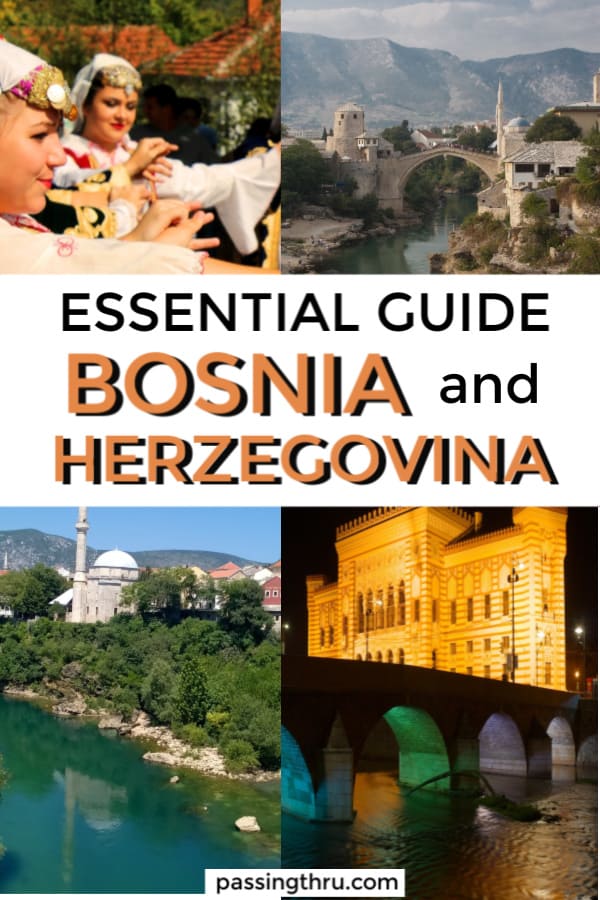
When they heard we were going to travel to Bosnia and Herzegovina, some people thought we were nuts. (Nothing new there.) Others asked if our Bosnia travel plan really was “safe.”
When we got there, at least one Bosnian wondered why we came at all. Apparently, Bosnia and Herzegovina trips aren’t all that common for Americans. But now that we’ve been, we want to return. This Bosnia and Herzegovina travel blog post will help you understand why.
This article contains affiliate links and/or references to our advertisers. We may receive compensation when you click on or make a purchase using these links.
Table of Contents
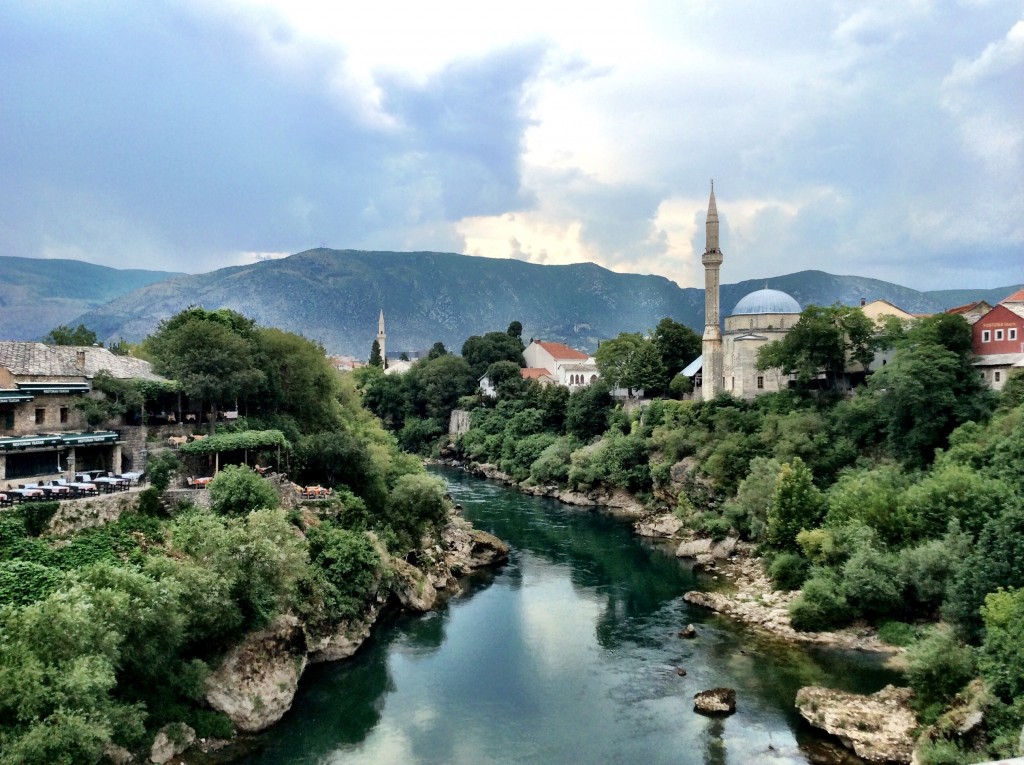
Ten things we couldn’t leave out of our Bosnia and Herzegovina Travel Guide for first timers:
1. getting in and out might seem a little difficult, but it’s really nothing to worry about..
As it turned out, we had a lot of time to think during our trip to Bosnia and Herzegovina. Getting in and around this part of the former Yugoslavia, and then out, takes a while. If you’re planning to travel to Bosnia, we recommend going by surface, actually.
Note: If you are planning a day trip from Croatia to Bosnia, check out my post Dubrovnik to Bosnia Day Trip: Easy Planning Guide
There’s always something better about an approach at ground level, seeing your destination mirage in the distance, drawing nearer to the moment when outskirts give way to the reality of place. It beats dropping in from the sky to have a look around and then jumping back out.
Be ready for thorough border processing at border crossings. You will be perused and your documents will be scanned a couple of times – coming out of wherever you came from and coming in. If you’re self-driving, be prepared for a much longer line at the checkpoints than if you’re on one of the international buses.
We just bought regular public transport tickets to Mostar at the Dubrovnik station. Online ticketing? Sorry, not available at that time. Mostar to Sarajevo? Same deal, pay in cash at the station in Mostar. Buses are frequent, amenities are hit and miss. Announcements we couldn’t understand were kindly translated by fellow travelers. Yep, they could probably tell by looking at us that we might need a little extra help. We felt rather solicitously cared for, as Americans of a “certain age.”
If you want a cushier experience getting to and seeing Mostar, you might want to sign on for a tour, particularly if you are coming from Croatia. Because this destination is one of the top things to experience from there, you will find a variety of experiences from which to choose:
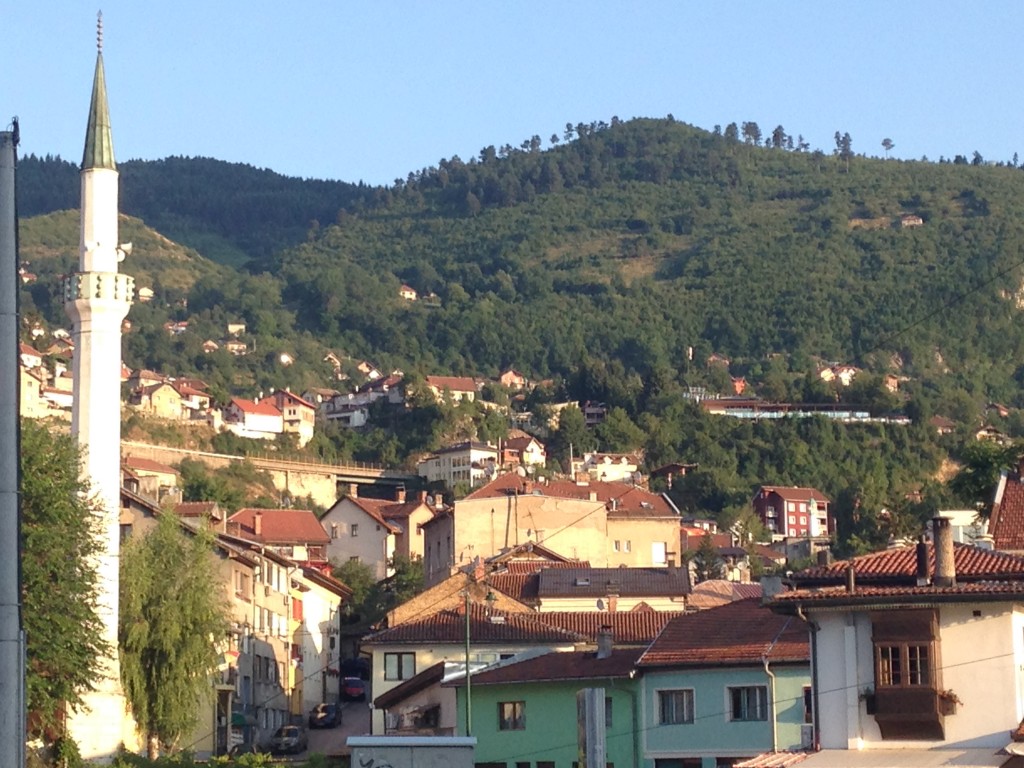
You may want to look around for alternative transport options if you’re leaving Sarajevo, as we did. An independent van company we saw in a newspaper ad ended up offering a much more comfortable, air-conditioned experience at a fraction of the price on that leg.
We just needed to be willing to accept an indeterminate departure: the van would leave when its passenger quota was filled. No worries.
We checked out of our hotel, the kind young man at the front desk made several phone calls to confirm and reconfirm departure, and ran outside to help us with luggage when the van finally did arrive.
2. There’s a difference between Bosnians and Bosniaks.
Bosnia k s are an ethnic group. Bosnia n s are a nationality. Political affiliations have historically occurred along religious and ethnic lines: Bosnian Muslims, Serb Orthodox Christians, and Croat Catholics.
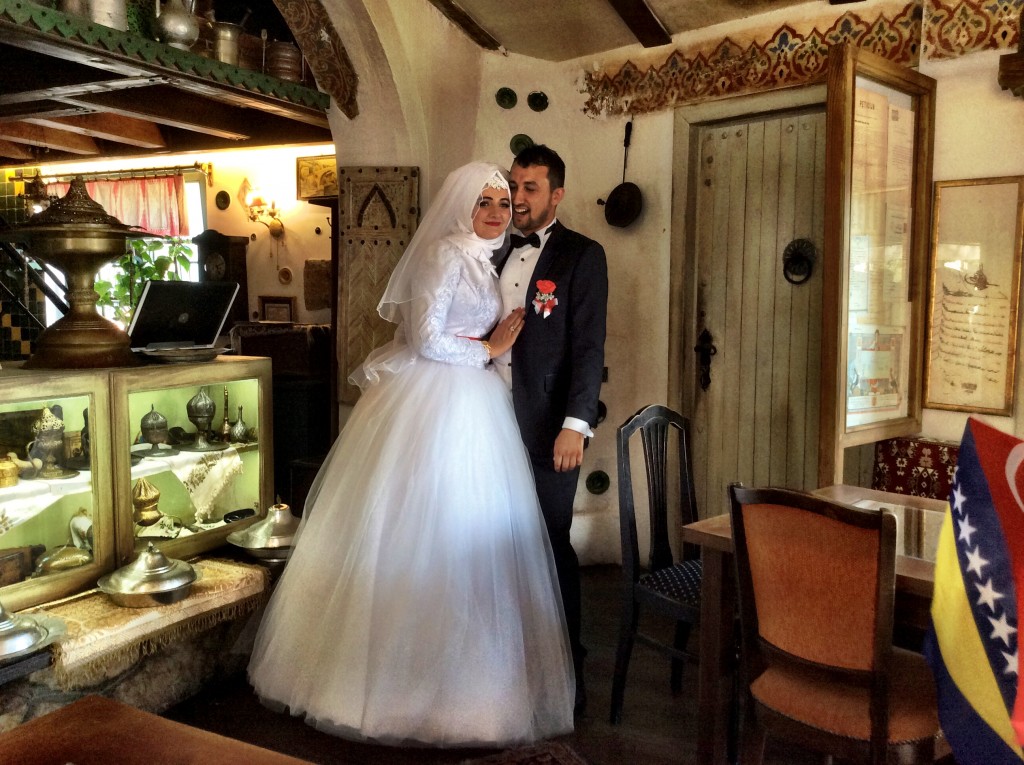
In the 1970s a political elite emerged via diplomatic service and Yugoslavia’s membership in the Non-Aligned Movement . After the death of Josip Broz Tito in 1980 and the demise of the Soviet Union, Yugoslavia’s individual nationalistic groups vied throughout the western Balkans for influence.
In the Bosnian National Assembly, ethnic tensions boiled over in a clash of attitudes favoring independence vs. remaining in the Yugoslav federation. Bosnian Serbs favored the federation, and independence was desired by Bosniaks and Bosnian Croats. This led to the Bosnian war in the early 1990s.
Today, the capital city of Sarajevo is often referred to as the “Jerusalem of Europe.” We found its multi-cultural atmosphere the most unique in all the capitals we have visited. Over the centuries, its status as a religious and political crossroads for conflict has been proven time and time again.
One of the best things to do in upon arrival is take a Sarajevo city tour. One of the Sarajevo walking tours will help you get oriented and plan your stay. Each of your senses will be impacted with the sights, sounds, and aromas of beautiful buildings, thriving outdoor markets, exotic foods and goods, and the regular calls to religious prayer.
3. Bosnia and Herzegovina may require more cash than you anticipated. Here’s why:
After World War II, when Tito and his partisans formed the Socialist Federal Republic of Yugoslavia, Bosnia and Herzegovina was one of its six constituents. Up until 1992, Bosnia was prosperous: military defense industry and multi-national corporate presence brought economic strength. An upwardly-mobile Bosnian might have worked at Volkswagen, Coca-Cola, Marlboro, Holiday Inn, or been involved with the 1984 Olympic Winter Games.
Then war devastated the Bosnian economy and destroyed its physical infrastructure. Its GDP essentially collapsed, free falling by 60%. Much of the country’s production has yet to be restored. Unemployment is close to 40%, with no sign of real stimulus affecting political and economic inertia.
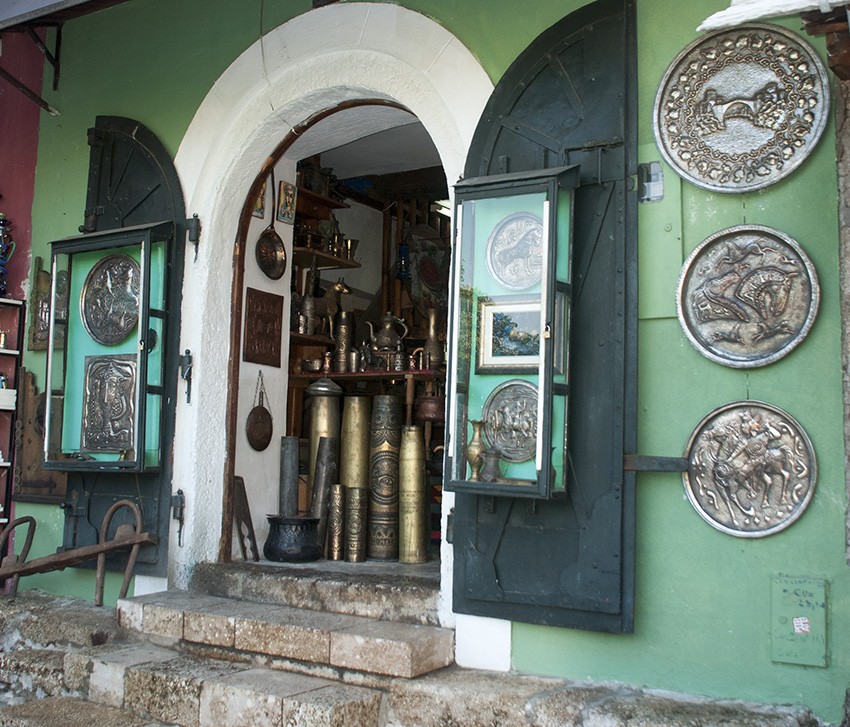
As you might expect with such conditions, there is a great deal of ingenious economic maneuvering. One of those is a free walking tour of Sarajevo. Our guide walked us through Sarajevo and revealed that while he held multiple graduate degrees in political science and diplomatic relations, he couldn’t find a job. Instead, he formed his Sarajevo walking tour company. With about 20 people in his tour that day, we estimated tips-only income might have equated to about $50 per hour. Paid in cash, of course.
We took several cash-only Sarajevo tours having discovered them only with the help of our Sarajevo hotel desk clerk. If you prefer to use a credit card and plan slightly in advance, there are variety of tours out of both Dubrovnik and Sarajevo that you can now book online .
The independent Bosnia and Herzegovina hotels at which we stayed either took only cash or had to be persuaded to accept payment by credit card. Whether this was due to an erratic banking environment or other bookkeeping-related reasons, we couldn’t say.
But it all worked out and we would not hesitate to stay again with our Sarajevo accommodation Hotel Latinski Most . Clean and comfortable, the suggestions and help from the staff are what made our Sarajevo stay superb.
Smaller businesses and restaurants were cash-only operations as well. ATMs are plentiful, and our U.S. debit cards worked just fine.
4. The scale of famous places to visit in Bosnia and distances may be different than you expect.
In the middle of Neum, our bus made a hard right, zig-zagging up and away toward Mostar. As the crow flies (across Google Maps) it’s not that great a distance between the two, less than 90km. Traffic, road conditions, and struggling uphill were bus-related challenges that led to a journey of more than 3 hours.
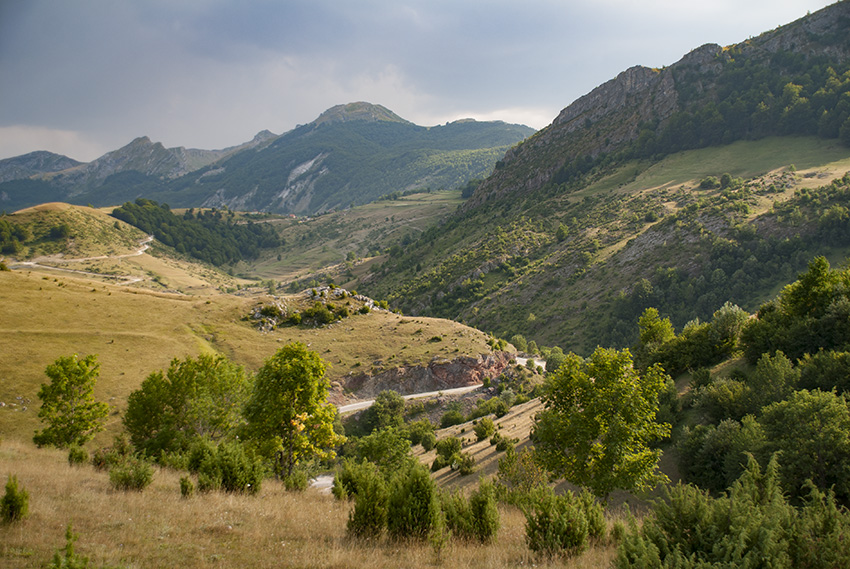
We could look across the river from our Sarajevo hotel to the place where the Archduke was assassinated . Somehow, we’d expected it to be a big plaza, where the assassins could have hidden in enormous crowds. It wasn’t; it was just a tiny nondescript little street corner with an old bridge next to it.
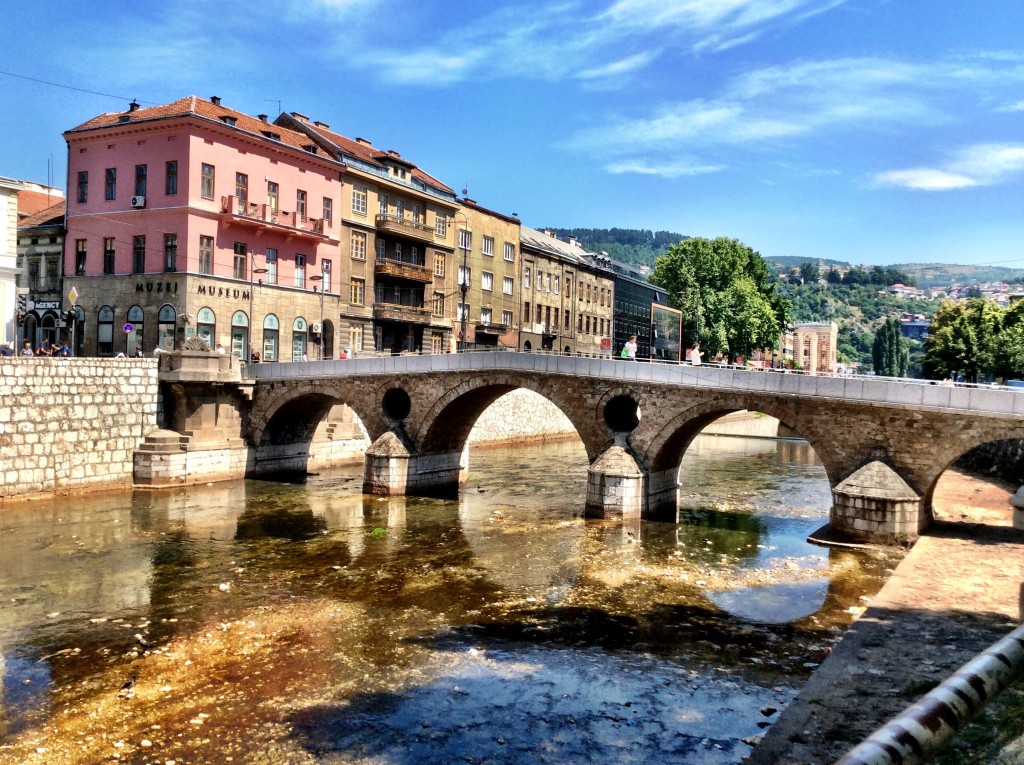
The hills from which Serbian forces fired on the streets of Sarajevo in the early 90s seemed all too close; the airport where the UN airlift off-loaded life-saving supplies is only a couple of kilometers from the city center.
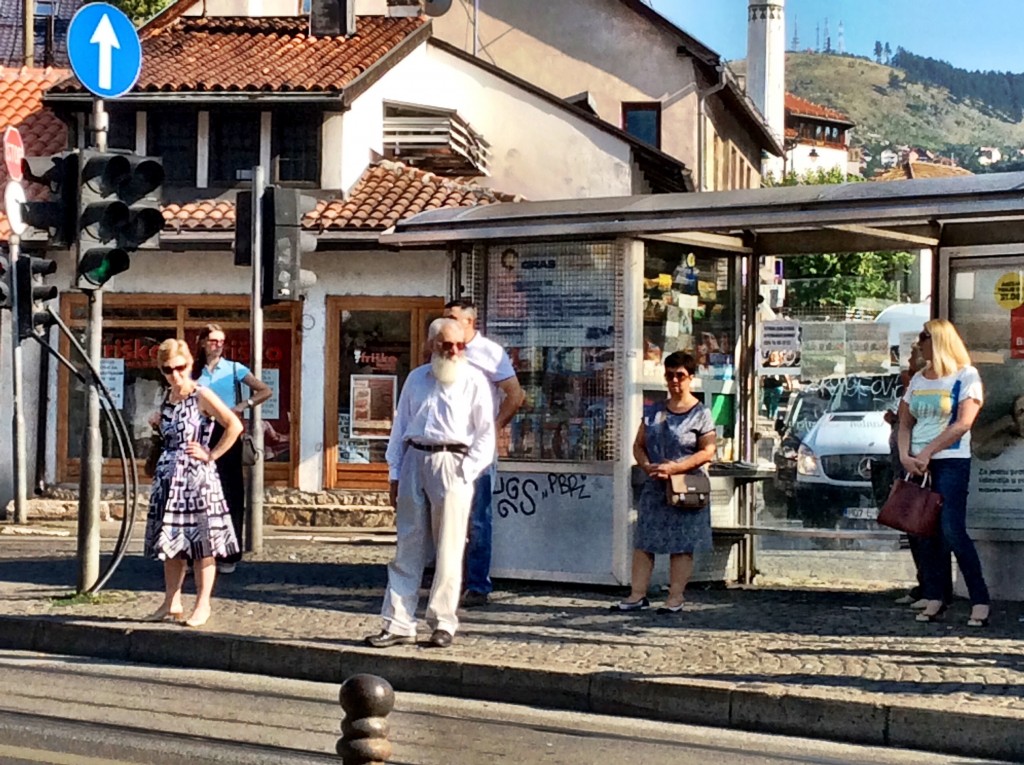
The fresh market where 68 people were killed and 200 wounded by an artillery shell , a tipping point which led to NATO air strikes, is no larger than our favorite open-air market on the island of Kauai. Sarajevo’s market was open-air then, too. Now it has a protective roof and business goes on with the memories.
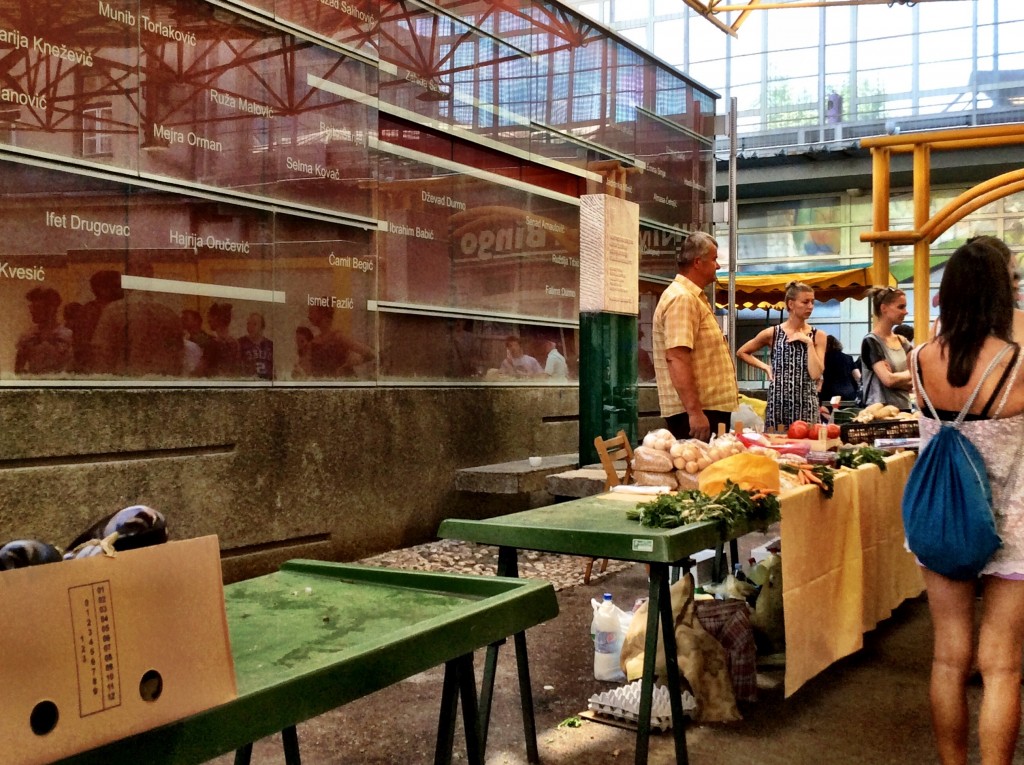
5. Is it safe to travel to Bosnia (2023)? Yes, the Bosnian war has been over for decades. That said, evidence of war is easy to see.
Now might be just the best time to visit Bosnia and Herzegovina. The war has been over for decades and the energy in the country is positive. Your Bosnia travel itinerary can be more free and flexible than ever.
Background: Between 1990 and 1992, sovereignty was declared by various entities in the region and boycotted by others. An independence referendum was held with 63% turnout and 99.7% in favor; Serb nationalists didn’t vote at all. As admittance into the United Nations became pending in 1992, tensions escalated.
Neum, the little coastal town in which our bus turned inland, took artillery fire from Serb positions in March that year. A month later, a Serb attack on Sarajevo’s peace rally is the moment that is generally agreed catalyzed open warfare between the three major ethnic communities.
Bosniak civilians were targeted in all major cities, captured and displaced by Bosnian Serb forces and sympathizers. Both Serbian and Croatian interests sought to expand their respective borders. When government-sanctioned warfare began in 1993, non-Serbs suffered civil rights violations and ethnic cleansing, such as occurred in the Srebrenica massacre. The town of Srebrenica is located in what is now known as Republika Srpska, sister entity to the Federation of Bosnia and Herzegovina.
This genocide elicited a response from the United States and the international community in the form of a NATO bombing campaign while Croat and Bosnian allies pushed back against the Serbs. In 1995, by agreement between representatives of Bosnia and Herzegovina, Croatia and Serbia, the fighting stopped, with NATO peacekeeping forces deployed and eventually peace talks restoring a fairly civil society.
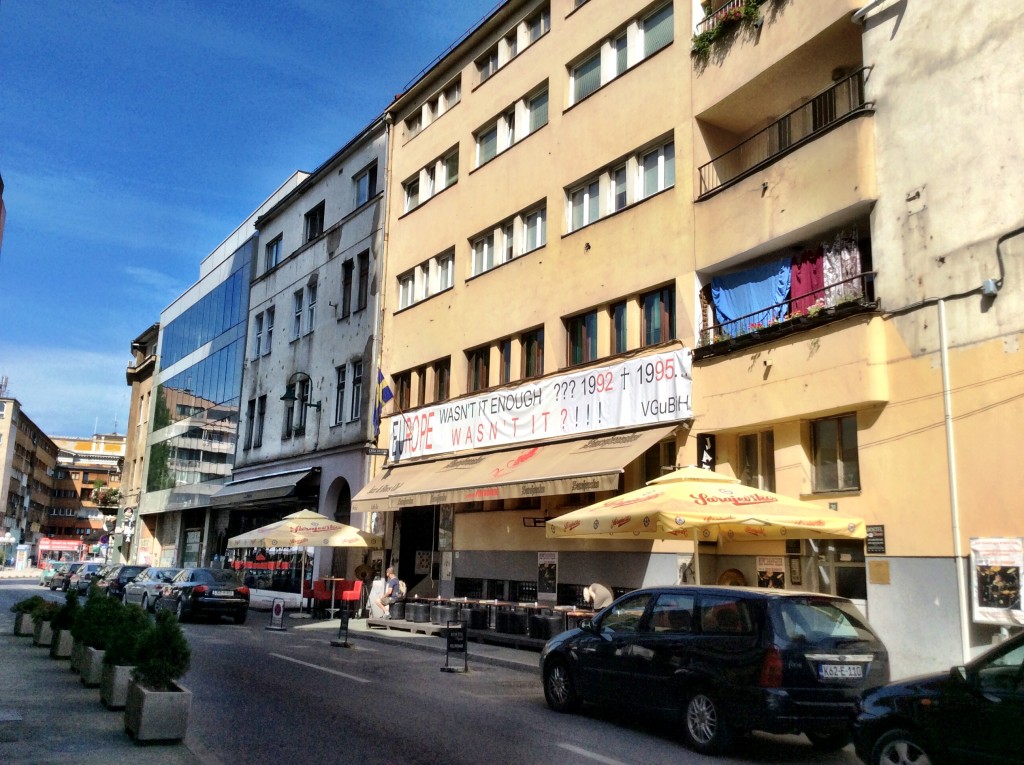
As we awaited dinner on our first night in Mostar (which is a UNESCO World Heritage Site), we picked up a coffee table-sized photography book at an adjacent restaurant table. Its images were taken during and right after the war.
The city was leveled, the beautiful Stari Most spanning the Neretva River, and the main mosque below it destroyed. The book itself was tattered, with a vintage aspect. We had to keep reminding ourselves that these events were younger than our children, whose childhoods seem like yesterday.
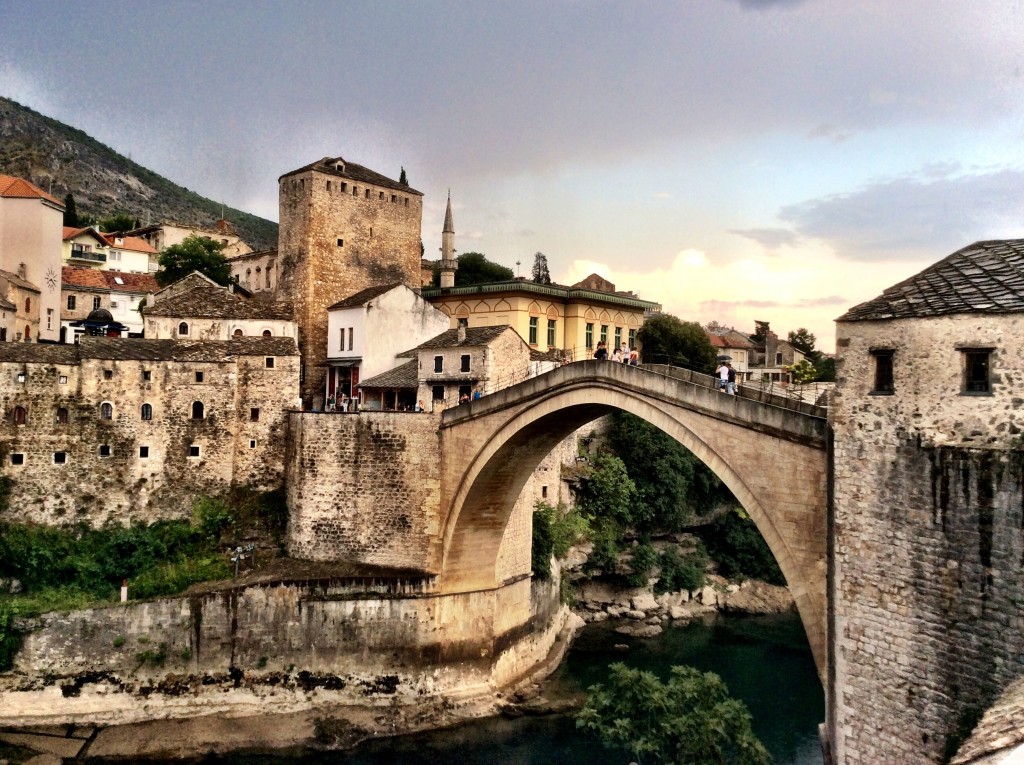
We sought the perspective of our two young Bosnia guides in Sarajevo, and asked is Bosnia and Herzegovina safe to visit.
The first had spent the war years, which began when he was seven years old, attending a makeshift school in the basement of his apartment building. His teachers risked their lives to get to their students. His mother walked several kilometers to work, always in high heels: she “wanted to look good if today were to be her last.”
The second had spent childhood in Vienna with relatives who took his family in when the war broke out. No one ever expected things to endure over four years.
Both young men felt it was necessary to move on from the past; both acknowledged that personal losses might prove this impossible for others. They were both glad to see more Europeans taking Bosnia and Herzegovina vacations.
While this may be the best time to travel to Bosnia in over two decades, they accepted that political opinions vary in opposite directions depending upon whom you ask. These assessments were equal parts logic and forgiveness; we were humbled and impressed.
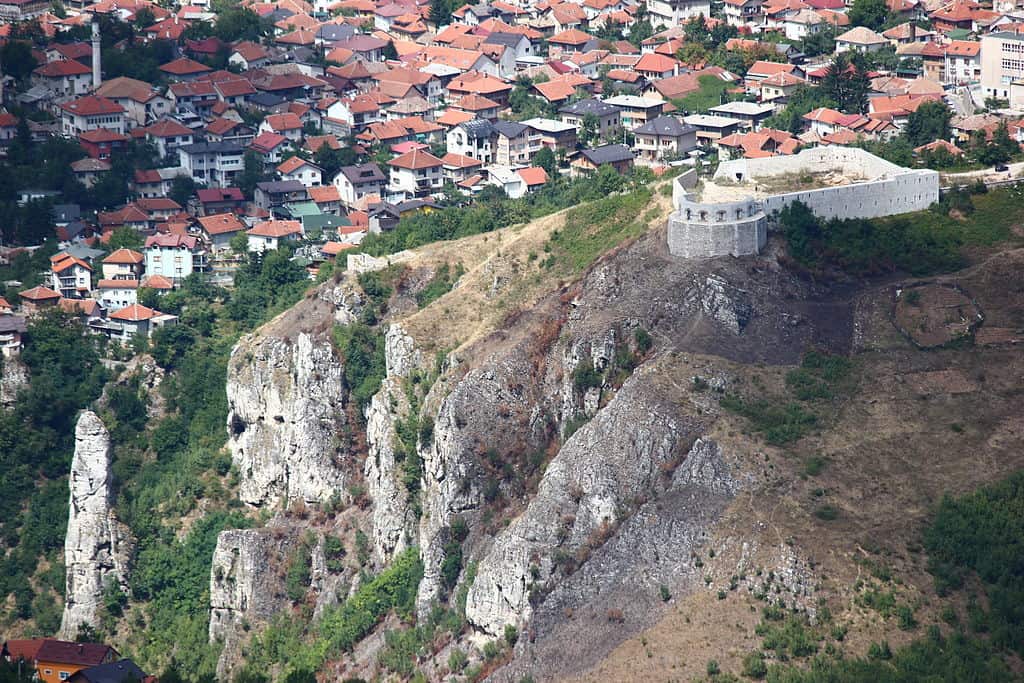
If you’re traveling to Bosnia, you may want to take a more meaningful deep dive into the war years with a guided tour which will take you to specific, prominent sites in Sarajevo. The perspective offered by your Bosnia tour guides who were personally impacted by the war will be sobering. As well, you will gain a better understanding of the issues which affect the country today.
The Sarajevo: Times of Misfortune bus tour begins with a panoramic view of the city from the White Fortress which sets the stage with background information as you go on to visit various places that figured prominently during the four-year siege. Click here for more information and booking. You might find the Sarajevo: Balkans Dark Side and War Tour more geared to your particular interests and an increased understanding. This 5 out of 5 star reviewed tour takes a somewhat different approach with Skip the Line access to the Tunnel War Museum and Vidikovac viewing points. Click here for more information and booking.
Is Bosnia and Herzegovina safe for tourists who venture off the beaten path? “Official” sources warn that visiting Bosnia can be dangerous due to unexploded land mines and other residual ordnance. No doubt this is true. Certain areas are marked off-limits with forbidding signage. We encountered none.
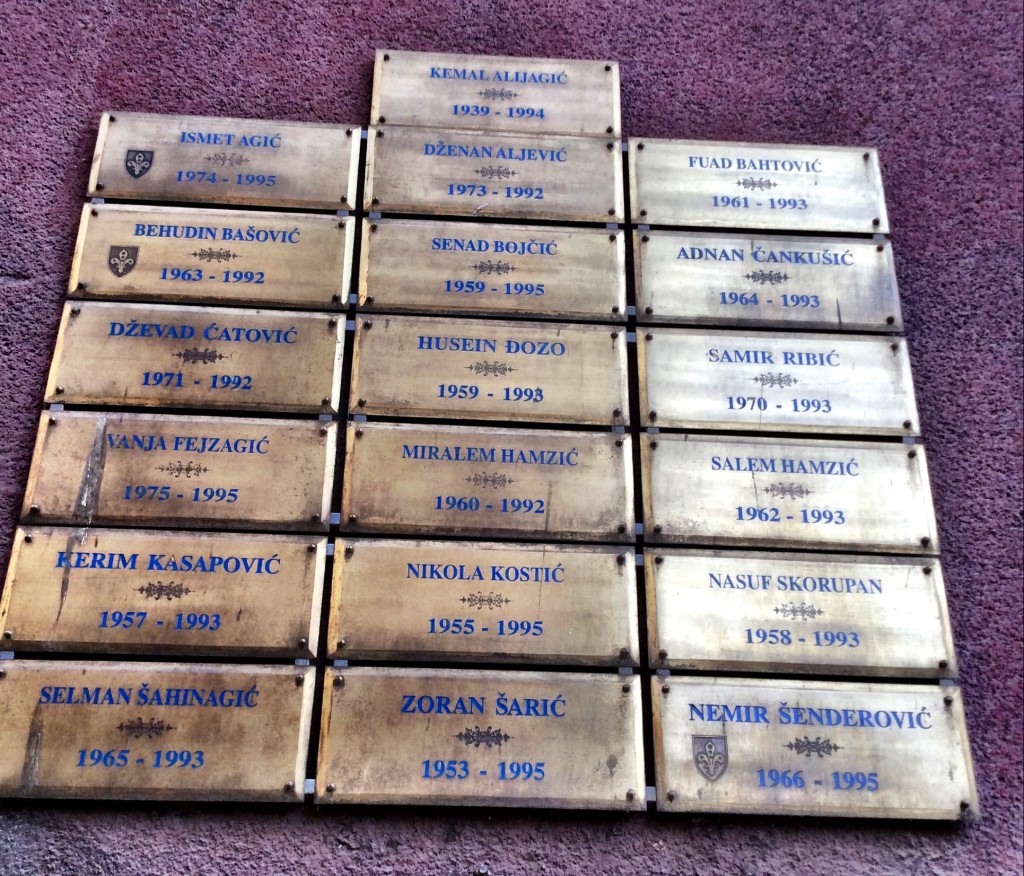
The country has had thirty years to make more highly trafficked areas safe for passage. If you stick to paved highways and urban locations when you travel to Bosnia and Herzegovina, you’ll be fine. Even our foray on dirt and forest roads into the mountains above Sarajevo where Olympic ski runs and infrastructure still serve winter sports enthusiasts was without incident or any evidence.
6. Politics in Bosnia and Herzegovina? Things have always been complicated here, and they still are.
Eastern Europe has long been the place where religions and empires intersected. Clashes and power struggles, boundary fluctuations, and regime changes since the sixth century have permeated the Bosnian identity and landscape. We were amazed how little our history classes had covered Balkan wars and significant events dating back to medieval times which had occurred in this region. As well, the influences of different religious sects and ideology – from pagan to modern Christianity and Islam – have left their mark.
Bosnia has had human inhabitants since Neolithic times. In the early Middle Ages, slavic tribes formed a confederation in this region during the first Migration Period in the 6th and 7th centuries. Roman Emperor Constantine designated Bosnia as an administrative area in the 10th century. Two hundred years later, it was formally established as a politically autonomous state within the Hungarian Crown. What followed until approximately 1391 was a series of power struggles between two prominent clans, with skirmishes and territory annexations. Following a 70 year decline, it was then annexed by the Ottoman Empire in 1463.
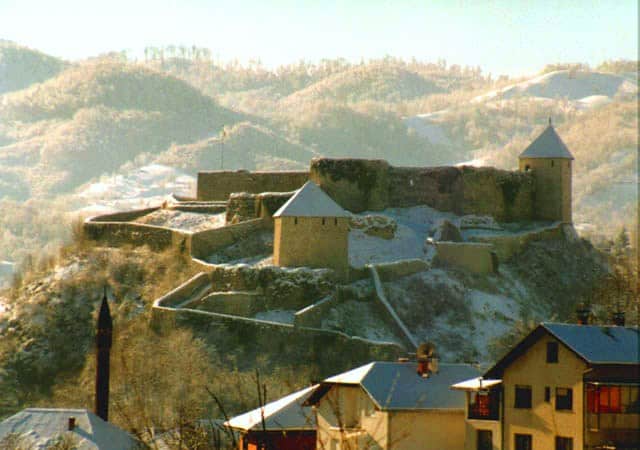
The Middle Ages are a fascinating period in this region. Thriving villages were protected by walled fortresses and natural geography. Tribal chieftains, Byzantine rulers, and Christian kings built imposing residences and added territory. Visit the medieval fortress at Tesanj, to which Bosnians refer as “the pearl of Bosnian tourism,” and the village of Vranduk and its citadel, which date to the 14th century, on the Age of Kings Tour from Sarajevo. Click here to book a day tour to Tesanj and Vranduk from Sarajevo.
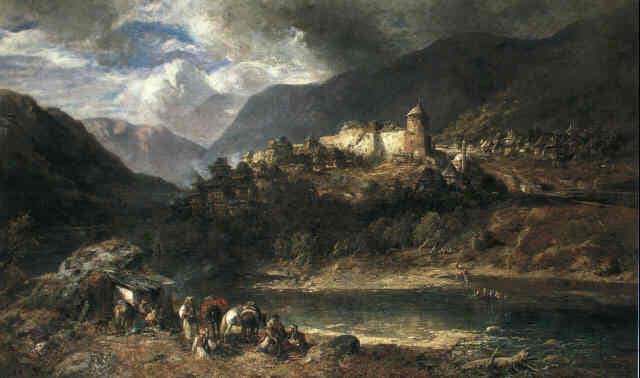
For a look at the cultural impact of ancient Muslim mysticism in Herzegovina, you’ll want to visit Blagaj. Older than Mostar, Blagaj has a Dervish monastery built around 1520, at the height of the Ottoman Empire, in a combination of Ottoman and Mediterranean style. The location is the site of an Illyrian fortress; Roman villages surrounding it were built during the Justinian era. Blagaj was an important medieval fortress and political seat during the Ottoman Empire.
Click here to get information and book a private day trip to Blagaj and the Kravice waterfalls from Mostar.
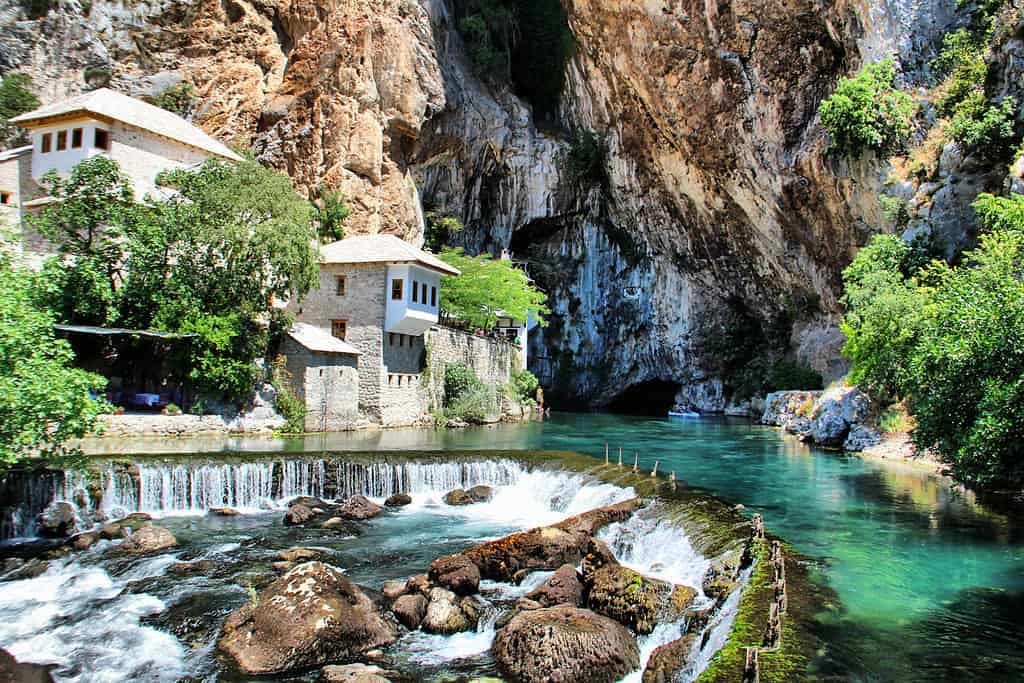
Today, there are multiple levels of political structure arising out of the 1990s war’s impact on the country’s ethnic groups. The national government is relatively weak, with decentralized decision-making in layers: geographic districts, cantons, municipalities and “official” cities. One of the main political objectives Bosnia and Herzegovina has at this time is integration within the European Union. Reforms are still in progress ahead of that affiliation.
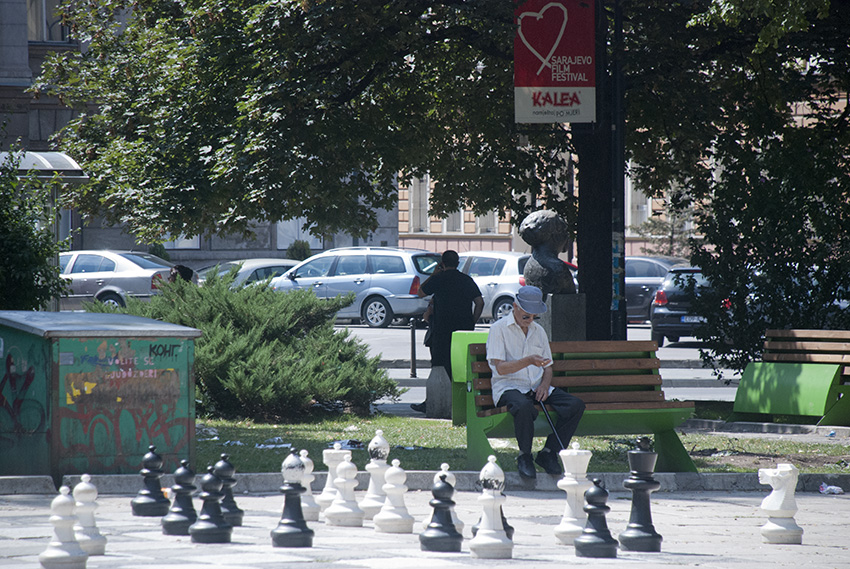
Are practicalities in daily life affected by this complexity? Definitely. Rarely, we were told, does anything get done at satisfactory speed. Sometimes, it was shared, progress is made outside of requirements. Other times, projects are indefinitely halted. We can all relate how “decision by committee” affects outcomes. This is the mire within which attempts to better and modernize the country operate under the BIH authorities.
7. You’ll enjoy wonderful Bosnian coffee, but you need to know the 1-2-3 rule.
Bosnian coffee is world famous for good reason. It’s strong, but not muddy as other regional coffees (Turkish coffee, anyone?) can be. As is common in this part of the world, coffee culture includes ritual preparation and ceremonial enjoyment.
Should you be invited in for coffee with a new friend in Bosnia you must understand Bosnia coffee etiquette – the rule of 3: the first coffee is always one of welcome.
The second coffee is brewed and poured as the signal for intimate conversation concerning whatever subject is at hand. It is during the second coffee that you and your host strengthen your bond by understanding (but not necessarily agreeing with) each other.
The third brew and serving? It’s last call. You will enjoy it together, but you also know you’ve been given the nod that once finished, you’ll be on your way.
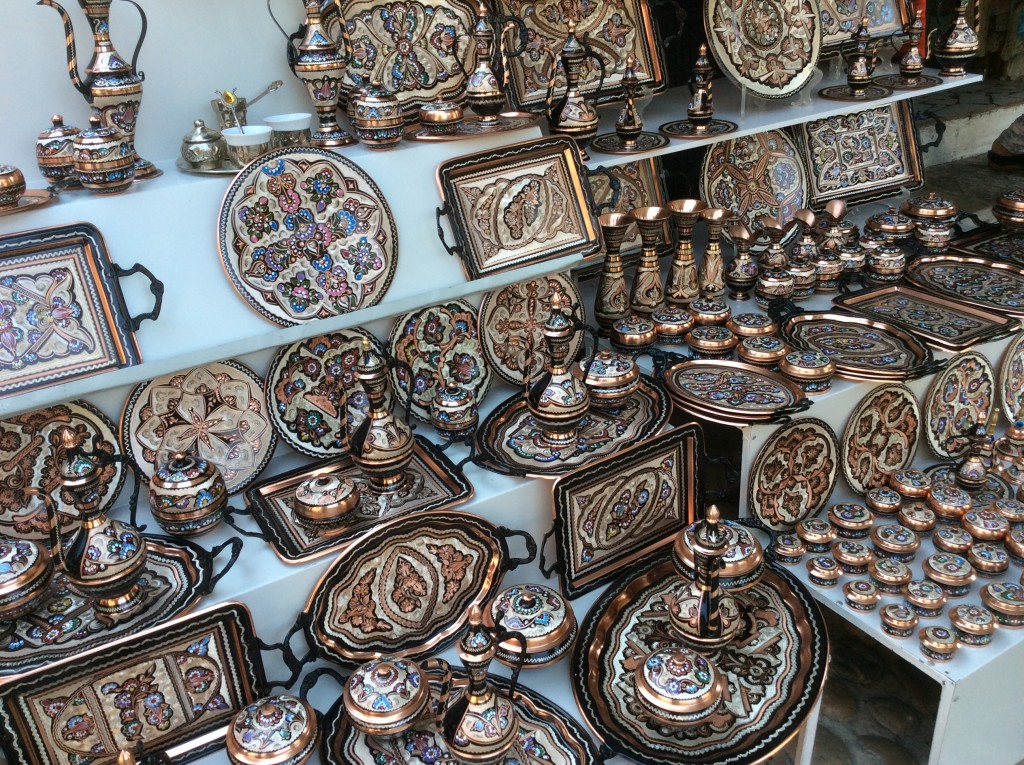
8. The local Sarajevo beer is really good.
Sarajevsko pivo has been brewed since 1864 in Sarajevo. Alert students of history will realize that the company was founded long before the decline of the Ottoman Empire’s hold over Bosnia. This disputes the notion that Islamic tradition and alcoholic beverages cannot co-exist.
Brewed with spring water from a source in the courtyard of the current building (which dates from 1893), this Sarajevo beer is a plucky little thirst quencher. We both liked it.
During the Siege of Sarajevo, citizens risked their lives under sniper fire to draw water from the brewery’s spring.
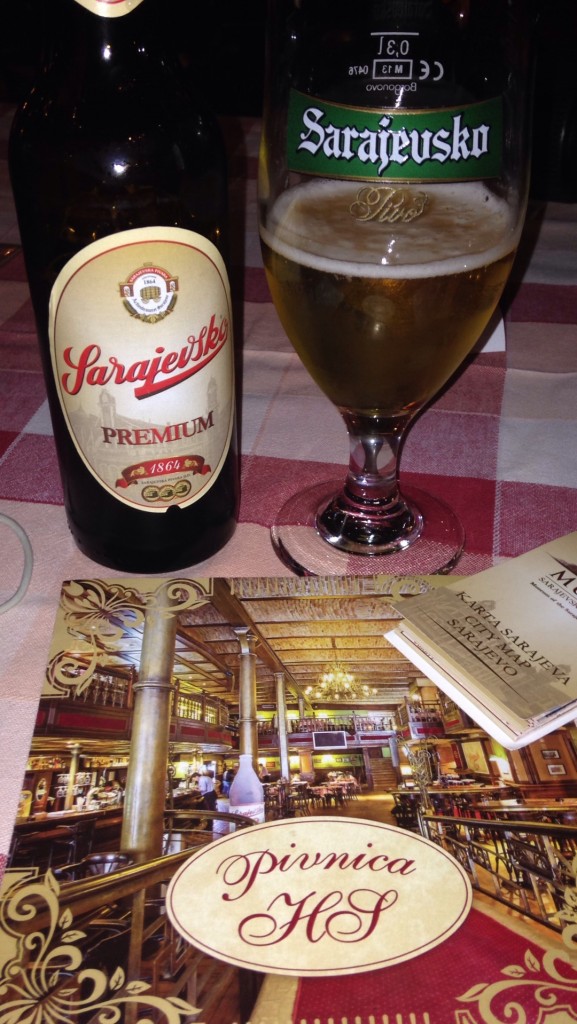
9. A trip to Bosnia and Herzegovina will convince you this is one of the most visually beautiful places in the Balkans region.
The scenery holds its own here, the country’s topography and natural beauty is comprised of a pleasing combination of mountains, hills, turquoise rivers and flatlands. Climate is Mediterranean in the south, while inland in Central Bosnia you’ll get hot summers with cold and snowy winters.
About 50% of Bosnia is forested, with wildlife such as bears, wolves, boar, deer, falcons, and the rare chamois. One of the only two remaining primeval forests in Europe, the Perucica Forest Reserve is located within the oldest of Bosnia and Herzegovina’s national parks, filled with natural resources.
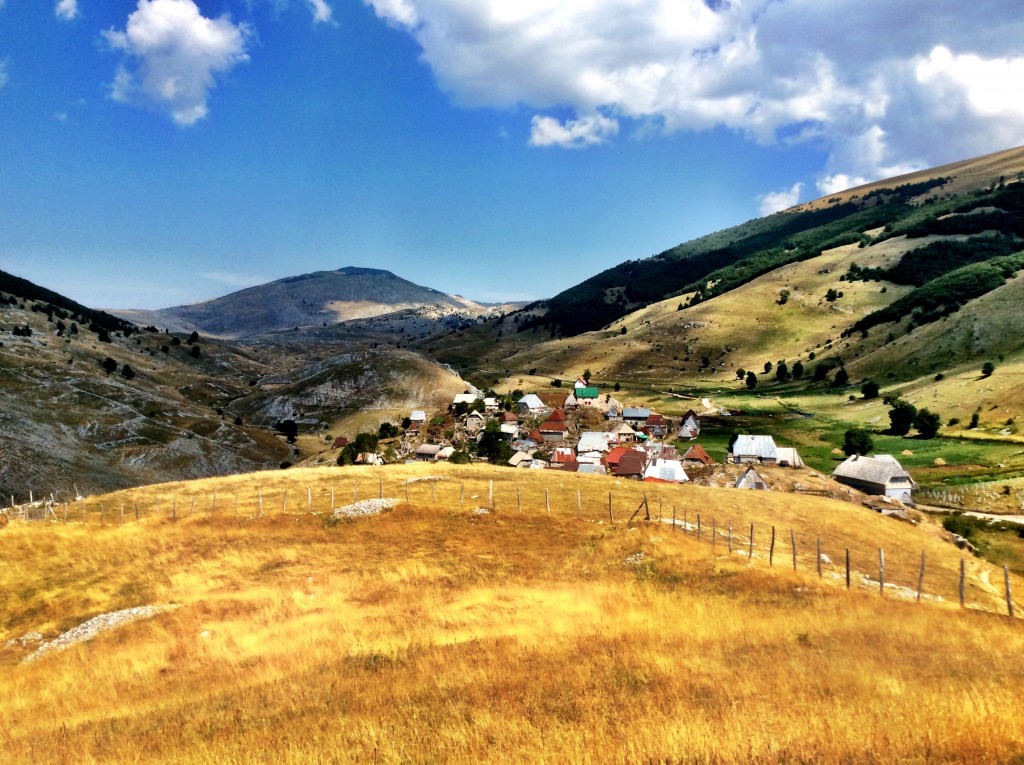
The famous Kravice waterfalls – known as Bosnia and Herzegovina’s “mini-Niagara” are a great day trip for scenic viewing, photography and swimming.
Click to arrange a private tour to Kravice from Mostar or to arrange a full day tour to Kravice from Sarajevo .
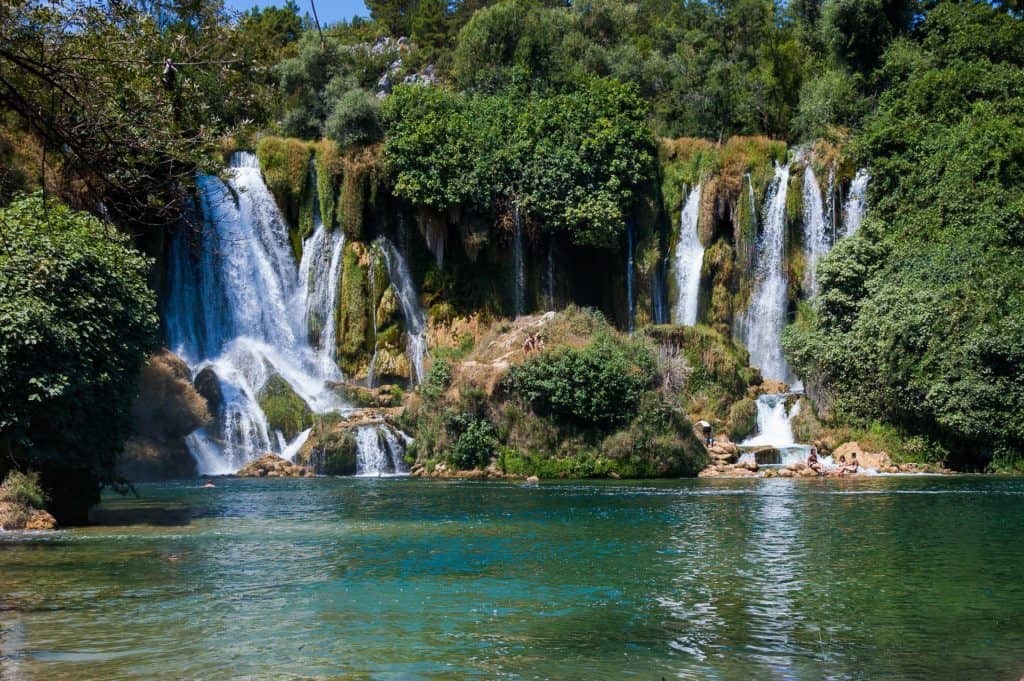
Not only is the geography scenic, but so is the evidence of man. Impossibly beautiful vistas with storybook qualities awaited us everywhere. We appreciated a meld of modern vibrancy and timelessness.
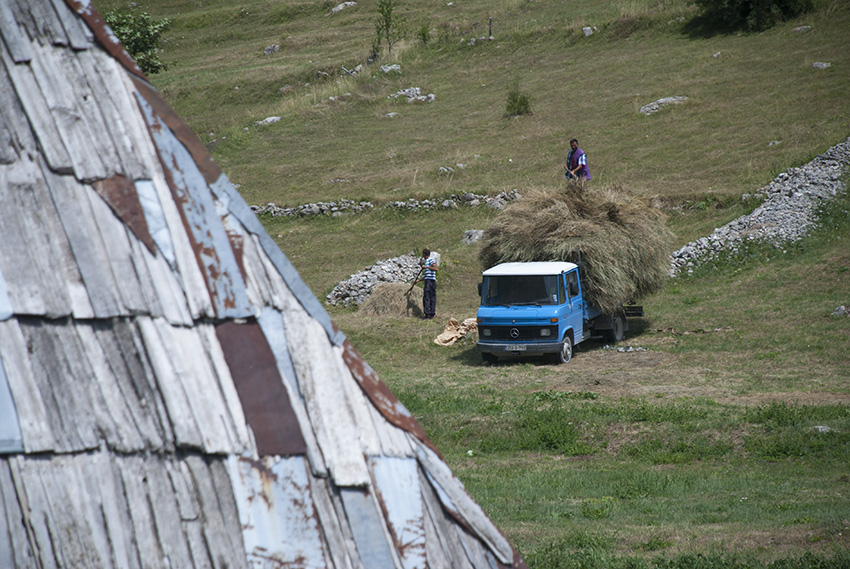
We also recognized that hardship meant the old ways might not live much longer. Our visit to Lukomir , the oldest and highest semi-nomadic village in the Dinaric Alps of Bosnia, remains one of the most memorable experiences we have had in all our travels. This is the only such village in Bosnia which was not destroyed by the Serbs in the 1990s war.
You can visit in the summer months from late May to early September, depending upon weather conditions. The village is located at very high altitude above the Bjelasnica Winter Olympics site on one of the numerous ranges near Sarajevo, so plan your attire accordingly. You will interact with locals, have a traditional meal and Bosnian coffee, and hike along the ridge of the Rakitnica Canyon, 800 meters deep.
This was our most memorable experience on our trip to Bosnia and Herzegovina. We highly recommend a tour visit to Lukomir.
Click here for more information and book your visit to Lukomir.
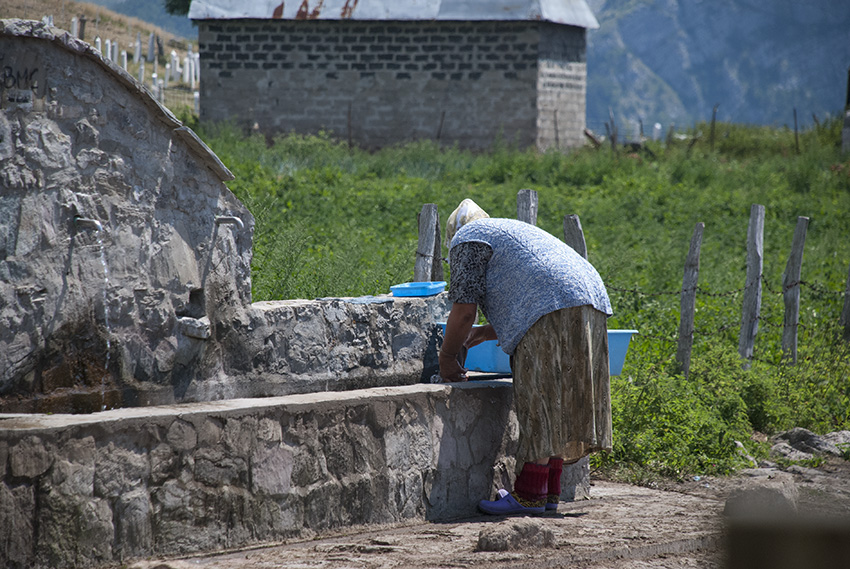
10. Your dollar goes a very long way and is very welcome. Bosnia and Herzegovina travel is inexpensive by Western standards.
Bosnia and Herzegovina tourism and ecotourism is on the rise. The southern Alpine terrain has wilderness and natural assets which attract skiers, bikers, hikers, whitewater enthusiasts and mountaineers.
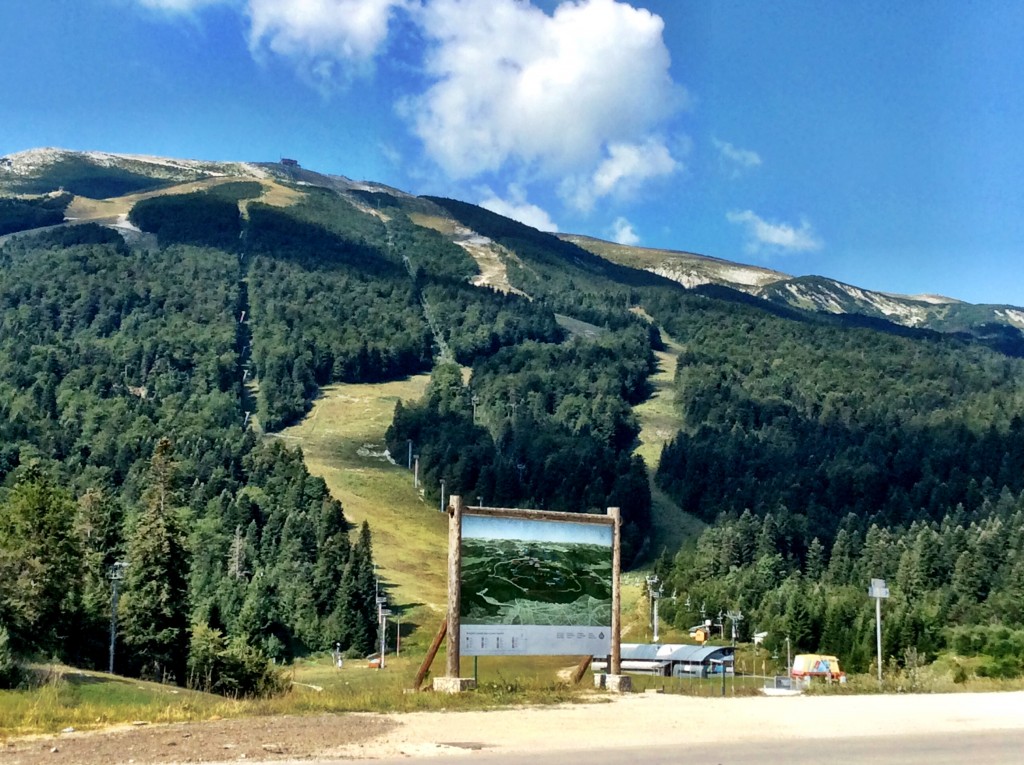
Bosnia and Herzegovina has a rich history because it has been a cultural crossroads through the centuries. This provides a variety of architectural, religious, commercial, and interpersonal perspectives. Your dollar goes farther here than in neighboring Croatia and other Western Mediterranean and EU countries.
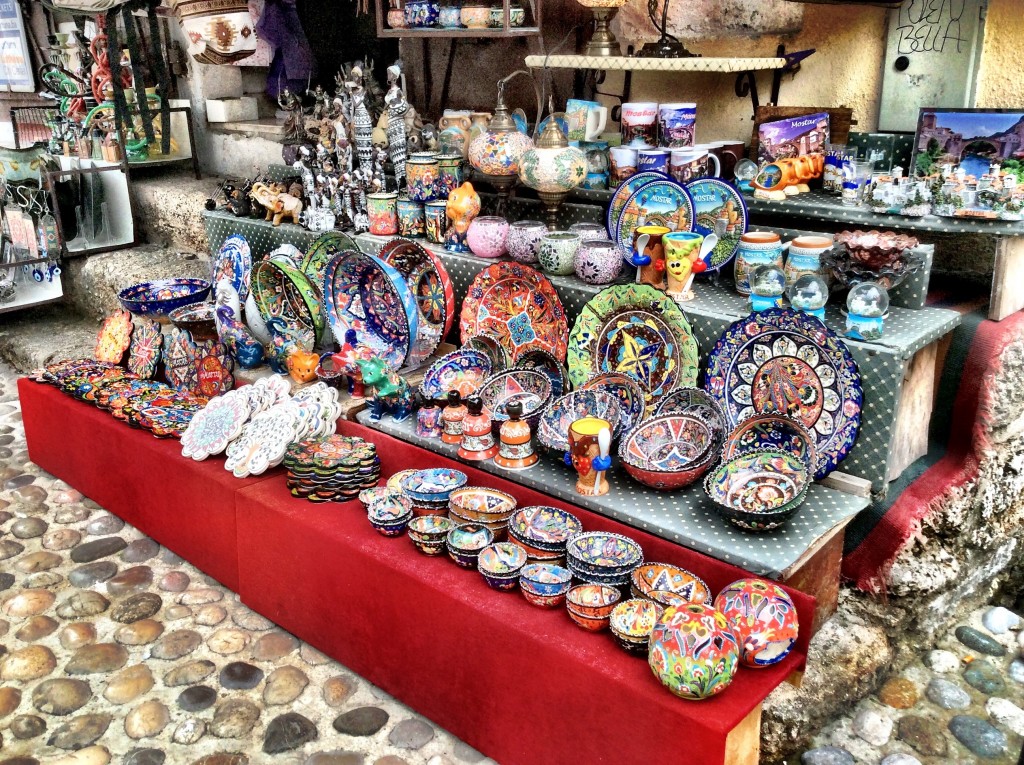
We were welcomed with open arms and a generosity of spirit, with high levels of comfort at very affordable rates. This combination made for wonderful experiences in this beautiful country. The value of Bosnia & Herzegovina travel for first timers and repeat visitors alike is highly demonstrable by any measure. Why not consider it?
Pinnable Images:
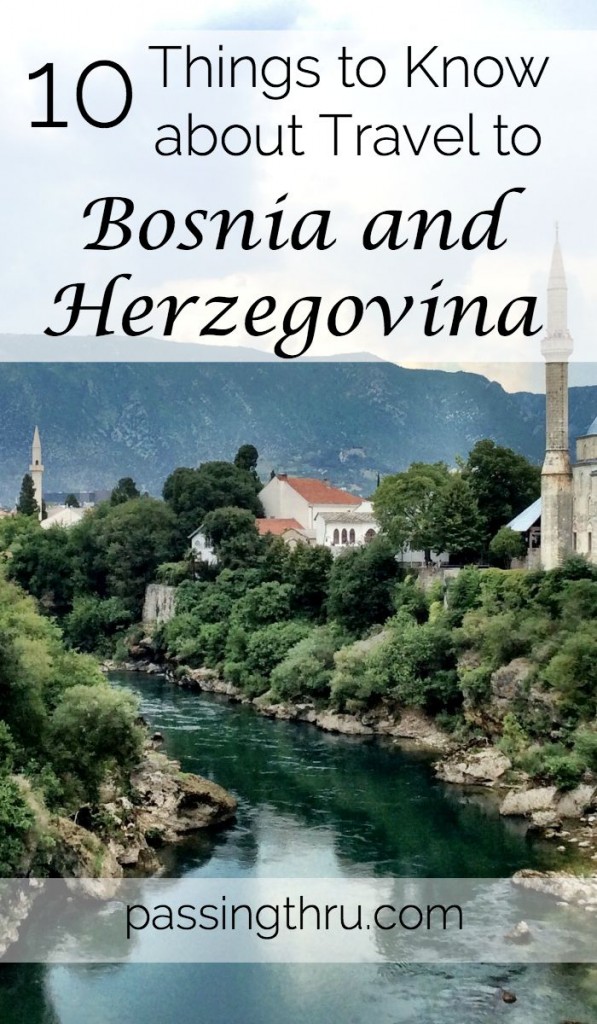
PassingThru is a participant in the Amazon Services LLC Associates Program. As an Amazon Associate I earn from qualifying purchases.
To view PassingThru’s privacy policy, click here.
Betsy Wuebker
- Senior Travel 2024 - 10 Tips for Older Travelers
- 15 Essential Steps to Explore the Solomon Islands - Discovering the Unseen
- 19 Prime Destinations for a Fabulous Tee-Total Getaway - Where Sobriety Meets Adventure
- Is it Too Late to Save the Planet?
Masud Hannan
Saturday 9th of February 2019
Yes, Best blog on Bosnia. We are planning trip this summer. Can I rent a car from say Croatia or say Austria and travel to Mostar, Sarajevo etc. Are there cross border issues you are aware of. I plan to spend Two days in Bosnia. Thanks, Hannan
Monday 11th of February 2019
Hi Hannan - Yes, it's possible to rent a car in Croatia and take to Bosnia. Check with your rental agency for details.
23 UNESCO World Heritage Sites in Europe Recommended By Travelers | Solitary Wanderer
Thursday 9th of June 2016
[…] Mostar, Bosnia and Herzegovina (Passing Thru) […]
Wednesday 20th of April 2016
Kudos to you. Your blogs are great.....by far the most informative intelligent blogs I have read . You give so much insightful information and trust me I have read hundreds and hundreds of blogs.Great job
Hi Dani - Thank you so very much.
Thursday 17th of March 2016
Mostar for me was one of the most impactful places I've ever been! The clash of cultures is impressive, but I gotta say there is a weird athmosphere going on. It seems the city is still not with peace with itself!
Hi Bruno - Interesting that you would pick up on that vibe. We did sense uneasiness, but attributed it more to difficult economy and low tourism numbers. Bosnia and Herzegovina is struggling. The benefit to travelers is that our money goes farther and our presence is very much appreciated.
International Travel Safety Don'ts - A Baker's Dozen - Passing Thru
Monday 21st of December 2015
[…] other remote areas. We spent time in two cities, and kept on the road in the mountains. Therefore, we learned other things, including the war there has been over for 20 years and people are looking to the future. Imagine […]
© 2024 PassingThru. All rights reserved.
Wander-Lush
Explore Bosnia & Herzegovina: The Ultimate Bosnia Travel Guide
- Europe / The Balkans
When you go to Sarajevo, what you experience is life. Mike Leigh
Why you’ll love Bosnia and Herzegovina
Bosnia and Herzegovina (BiH for short) is often associated with loss and death. From the assassination of Archduke Franz Ferdinand which set WWI in motion, to the Siege of Sarajevo and the Srebrenica massacre, BiH has long been viewed as a nation torn apart at the seams. But now more than ever, it’s equally a place of new beginnings and budding creativity – a place where you can feel life itself tingling on your skin.
In 1992, citizens voted in a monumental independence referendum and Bosnia and Herzegovina gained her independence. The dotted lines of autonomous republics, the intricate political system (often named the most complex in the world), and the very presence of the ‘and’ in the country’s name are a clue to the kind of diversity and contrasts you can expect today.
If there’s one thing I learned after five weeks travelling around BiH, it’s that the warmth of the people and the illustrious beauty of the landscape are the strongest uniting forces.
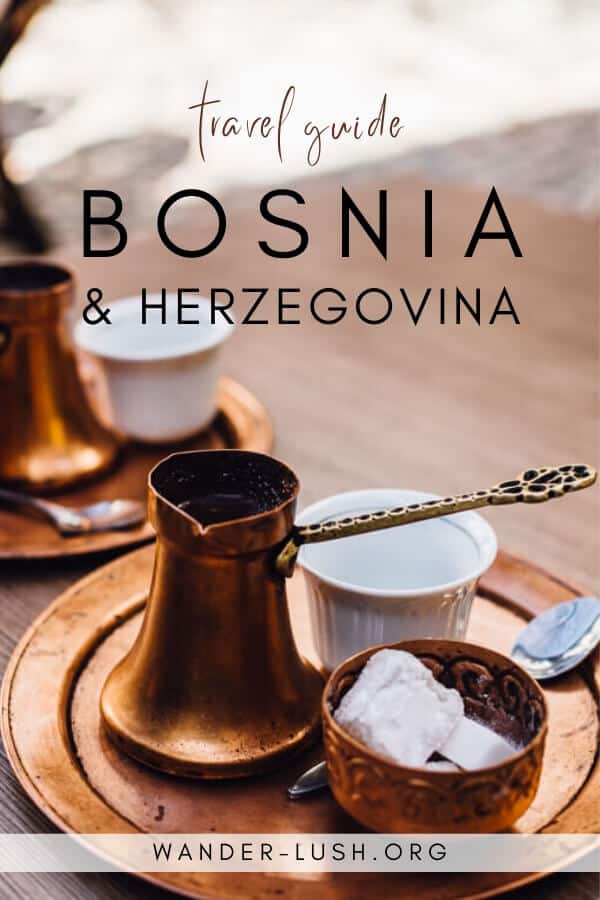
Bosnia travel essentials
Please note: Some of these links are affiliate links, meaning I may earn a commission if you make a purchase by clicking a link (at no extra cost to you). Learn more .
April/May or October/November (spring/fall shoulder seasons).
How long in Bosnia?
2 full days for Sarajevo; 5-7 days for the highlights; 10 days to see everything.
Daily budget
35-50 USD per person per day (mid-range hotel; local meals; bus fares; museum tickets).
Getting there
Fly into Sarajevo or Tuzla; drive/bus/taxi from any neighbouring country.
Visa-free for most passports (stay up to 90 days).
Getting around
Hire a car; use intercity buses and vans.
Where to stay
Hostels, family-run guesthouses or hotels.
Tours & experiences
Market tours, UNESCO sites and wild landscapes.
Things to do in Bosnia and Herzegovina
In Sarajevo , BiH’s capital city, the line where Asia stops and Europe begins (or is the other way around?) is literally drawn in the sand. A plaque on the pavement separates the Austro-Hungarian-built part of the city, with its market halls and plasterwork facades, from the Ottoman quarter, with its public fountains and singing minarets.
Sarajevo’s Old Bazaar , Bascarsija , is pure magic. As you dart between tea houses, carpet shops and Buregdzinicas (bakeries specialising in burek ), you move to the rhythm of tradesmen who still pound bronze with the same fervour as they did centuries ago.
As you cross the stone bridges in Mostar , Visegrad and Konjic , you begin to understand that not only is each one a proxy for a devastating chapter of Balkan history (which every traveller must take the time to learn about), it’s also a symbolic bridge between past, present and future.
From Jajce , the city with roaring waterfall at its centre to Pocitelj , an almost-abandoned Ottoman town, Banja Luka , the country’s second city to the sweet Trebinje ; between the Dinaric Alps , the Pliva Lakes and the ambling River Drina , Bosnia and Herzegovina has a way of making you feel alive.
Explore Bosnia and Herzegovina
Discover all the best things to do in Bosnia with my latest travel guides.
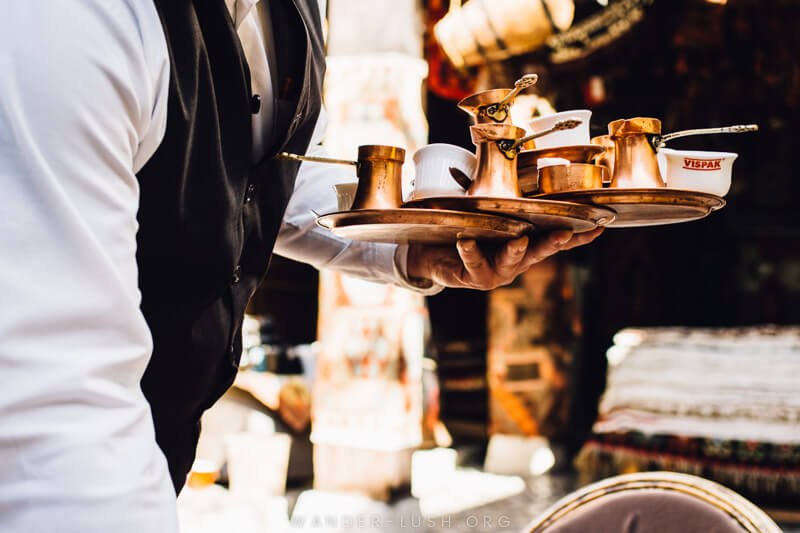
Sarajevo Through the Lens: 42 Magical Photos of Bosnia & Herzegovina’s Capital

How to Spend One Day in Mostar: 24 Hours in Bosnia and Herzegovina’s Most Captivating City
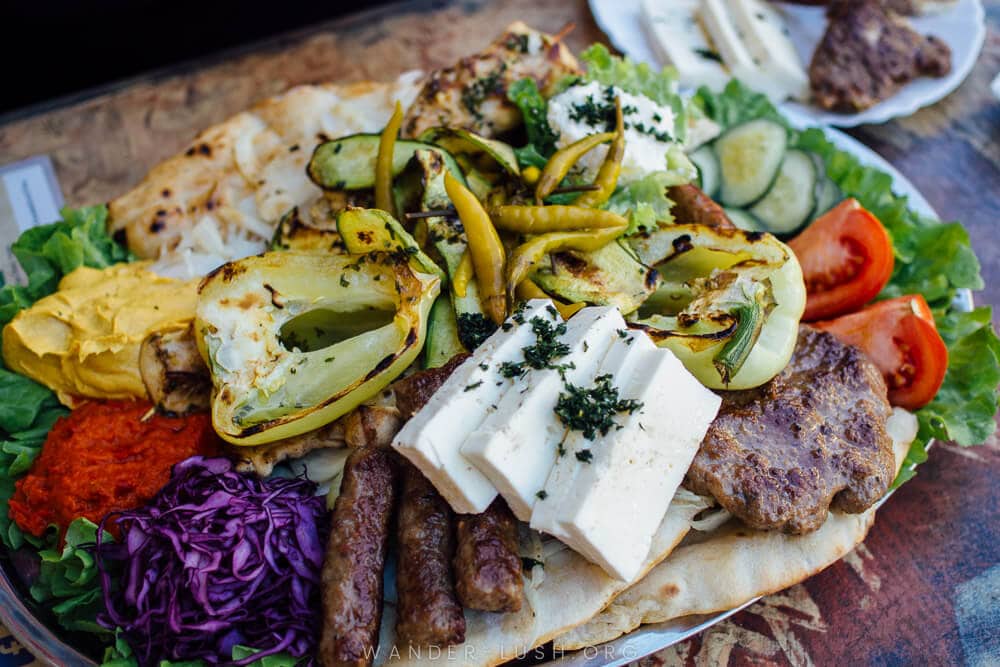
The Best Bosnian Food: 20 Delicious Things to Eat & Drink in Bosnia and Herzegovina
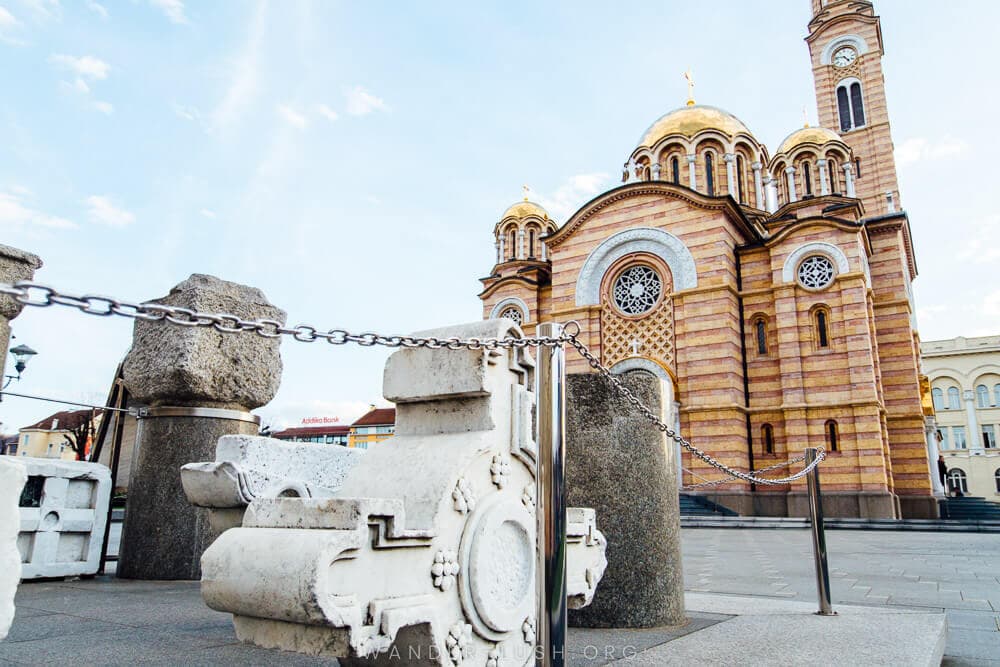
12 Things to do in Banja Luka, Bosnia & Herzegovina’s Second City (Republika Srpska)
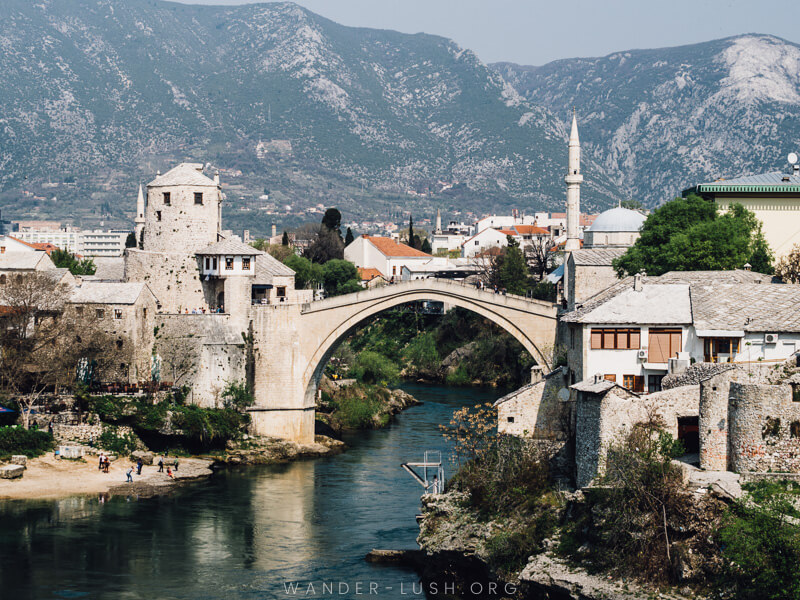
12 Best Sarajevo Day Trips for History, Nature & Culture
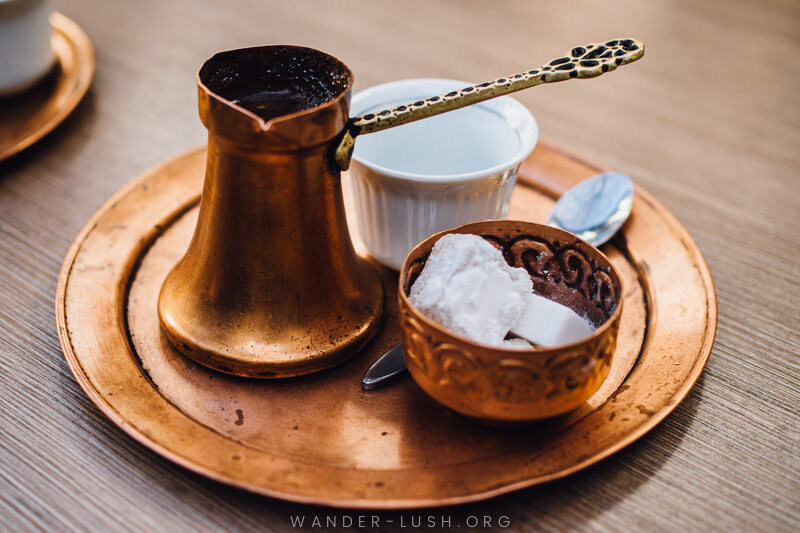
5 Things I Learned on a Sarajevo Food Tour

Pliva Lakes & Watermills: A Guide to Visiting From Jajce

A Quick Guide to Jajce, Bosnia & Herzegovina’s Cascade City

Mostar to Pocitelj: A Complete Guide to Visiting the Ottoman-era Open Air Museum
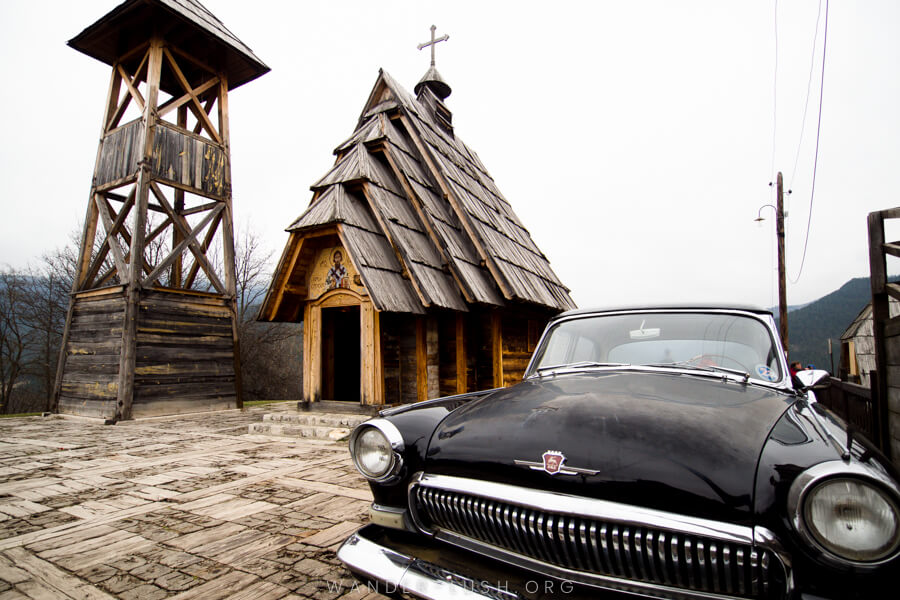
An Epic Day Trip from Sarajevo to Visegrad, Borak Stecci and Mokra Gora
My bosnia favourites.
Via Dinarica Trail (Slovenia to Kosovo via BiH).
Must-eat meal
Tufahija (baked apple) with a Bosnian coffee.
local experience
Watching the sunset over Sarajevo from Bijela Tabija.
best souvenir
A copper tray or coffee pot from the Sarajevo Old Bazaar.
- Travel Guide
- Popular Destinations
- Things To Do
The Great Pyramid of Bosnia at Visoko
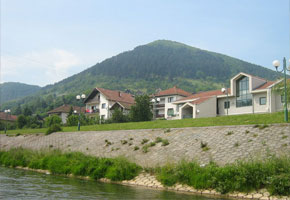
Food in Bosnia and Herzegovina
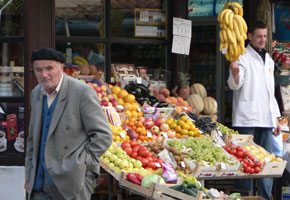
The Long, Troubled Road to Today’s Bosnia
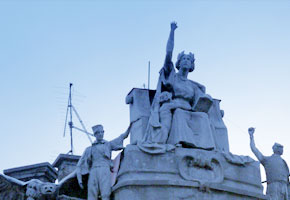
Sarajevo is the capital of Bosnia-Herzegovina and is the focal...

Mostar is the fifth-largest city in Bosnia and Herzegovina and...

Medjugorje is the city in Bosnia and Herzegovina for relaxation,...
Other popular destinations in Bosnia & Herzegovina include Neum , Jablanica , Banja Luka and Tuzla .
Featured Travel Tips

No matter what time of the year you choose to travel to Bosnia...

Bosnia and Herzegovina is one of the most diverse countries in...

Traveling to Bosnia gets easier every year. More flights means...
For more travel tips for Bosnia & Herzegovina can be found in our Travel Guide , Culture and Things To Do sections.
Recent Articles
If you are headed to ski on one of Bosnia and Herzegovina’s famous mountains, here’s three locations you just...
January 7, 2008 | Read the story »
Sutjeska National Park Sutjeska National Park is one of the oldest parks in Bosnia and Herzegovina and a perfect tourist...
Budget If you’re on a budget, head to the city center to find lots of cheap eats fast. Try a pita, which is a special...
Visoko means high place in Bosnian, and as soon as you visit it, you’ll see where the name comes from. This town, located...
Sarajevo’s cosmopolitan atmosphere harbors an intellectual flair in many of the popular tourist destinations. This...
Sarajevo draws visitors from all over the world as the largest urban center in Bosnia. With a strong cultural vibe, active...
January 6, 2008 | Read the story »
Banja Luka, the second largest city in Bosnia-Herzegovina, is located along the Vrbas River in northern Bosnia. Banja Luka...
To many visitors to this area, it is one of the most beautiful regions in Bosnia and Herzegovina to visit. Jablanica is found...
Medjugorje is the city in Bosnia and Herzegovina for relaxation, religious reflection, and cultural sightseeing. This small...
One of the amazing things about Bosnia is that you can experience so many different climates in such a small region. Little...
Walking Tour of Sarajevo
City Guides
Our goal is to share the many mysteries and wonders of Bosnia & Herzegovina with you.
Have any questions about Bosnia & Herzegovina that you would like to see us answer on this website? Please let us know .
Copyright © 2007 Discover Bosnia · Sitemap · Photo Credits · Related Websites
Bosnia & Herzegovina Travel Guide
Last updated on May 18, 2024 by Shannon
The Balkan States are not a region many mainstream travelers have on their bucket list of places to visit next. It’s still considered an offbeat region, although that is changing quickly. Croatia leaped onto the tourist radar over the past decade, and as tourism increases, many are discovering that neighboring Bosnia & Herzegovina is a destination in its own right.
I’ll fess up right now, I deeply loved my weeks the country, and I consider it one of the most underrated places I’ve visited. The country is stunning and the people are warm. Also, the country has waged a huge effort to overcome the atrocities of the 90s war, and they are a culture and people moving forward, but not forgetting.
Bosnia is still flying under the radar for most travelers; Croatia and Montenegro are hotspots for their coastline, but Bosnia has a stunning mountain scenery and a culture unique to the region. For travelers, it makes a fascinating vacation—if not the easiest travel experience. English is not widely spoken throughout, not even in some of the touristy areas. If you visit with a sense of adventure and patience, you’ll find everyone friendly and willing to pantomime with you if that’s what it takes!
There’s a lot to do on a trip to Bosnia & Herzegovina. Rafting the country’s gorgeous rivers is hugely popular, as are winter sports too. The country has a stunning landscape—mountains, rivers, waterfalls—it’s easy to navigate on public transport, and the people are hospitable and welcoming to tourists.
Bosnia is a beautiful, offbeat place to explore and I highly recommend it. Consider socially responsible travel, and read on for more information you should know before you visit Bosnia & Herzegovina. Or jump straight to the city-level travel guides.
Table of Contents
Is Bosnia Safe for Tourists?
Crime is low in Bosnia, and crimes against tourists are rare. That alone makes Bosnia among the safer destinations for travelers. Pickpocketing and petty theft in crowded areas and public transport are the biggest threats, which can be averted by using a crossbody travel purse . If you’re using a rental car to road trip around Bosnia, drive defensively and adhere to traffic rules. Mountainous regions may have narrow and winding roads, so drive carefully and be aware of other vehicles.
Landmines are still a major concern in isolated areas—they were used extensively during the 1990s conflict in Bosnia. Stay on marked trails and roads, and follow any warning signs that you encounter. If you’re driving the country, or hiking, be extremely cautious. Also, if you’re visiting smaller towns, carry enough cash to cover your stay in case the town doesn’t have an ATM.
Bosnia is an ideal solo travel destination as a result of its small cities and safe, easily navigable countryside. That said, anything can happen on the road. I am a firm advocate of broad-coverage travel insurance like IMG Global ; these are my main tips for picking a good travel insurance .
Fast Facts About Bosnia & Herzegovina Travel
Bosnian Convertible Marka (BAM) ( current exchange rate )
Electricity in Bosnia
230V/50hz. European 2-pin (Type C & Type E). Americans will need an adaptor.
Primary Airports
Sarajevo Airport (SJJ)
Is the water safe to drink in Bosnia?
Both safe and unsafe. Sarajevo has safe tap water and very strong food safety measures. Rural areas of the country are not safe.
Bring a reusable bottle and refill with safe water, or consider the merits of a SteriPen or LifeStraw for your trip.
Is there good wifi in Bosnia?
Internet has come a long way since my first visit in 2009. Internet is far more widespread than it once was, and pretty decent. Most hostels and many hotels will offer it complimentary.
This is a good list of free wifi spots in Sarajevo, and they have listings for all major cities if you’re in a pinch and need a connection. You can also hotspot yourself in a pinch and that works reliably.
Local SIM Card
Mobile data is available in most areas and is very affordable. BH Telecom is the best option for maximum chance of coverage throughout both Bosnia & Herzegovina.
You will find prepaid SIM kiosks; just buy one of these and top up for the amount of data/time that you need. There are both data + voice, and just data options; it’s explained more here with kiosk location information too.
Best Time to Visit Bosnia
May through September is the best time to enjoy Bosnia and Herzegovina. Winters are bitterly cold in the region, but summer is hot and sunny.
What’s the visa situation like?
North Americans and Europeans do not need a visa to visit Bosnia-Herzegovina for up to 90 days. Most of Central and South America is covered under that same policy.
Those outside of this region who hold a Schengen visa are admitted for 15 days. Check the latest visa requirements here .
Food Considerations
This region of the world is hard for vegetarian travelers. They are meat-heavy cultures and with so little English spoken, it can be hard to communicate dietary restrictions. But the fresh food at markets is easy to acquire. I always carried an apple in my bag to stave off hunger.
Plan on eating a lot of spinach and cheese bureks—they’re vegetarian and make a tasty lunch (especially with plain yogurt!). I wrote a bit about what it’s like to be a vegetarian traveler in Bosnia . You must learn “I’m vegetarian and I do not eat meat” in Bosnian. You will need it. Also, consider these food safety principles when picking where to eat.
Accommodation
Bosnia has a well-developed tourism infrastructure, despite relatively low levels of tourism. You can easily book pensions, B&Bs, and hostels online, or via phone if you’re driving around the country. Consider booking with locally-owned accommodation to ensure the money is staying within the communities.
In rural areas, look into eco-lodges and ethno villages—these ensure you have the lowest impact possible on the local environment. I stayed with locals in Sarajevo and it was such a wonderful way to see the city.
For backpackers, Booking.com is perfect for pre-booking hostels. And if you buy a local SIM card (which you should), you can easily call ahead and directly reserve spots en route. If none of these will do, check out my detailed guide to finding good places to stay .
Pick out accommodation on Booking.com.
This is the only booking platform I use because it rewards you for loyalty, and I regularly score free breakfasts and 15% off my hotel.
Festivals of Note
- Street Art Festival in Mostar (Spring)
- Sarajevan Winter (February/March)
- Bascarsija Nights (July)
- Jazzfest Sarajevo (November)
How much should you budget to travel in Bosnia?
This is a good budget destination, though not rock-bottom prices. The day-trippers from Croatia’s cruise ships jack up the prices a bit in Mostar. Generally, backpackers should plan on about $30 per day—this includes budget eating like bureks/cevapi and hostels throughout your stay.
Low-end hotels are also pretty nice, so for a bit more, you can easily upgrade. This page gives a good budget overview for various travel styles.
How to Travel Around Bosnia
The train system in Eastern Europe is extensive fantastic for getting into Bosnia. Because other countries are close, many travelers arrive in Zagreb and train into Sarajevo. Also, the bus system takes over nicely where the train doesn’t go.
Traveling Bosnia is not the cheapest travel in the world; neighboring countries are on the Euro and that has inflated the costs a bit. Buses will get you everywhere you need to go, but may take a bit of planning if you want to head anywhere but Sarajevo and Mostar as only a couple buses each day run to the smaller cities. Both major touristy cities, Mostar and Sarajevo, are quite walkable.
History to Know Before Traveling to Bosnia & Herzegovina
Throughout the Bosnian War, many people were displaced to neighboring countries. Others left as refugees, never to return. And many lost their lives. Travelers should dive into the recommended readings and form a nuanced understanding of the region’s past, as well as how that has affected its current politics.
If you’re traveling to the Balkans, you should do a fair bit of contextual research before you go. Like many countries with a recent history of war, there is a delicate peace among the people. Consider this a quick overview, but I highly recommend you dive into the recommended readings below—many are easy to load onto your Kindle—so you have a nuanced understanding of the region’s past, as well as how that affects its current politics.
First settled by the Slavic peoples, around the 14th century Bosnia and Herzegovina became a province of the Ottoman Empire. It’s this influence that brought Islam to the region.
Bosnia and Herzegovina stayed under Ottoman control until that influence began to wane throughout the 18th and 19th centuries. By the end of WWII, Bosnia and Herzegovina had become part of the Socialist Federal Republic of Yugoslavia.
Bosnia and Herzegovina declared sovereignty and independence from the former Yugoslavia in 1991 and 1992. It’s this action that set off a chain of events that would shape the country’s next few years— the Bosnian War was a bloody civil strife focused around ethnic and religious differences.
The Serbs resisted the declaration of independence, preferring to create a country divided along ethnic lines that aligned to neighboring Serbia and Croatia. Eventually, NATO—alongside internal and external forces—created a accord that ended with a Peace Treaty signed by all parties. But that peace took years and some might say is shaky.
Throughout the Bosnian War, many people were displaced to neighboring countries. Others left as refugees, never to return. And many lost their lives. The country’s capital experienced the longest siege of a capital city in history. Sarajevo was under siege for four years and the effects of that are still visible there, as well throughout other areas of Bosnia and Herzegovina.
Modern-day Bosnia and Herzegovina has a diverse population, with independence uniting the country’s religious and ethnic groups. Roughly 45% are Muslim, 36% Orthodox, and 15% Catholic.
With the past divisions in mind, it’s important to understand that there are two (and sometimes three) distinct regions that have united to act as one country and to function under one currency. And though unity in mid-90s brought peace to the region, there are still tensions and politics that are deeply embedded in the region’s history.
For travelers, understanding the 90s civil war is important. Even with that foundational history, however, it’s best to steer clear of discussing religion or politics, nor should you presume to refer to locals under one of the terms that denote ethnicity/religion/regional ties such as: Bosniak, Croat, and Serb. Bosnian is usually considered neutral to refer to anyone from the region and does not connote religious/ethnic ties. If you’d like more history, this is a quick and thorough timeline of the country’s historic events .
Books About Bosnia & Herzegovina
Fiction & nonfiction books about bosnia & herzegovina.
This region’s war-torn past is recent; I highly recommend that you preface any trip with any of these recommended books and articles. There is a delicate nuance to even the most subtle language you use. Knowing the history and the culture smooths over awkward moments (like my first accidentally offensive moments in a cab in Bosnia!) and gives you a richer experience. Knowing the history is more important here. You may step on toes without even knowing it like I did.
- Goodbye Sarajevo : I find memoirs a compelling way to learn about history, as well as its impact on the citizens living through that piece of a nation’s history. This true story is a beautiful piece that looks at how a set of siblings coped during the war, and how they reconnected to life and each other after the war ended.
- Zlata’s Diary: A Child’s Life in Wartime Sarajevo : A riveting and heartbreaking look into how the outbreak of war changed the lives of the people living through it.
- Balkan Ghosts: A Journey Through History : Fascinating travelogue and history of the Balkan region as the author delves into the roots of the Balkan conflicts and how they are manifested in the modern Balkan states.
- Black Lamb and Grey Falcon : Beautiful and lyrical book that combines the author’s travelogue with a history of the region and insights from the region right as World War II began. A compelling way to read about Balkan history though it can be hard to distinguish fact from fiction throughout.
- The Bridge on the Drina : The book is a vivid depiction of the suffering history has imposed upon the people of Bosnia from the late 16th century to the beginning of World War I. It has been hugely well received and will give political insights to the region and Balkan and Ottoman history.
Podcasts and Online Reads About Bosnia & Herzegovina
- 14 Years a Fugitive: The Hunt for Ratko Mladić, the Butcher of Bosnia : A chronicle of how this Bosnian-Serb general—who is accused of killing thousands of civilians at Srebrenica and Sarajevo—evaded capture for so long.
- Life in the Valley of Death : A sad and sobering long read about the man whose job it was to find the mass graves of those executed in during the war.
- Bosnia Divided : A look at the soccer culture in the country and what the divided football culture says about the divisions that remain with the cultures living in Bosnia & Herzegovina.
Read all my Bosnia & Herzegovina travel stories and find more regional fiction and nonfiction books and long-reads .
Recommended Guidebook
Bradt makes great guides for offbeat destinations; consider the Bradt Bosnia & Herzegovina for a dense list of options that show a unique side to the country.
Responsible Travel in Bosnia & Herzegovina
Bosnia & Herzegovina’s tourism scene is growing as neighboring countries take the spotlight. Travel to Croatia and Montenegro is on the rise, and Bosnia is seeing the benefits. While Bosnia-Herzegovina has little coastline like its neighbors, the country’s fast-flowing rivers and beautiful mountain ranges make for a wonderful nature holiday. As with any country, particularly those still developing strong tourism industries, it’s important to practice socially responsible travel. Consider these ideas when you’re traveling through the region.
Book Local and Eco-Friendly Accommodation
Bosnia-Herzegovina has a large network of locally-owned pensions and B&Bs. Additionally, once you leave the touristy cities and head into the surrounding nature, you’ll find ample opportunity to support the country’s eco-tourism efforts. Consider using eco-lodges and etno villages whenever possible.
These types of rural accommodations are designed to limit human impact on the environment and to preserve culture. The etno (also spelled ethno in some places) often include traditional building methods from the Balkan’s region, and they aim to recreate and educate about traditional village life.
Support Local Artisans
Buying your souvenirs from local craftsmen is a positive way to support traditional artisans techniques and handicrafts. It’s also an excellent way to experience the region, and to later remember that special part of the local culture. Consider learning about traditional winemaking at Lake Skadar, or discover Sarajevo’s copper-making history and traditions. Spending money with local businesses is one of the best ways to ensure your travels have a strong and last impact on the local economy.
Leave No Trace Behind
Many travelers visiting Bosnia & Herzegovina head to the mountains and into nature on their visit. Consider bringing a reusable water bottle to limit your use of plastic water bottles—you can easily refill. And when hiking, skiing, or participating in outdoors activities, carry your trash back with you. You may even choose to bring a small bag on hikes and help clean up the local environment, as some areas have a fair bit of litter. And for women, use a menstrual cup for not only easy of travel, but it’s eco-friendly, too.
Consider these additional responsible travel tips to lessen your impact on the places you visit.
Best Things to Do in Bosnia & Herzegovina
Rafting or kayaking on the Una and Vrbas rivers are two top spots for this adventure activity, and many rate Neretva Canyon as well. There are so many incredible and offbeat things to do in Bosnia and Herzegovina. This is a great spot for adventurous travelers keen for unique hikes and untouched mountains, and also for cultural travelers who love walking through history and seeing its visible effects.
The city and regional travel guides below share the best things you can see and do, as well as where to eat and sleep.
My Favorite Things to Do Traveling in Bosnia
- Taking in Sarajevo’s lively cafe culture .
- Observing and understanding the bombing damage in Mostar .
- Hunting down delicious delicious sweet eats around Sarajevo .
- Hiking to the cross above Mostar for sweeping views of the river, the city, and the Stari Most bridge.
- Wandering Mostar’s Old Town, then sipping tea and people watching in the late afternoon.
Don’t forget to book travel insurance for your trip —a great policy provides coverage in case of medical emergencies, lost or stolen gear, adventure sports riders, and more. I’ve used IMG Global for more than a decade highly recommend it !
Things to Do in Sarajevo
Sarajevo is the perfect size city for travelers. It’s the capital of Bosnia, and the biggest city in the country, but it’s still small. You can stand in the center of town and see the gently green rolling hills surrounding the city. I truly loved my time in Bosnia, perhaps even more because it’s not a tourist hot-spot. It’s a bit off the beaten path so you don’t queue for hours and it’s easy to strike up conversation with locals (at least, with those who speak English!).
You can easily use the transit system to explore the city. Just buy your bus tickets from the all-purpose magazine stands and shops—be warned the transit police will come on board regularly to check tickets. Plan many of your activities around food, this was my primary activity in the city. Find good spots to sample baklava, the traditional burek , and take the time for full tea, sugar, and Turkish Delight experience.
Explore the historic streets of Baščaršija.
Sarajevo’s Turkish quarter boasts weaving, cobblestone streets tiny shops selling fun souvenirs and postcards. Give the streets a wander for a couple hours—it will be a journey through time as you wander the narrow cobblestone streets of Baščaršija, the heart of Sarajevo’s old town. Lose yourself in the bustling marketplaces, where the aroma of traditional Bosnian dishes wafts through the air. Marvel at the beautifully preserved Ottoman-era architecture, adorned with intricate patterns and vibrant colors. Visit the iconic Sebilj fountain, a symbol of the city.
Eat a burek for lunch alongside locals.
Don’t miss the opportunity to taste mouthwatering cevapi, a local specialty of grilled minced meat served with fresh pita bread and creamy kaymak. Find a hole-in-the-wall burek restaurant for a delicious lunch amid the locals—this is where they head for lunch as well. Sit in the crowded little restaurants, sharing tables with the locals and the heat from the ovens permeating the space. The bureks and cevapi in these spots are worth it—as are the conversations!
Admire Gazi Husrev-bey Mosque and Bascarsija’s religious landmarks.
Find this Mosque, it’s gorgeous. You can explore Sarajevo’s religious heritage by visiting the grand Gazi Husrev-bey Mosque, an architectural gem from the 16th century. Marvel at its impressive dome, intricate calligraphy, and beautiful interior adorned with colorful tiles. Take a moment for reflection in the peaceful courtyard. While in Bascarsija, make sure to also visit other religious landmarks such as the Orthodox Cathedral, Catholic Cathedral of Jesus’ Heart, and the Jewish Museum, highlighting the city’s religious diversity.
Delve into Sarajevo’s history at the Latin Bridge.
Stand on the historic Latin Bridge, where a pivotal event unfolded that changed the course of history. This bridge is famously associated with the assassination of Archduke Franz Ferdinand of Austria in 1914, an event that triggered World War I.
Visit the nearby Museum of Sarajevo, housed in an elegant Austro-Hungarian building, and gain a deeper understanding of the city’s past through exhibitions that showcase its tumultuous history, from the Ottoman Empire to the Yugoslav era and the Bosnian War. It’s a profound opportunity to reflect on the resilience of Sarajevo’s inhabitants and the importance of preserving peace.
Hike the hills outside of Sarajevo.
The city sits flush into the surrounding hills, and there are beautiful landmarks in the distant hills. Climb the winding paths to reach the Yellow Fortress, perched atop a hill overlooking Sarajevo’s enchanting skyline. As you reach the summit, breathe in the fresh mountain air and be rewarded with panoramic views of the city’s red-roofed houses, majestic mosques, and surrounding mountains.
Take a moment to reflect on the scars of war that can still be seen in the hillsides, a testament to the indomitable spirit of the people. Capture the picturesque vistas and immerse yourself in the serenity of this elevated vantage point. Ask your hotel or hostel for a good path out of town, and then set off with water and sturdy shoes. Even if you don’t make it to the right place, the hike is gorgeous, as are the views of Sarajevo.
Sip coffee and nibble sugar cubes.
Find a cozy cafe in Sarajevo’s old town and make it your spot for the days you’re in town. Bring a book, bring some friends, order traditional coffee. Then, drink the strong Bosnian coffee like a local by nibbling the sugar cube before each sip. It’s a lovely and delicious way to pass a couple of hours while observing the lively street life.
Pay tribute at the Sarajevo War Tunnel.
Visit the Sarajevo War Tunnel, a testament to the courage and resilience of Sarajevo’s residents during the Bosnian War. This underground passage, known as the Tunnel of Hope, provided a lifeline for the city during the siege from 1992 to 1995.
Explore a section of the tunnel that has been preserved and gain insight into the harrowing conditions faced by the people of Sarajevo. The accompanying museum displays artifacts, photographs, and multimedia presentations that offer a poignant narrative of the war’s impact on the city and its inhabitants.
Walk by the Sarajevo City Hall (Vijećnica).
Step into a masterpiece of architecture and cultural significance by visiting the Sarajevo City Hall, also known as Vijećnica. This majestic building, originally completed in 1896, showcases a blend of Moorish and Austro-Hungarian architectural styles. Admire the intricate detailing on the facade and step inside to marvel at the magnificent interior, including the breathtaking Sarajevo Haggadah exhibition.
The City Hall is not only a symbol of Sarajevo’s historical grandeur but also a testament to its resilience, as it was heavily damaged during the Bosnian War and meticulously restored to its former glory.
Stroll along the Miljacka River and Vrbanja Bridge.
Take a leisurely walk along the banks of the Miljacka River, which flows through the heart of Sarajevo. Enjoy the picturesque scenery, charming bridges, and the sight of locals engaging in daily activities. One bridge that stands out is the Vrbanja Bridge, known for its symbolic “Sarajevo Roses.”
These are concrete scars filled with red resin, representing the spots where mortar shells struck during the war. They serve as both memorials and reminders of the city’s turbulent past, creating a poignant contrast against the river’s tranquil ambiance.
Sleep somewhere central.
Sarajevo is a small capital city compared to larger ones in Europe, but it’s still large enough that you should find somewhere central so that you can easily navigate to the top spots in the city. These are good options”
- On a budget : Stay at the Residence Rooms . I’ve heard great things about this spot. Good wifi and they’ll help you arrange fun activities in the city. Right in the heart of where you want to be in Sarajevo. Good for a short stay in the city since it’s so close to everything!
- For mid-range travelers : Consider Motel Mujanic for a midrange price, or Hotel Bristol Sarajevo is also a nice place from which to organize your search.
Things To Do in Mostar

Small and touristy, this lovely city in the south is flat-out charming. Hordes of cruise ship passengers from Dubrovnik, Croatia visit on a day trip most afternoons. Even so, it’s a wonderful spot. And doubly so if you’re staying in town for a week and you can visit the gorgeous waterfalls, towns, and scenic spots nearby.
A general recommendation is to steer clear of the touristy area in the mid-afternoon hours—use this time to head out on the recommended day trips. If you’re in town when the cruise shippers arrive, head to an outdoor cafe, sip a cool beverage, and engage in a favorite local pastime: people watching.
Explore the cobbled alleyways of Old Town.
There aren’t a ton of particular activities in the area, but the town was recently war-torn and that is still incredibly evident in many of the buildings, and certainly the vibe. Explore the shops, buy souvenirs and strike up a conversation with anyone who speaks English (they can be few and far between!). Bosnia has an outdoor cafe culture , so that’s where you’ll find the locals too.
Visit the Stari Most bridge at various times of day.
Read up on the history of the bridge so you understand just why this is such a well-loved landmark for Bosnians. Kind of like the Taj Mahal, it looks totally different depending on the time of day, so plan to visit it several times!
Visit the Koski Mehmed Paša Mosque.
If the hike to the cross isn’t doable (explained below), consider the small entrance fee to this mosque as payment for the stunning views of Stari Most from the minaret.
Visit Blagaj Tekke (Dervish Monastery).
Just 12 kms outside of Mostar, this holy spot is popular with both pilgrims and tourists. It’s very pretty and I highly recommend it. You can get there by bus, car, or perhaps a day trip booked through your accommodation.
Day trip to the cool waters of Kravice Waterfalls.
\Wear your swimsuit under your clothes so you can take a tip in the pretty turquoise waters. It’s 40 kms outside of town, so it’s doable in a day and there is a cafe on site where you can grab lunch and coffee.
See the splendid views from Pocitelj.
Much of this town was destroyed during the war, but it’s in a gorgeous location and just 30 kms outside Mostar. It makes an easy day trip .
Hike to the Križ na Humu .
This is not a popular tourist hike, it’s not been set up for that, so be prepared to forge your own route. You’ll be a fair clip outside the tourist center, but it’s worth a half-day if you have time. From the streets of Mostar, the huge cross is visible on a nearby hill. From the cross, the views over Mostar are gorgeous. It also provides a unique angle on the Stari Most bridge, which was rebuilt after war damage and a sign of hope for the city.
Stay somewhere nice.
Mostar is a small town, so chances there are many great areas to stay in the city.
- Budget : Hostel Miran : This is a small, clean hostel very convenient to the Old Town. They offer a range of tours to help explore the region on a budget, and the free breakfast is a bonus. If you’re on a tight budget this is a good spot. Guesthouse “Taso” was recommended by an A Little Adrift reader—it would also have all the amenities you need to enjoy your time in Mostar.
- Midrange : Consider Hotel-Restaurant Kriva Cuprija or City Hotel for a nice place from which to organize your search.

Bosnia Beyond Mostar and Sarajevo
Bosnia and Herzegovina is a country with a rich history and culture, and there are many things to see and do beyond Sarajevo and Mostar. Here are a few other ways that you can explore the nature and culture in other areas of Bosnia and Herzegovina.
Explore Počitelj
Visit the UNESCO World Heritage site of the medieval city of Počitelj. Located in the Neretva River Valley, Počitelj is a small village located in the Neretva River Valley, about 30 kilometers southwest of Mostar. It is known for its well-preserved Old Town, which is built from stone and features a number of historic buildings, including a 16th-century Ottoman-style mosque. The village is a popular tourist destination, with many visitors coming to see the Old Town and to explore the surrounding countryside.
Take in Nature at the Vrelo Bosne Nature Reserve
Take a trip to the Vrelo Bosne nature reserve, just outside of Sarajevo. The reserve is known for its hiking trails, waterfalls, and picnicking areas. It’s also home to a number of plant and animal species, including a number of rare and endangered species.
Brush Up on Roman History at Aquae Sulphurae
Aquae Sulphurae is the site of an ancient Roman city located in western Bosnia. The city was founded in the 2nd century AD and was known for its thermal baths, which were believed to have therapeutic properties. Today, visitors can see the remains of the baths and other ancient structures at the site.
Slow Down in Jajce
Jajce is a town located in central Bosnia, about halfway between Sarajevo and Banja Luka. It is known for its beautiful waterfall and its medieval castle, which sits atop a hill overlooking the town. The castle is a popular tourist destination, with many visitors coming to see its well-preserved walls and towers.
Wander the Old Town Travnik
Travnik is a town located in central Bosnia, about 70 kilometers northwest of Sarajevo. It is known for its Ottoman-era architecture and its charming Old Town, which features a number of historic buildings and narrow, winding streets. Travnik is also home to a number of museums, including the Museum of Travnik, which is dedicated to the history of the town.
Hike in Sutjeska National Park
Sutjeska National Park is located in southern Bosnia, near the border with Montenegro. It is known for its beautiful natural scenery and its hiking trails, which offer visitors the opportunity to explore the park’s forests, mountains, and valleys. The park is home to a number of plant and animal species, including a number of rare and endangered species.
Essential Travel Planning Resources
❗ Yes, you need travel insurance . IMG Global is the travel insurance I’ve used for well over a decade of traveling solo, and with kids. Here’s why .
🧳 Smart packing can save your trip. Shop my favorite travel gear , including all of the packing essentials for world travel , gear to keep you safe on the road, my favorite travel books , and more.
🛏️ Find great accommodation . Booking.com is essentially the only hotel booking site that I use. It has a wide and affordable selection of traditional hotels, but also hostels and vacation rentals, too. Use these pro tips to find the best travel accommodation .
📍 Navigate more effectively. Rome2Rio is super handy to assess the full range of transport options between two cities—shows everything from flights to trains, buses, minibuses, and more. If you’re booking a rental car, I’ve always found the best deals on RentalCars.com .
✈️ Book affordable flights. Expedia is one of the first places I look for low-cost flights .
☕ Peruse all of my tips for round the world travel , or learn how to move and live abroad .
Bosnia Travel Guide: Stories from the Blog
Dive into all of my Bosnia & Herzegovina travel stories—each one written live on my travel blog as I traveled through the region I share detailed guides and stories about cultural quirks, fun activities, and things I enjoyed doing in every area.
A Little Perspective… What Does Cuba Look Like Now?
A Little Sweet… Fun Desserts from Around the World
A Little Travel Memory… My Big Bosnian Coffee Blunder
A Little Sweetness… Discovering the Desserts & Sweet Flavors of Bosnia
A Little History… Surveying the Damage in Bosnia Ten Years After the War
A Little Fun… New Friends, Coffee Overload, and So Many Cafes
A Little Guide… Best Bosnian Foods & Recipes for Vegetarians
A Little Welcome… Travel Days and a Cultural Faux Pas in Sarajevo
- Election 2024
- Entertainment
- Newsletters
- Photography
- AP Investigations
- AP Buyline Personal Finance
- AP Buyline Shopping
- Press Releases
- Israel-Hamas War
- Russia-Ukraine War
- Global elections
- Asia Pacific
- Latin America
- Middle East
- Election Results
- Delegate Tracker
- AP & Elections
- Auto Racing
- 2024 Paris Olympic Games
- Movie reviews
- Book reviews
- Financial Markets
- Business Highlights
- Financial wellness
- Artificial Intelligence
- Social Media
Planning on traveling for the Fourth of July holiday? Here’s how to avoid the rush
FILE - Motorists head southbound in the local and express lanes on Interstates 90-94 in slow and thickening traffic as a CTA train enters a station on the first day of the Fourth of July holiday weekend, July 1, 2022, in Chicago. Millions of Americans are preparing to get out of town sometime in the coming Fourth of July holiday week, which will likely mean busy roads as well as packed airports and train stations. (AP Photo/Charles Rex Arbogast, File)
FILE - Travelers walk with their luggage through Union Station in Washington ahead of the Fourth of July holiday, July 1, 2023. Millions of Americans are preparing to get out of town sometime in the coming Fourth of July holiday week, which will likely mean busy roads as well as packed airports and train stations. (AP Photo/Stephanie Scarbrough, File)
- Copy Link copied
NEW YORK (AP) — The Fourth of July is right around the corner, and the travel rush is already heating up.
Millions of Americans are preparing to get out of town sometime in the coming holiday week. That will likely mean busy roads, as well as packed airports and train stations.
Motor club AAA projects that some 70.9 million travelers will head 50 miles (80 kilometers) or more from their homes over a nine-day Independence Day travel period — surpassing pre-pandemic numbers for the U.S. holiday. And the Transportation Security Administration expects to screen over 32 million individuals in airports from this Thursday through July 8, up 5.4% from last year’s numbers.
Are you traveling for the Fourth? Here’s a rundown of what you need to know.
When is the best time to hit the road for July Fourth?
Smooth sailing for travel around any holiday is never a given. But avoiding the most hectic times, when others are rushing out of town, is a good way to start.
If you’re traveling by car for the Fourth of July, it’s best to hit the road in the morning, according to transportation data and insights provider INRIX. Peak traffic congestion varies by location, INRIX data published by AAA shows, but the worst times to drive on, or leading up to, the holiday are generally between 2 p.m. and 7 p.m. Either way, be prepared for the roads to be jammed.
“Road trips over the holiday week could take up to 67% longer than normal,” Bob Pishue, transportation analyst at INRIX, said in a prepared statement.
This story is featured in our One Notable Number series , which spotlights the key numbers leading our coverage.
Take a look at more Notable Numbers here.
You can also read more ONEs:
- One Extraordinary Photo
- One Must Read
- One Tech Tip
July Fourth falls on a Thursday this year, and many travelers will likely take Friday July 5th off to extend their trip into a four-day weekend. Drivers in large metro areas can expect the biggest delays on Wednesday July 3 and Sunday July 7 — as travelers leave and return to town, Pishue added.
And if you’re renting a car ahead of July Fourth, the busiest pickup days will be Friday, Saturday and Wednesday before the holiday, AAA notes.
When will airports be busiest?
Airports will also likely be packed all week long — but the TSA expects most people will take to the skies on Friday.
It anticipates that it will screen more than 3 million individuals Friday. That would surpass the agency’s current record for most people screened on a single day, which reached just under 3 million last Sunday.
“We expect this summer to be our busiest ever,” TSA Administrator David Pekoske said, adding that travel typical peaks around Independence Day.
Last year, the busiest day for Fourth of July air travel was also the Friday ahead of the holiday, TSA data shows. If past trends hold, travel will likely be higher on the days before and after the Fourth — particularly closer to the weekend. In 2023, for example, more than 2 million people were screened on the Fourth, which landed on a Tuesday last year, down from 2.88 million the Friday before.
What should I do if my flight is delayed or canceled?
Flights can be delayed or canceled for an array of reasons — from plane-specific mechanical problems to major storms impacting popular travel paths.
If your flight is canceled, airlines are required to provide refunds for customers, even if the cancellation is due to weather . Delays are trickier, because they typically have to meet certain criteria for relief, such as refunds or compensation — but carriers will often give customers to chance to switch to alternative flights, if available, at no cost.
In April, the Biden administration issued final rules that include requiring airlines to provide automatic cash refunds within a few days for canceled flights and “significant” delays. Those rules are set to take effect over the next two years, but the Department of Transportation has a site that lets consumers see the commitments each airline has made for refunds and covering other expenses when flights are canceled or significantly delayed.
Always check your itinerary before leaving home
It’s better to be stuck at home than locked in hourslong traffic or stranded in an airport terminal. Before heading out the door this holiday week, do yourself a favor and check the status of your travel plans.
Was your flight, train or bus ride delayed? Are there are traffic incidents set to disrupt your drive? And what about the weather? A quick look through your itinerary — such as trip updates on a carrier’s website — checking weather forecasts and monitoring traffic safety through services like the 511 hotline or your phone’s navigation apps can go a long way toward avoiding travel misery.
Here are a few more tips to keep in mind:
— Leave early: There are more people everywhere during a holiday week, so lines will be longer and roads will be busier. Give yourself more time to get to your destination or to make your way through airport security.
— Keep an eye on the weather — and not just for your destination: Look at the weather for your entire travel path. Even if it’s sunny skies both at home and the place you’re headed, it’s important to keep an eye out for any storms in between. You may need to do some rerouting.
— Be kind: A trip delay or cancellation can be really frustrating — but if you’re running into disruptions, chances are others are too. Customer service agents have a lot on their plate at this time of year, and it’s important to be patient and respectful as they try to help you.
- Skip to main content
- Keyboard shortcuts for audio player
Travel tips for a Fourth of July that's set to break records

Luke Garrett
Airports around the United States are preparing for what could be the busiest Fourth of July travel season on record. The nation's roads are no different. Traffic could reach never-before-seen volumes over the Independence Day holiday.
“With summer vacations in full swing and the flexibility of remote work, more Americans are taking extended trips around Independence Day,” Paula Twidale, senior vice president of AAA Travel, said in a press release. “We anticipate this July 4th week will be the busiest ever.”
Nearly 71 million people are expected to make trips for the Independence Day travel period, AAA predicts.
Here's what to know about traveling for the holiday this week.
The TSA sets a new record and readies for another
Last week, a record-breaking 2.99 million passengers went through U.S. airports in a single day, according to the Transportation Security Administration (TSA). The agency said it's expecting a new travel record this week.
At Philadelphia International Airport, Gerardo Spero, the TSA’s federal security director for the airport, is dealing with an 8% passenger increase this year and is cautioning travelers to give themselves extra time.
“The best advice that I can offer is to get to the airport well before your ticketed departure time,” Spero said in a news release . “Now more than ever it is vital to give yourself plenty of time to park or return a rental car, check in with your airline to check bags and prepare for the security checkpoint."

There's usually no need to panic when planes make emergency landings. Here's why
Spero also said travelers can help each other out by being "efficient" in the security lines: take off shoes and belts preemptively, empty your pockets into your carry-on, and grab a bin early.
Over at Seattle-Tacoma International Airport — where travel volumes are up 5% — the TSA wants travelers to double-check their carry-on bags before they get to the airport.
“We are asking travelers to be good partners with TSA and ensure that they are prepared for the screening process," TSA Federal Security Director for Washington Greg Hawko said in a release . "Please don’t bring prohibited items in your carry-on luggage."
The busiest airport days are expected to be July 3, 7 and 8, according to flight website Hopper . The company projects Atlanta, Dallas-Fort Worth and Denver airports to be the ones with the most travelers.
This rise in summer air travel comes amid heightened attention on aircraft maker Boeing's quality control practices after a door plug blew out on a 737 Max jet in midair at the start of the year. Still, flying is the safest way to travel .
On the road
Nearly one in five Americans are set to drive more than 50 miles this Fourth of July travel season, according to an AAA forecast .
If you want to beat the traffic, drive early. INRIX, a transportation data provider, said driving on Monday should save travelers time. Any day after that, the best time to drive is before 10 a.m.
“Drivers in large metro areas can expect the worst traffic delays on Wednesday, July 3, as they leave town, and Sunday, July 7, as they return,” Bob Pishue, transportation analyst at INRIX , said in a statement. “Road trips over the holiday week could take up to 67% longer than normal.”

When driving on the wrong side of the road is the right way to speed up traffic
If you are preparing for a longer road trip with family and friends, AAA recommends running through this checklist: check kids' car seats, bring an emergency pack (first aid, jumper cables, snacks and water) and map the route.
At the pump, drivers can expect lower gas prices than last year with a gallon costing an average of $3.50. In 2023, gas cost $3.53 per gallon and in 2022, it cost nearly $5.
This year, the states with the most expensive gas are California ($4.80), Hawaii ($4.71), Washington ($4.21), Oregon ($4.07), Nevada ($4.04), Alaska ($3.90), Illinois ($3.88), Michigan ($3.70), Washington, D.C. ($3.66), and Indiana ($3.65).
Another cost to consider is tolls. Not all states have them, but check your route on Toll Guru to see how much change you might need on hand or how much money to have loaded on the E-ZPass.
The weather factor
High temperatures and a few thunderstorms are in the forecast for much of the country, according to AccuWeather . Both can cause travel delays.
The worst heat is expected in California.

Heat wave safety tips from the world's first chief heat officer
"It's going to be downright hot across the Southwest, especially in California and the Desert Southwest where record highs will be challenged," AccuWeather Senior Meteorologist Joseph Bauer told the website.
The Southern Plains and Southeast regions are also expected to feel the heat over the Independence Day weekend with higher than average temperatures.
High temperatures can slow down travel. When temperatures get too high, railway tracks can start to bend — forcing trains to slow down or stop completely. And planes may face weight restrictions during severe heat.
Traveling during the morning or evening can help offset the risk of heat-related delays.
While much of the country will face high temperatures on the Fourth of July, the Northern Plains, Midwest and portions of the Northeast may see thunderstorms, according to AccuWeather.
Flight delays and cancellations
As a rule, airlines are required to offer travelers a refund or book them another flight if they cancel a passenger's flight. The rules surrounding flight delays are more complicated.

Airlines are ordered to give full refunds instead of vouchers and to stop hiding fees
This U.S. Department of Transportation chart offers a full list of specific airline cancellation and delay policies.
- Sustainability
- Small Business
Unpack these cybersecurity tips for a stress-free vacation

No one would ever mistake me for chill, but come vacation time, my anxiety ramps up, not down. Is three hours enough time to get to the airport three miles away? Did I pack my earbuds? Did I pack my back-up earbuds? My back-up back-up earbuds? Is the tip included in the service charge? Is the service charge the same thing as a cover charge? Does sunscreen come in 1,000 SPF?
This is precisely the mental state that scammers seek to exploit — when we’re overwhelmed, distracted and on the move. So as summer travel season gets underway, I asked Mastercard’s cybersecurity experts for tips on protecting my money, my data and my identity before I leave and while I’m on the go.
01 Book on reputable websites
When booking your flights, hotels or experiences abroad, interact only with reputable, established vendors. Before you snag yourself a deal, read the reviews and examine their site to ensure it is secure. Make sure the company you are booking with has a phone number or physical mailing address that you can verify before you proceed.

02 Use your own device and secure Wi-Fi networks
Never book or shop on a device you don’t own, or on public Wi-Fi networks, such as those in airports, train stations or cafés. Keep in mind that your information and financial accounts may be at risk if you use an unsecure network. Use your mobile data or, better yet, wait until you can use your home network. And keep your devices’ operating systems up to date — they contain critical security updates that protect you from vulnerabilities.
03 Know your rights
Check what travel benefits and insurance you have in place for your booking and while you are abroad, via your bank or your credit card provider. Familiarize yourself with the chargeback process. This can help prepare you for when you find yourself in a tricky situation — for example, if there are fraudulent or unauthorized charges on your account, damaged or defective goods or incorrect charges.
04 Protect your tech

Setting up multifactor authentication — a combination of a unique, hard-to-guess passcode and biometrics like your face or fingerprint — means that if your passcode is compromised, fraudsters won’t be able to meet the second authentication requirement, which stops them from gaining access to your accounts. In addition, pack a charging cord with a traditional plug. USB and USB-C cables can transfer data, which could occur when you plug the cable into a public USB/USB-C port. Using a traditional plug removes the risk of data transfer.
05 Back up to the cloud and carry hard copies
Set your phone or device so that data is backed up to the cloud: If you lose your device, you will still be able to access your travel documentation. As an extra precaution, carry hard copies of all your travel documents.
06 Know your card's PIN and check contactless limits
Knowing your credit card and daily debit card limits and PINs can help make travel easier. The PIN assigned to your card is required at ATMs and at some payment terminals abroad. Some countries also have limits on how much you can spend per contactless transaction.
07 Set up account alerts
Setting up alerts can help you monitor your accounts easily and quickly identify transactions that you don’t recognize. Should you suspect fraudulent activity, contact the financial institution that issued your card immediately.
08 Have multiple payment options

Keep an alternate form of payment in a different bag in case your wallet is lost or stolen. Add your eligible debit and credit cards to a digital wallet so you can pay with your mobile device wherever digital payments are accepted — in stores, online and in apps.
09 Don't overshare
Avoid posting your location or travel agenda on social media. Sharing these details allows potential thieves to keep track of where you are, making it easier for them to time a crime. The same goes for your out of office email message — be careful which personal details you share, as it could prove useful to fraudsters.
10 Report your lost card quickly
If your debit or credit card is lost or stolen while you’re traveling, report it to your bank right away. If you previously added your card to a digital wallet and you are still in possession of your device, your card issuer may be able to update your digital wallet with your new card information so that you can continue using it while you wait for your new card to arrive.

Travel trends 2024: Breaking boundaries
Through March 2024, consumer spending on travel remains strong, and passenger traffic has soared. In its annual report, the Mastercard Economics Institute anticipates this momentum will continue as consumers prioritize meaningful experiences and allocate more of their budgets to travel.
- Perspectives
- Travel safety tips
- Investor Relations
Mastercard Sites
- Mastercard.com
- Mastercard Brand Center
- Mastercard Data & Services
- Priceless.com
The Swedish secret to the perfectly balanced vacation
Getting your Goldilocks on can help you restore a sense of spontaneity to your travels without hitting a wall.
Key takeaways
Summary is AI-generated, newsroom-reviewed.
- “Lagom” is gaining steam as a mind-set that can be applied to travel.
- It’s Swedish for “not too much, not too little.”
- It emphasizes having balance, avoiding stress, packing light and taking breaks (“fika”).
Did our AI help? Share your thoughts.
If you’re the planning type, your vacations may begin to feel so structured that you need a do-nothing holiday by the time you return. Sound familiar? It may be time to consider the Swedish practice of “lagom.”
The word, pronounced lah-gom, means “not too much, not too little.” When applied to a trip, it means striking the ideal balance of exercise, adventure, food and relaxation.
Remember the coziness craze inspired by the Danish concept of “hygge ”? Similarly, lagom has been practiced for generations but is now gaining steam worldwide. Lagom is an overarching mind-set that applies to balancing all aspects of life, but it is ideal for travel.
Helen Russell, journalist and author of “The Atlas of Happiness: The Global Secrets of How to Be Happy ,” says that the word “lagom” derives from the Swedish word “lag,” or “team,” and that Swedish folklore suggests that “laget om” — or “around the team” — was a phrase Vikings used to make sure everyone got their fair share when a horn full of mead was passed around.
There’s no exact science or recipe to lagom; it varies by each individual’s own balance. Lola Akinmade Åkerström, travel photographer and author of the book “Lagom: The Swedish Secret of Living Well ,” says to think of lagom as an internal scale that must always stay balanced. Too much or too little of any one thing stresses the scale.
“Lagom actually means the optimal (not best) solution for maintaining balance and removing stress within your control,” she says. “As a personal ethos, it’s trying to help you live a sustainable life you can comfortably maintain.”
This means that lagom can be as simple as the “just-right” amount of salt in your soup or an entire idea such as eschewing bigger and better. Here are a few practical ways to fold lagom into your travel plans.
Start with a declutter
I grew up in a Southern household devoted to maximalism, so every suitcase-packing session ended with a good sit-and-zip because you never knew when you’d need a silk caftan and feather fascinator. But packing items you don’t need is the antithesis of lagom. Clutter can make a person anxious. Packing light (but smart), as with a travel uniform , better suits lagom travel.
My husband once told me that I have an otherworldly talent of turning our hotel room into a disaster zone in a matter of seconds. But with the practice of lagom, I now spend five minutes organizing my belongings and there’s an instant sense of calm in a new environment.
Akinmade Åkerström says that while traveling, you want to think simple, practical and sturdy, “from the gear you pack, so it lasts for a long time, to the activities you engage in.”
Pause for fika
In Sweden, “fika” is loosely defined as a practice to stop and recharge. And while Swedes do this on a daily basis, a vacation is the perfect time to dip your toe into the concept.
“This social act is often translated as taking a break several times during the day to socialize with friends, loved ones and colleagues over cups of coffee and pastries like cinnamon buns,” Akinmade Åkerström says.
“The unspoken reason why we fika is to center and reconnect with ourselves.”
Fika means swapping your order-ahead Starbucks latte for a sit-and-chat over a drink in a real mug. For solo travelers, it’s a fine time to people-watch in a new environment.
In its simplest form, fika is about recharging — perhaps by sitting for half an hour to rest your tired feet, or taking a refreshing nap before your next tour.
Leave room for spontaneity
Confession: I used to rely heavily on my No-Fun-Type-A Travel Planning Document, a spreadsheet that documented down-to-the-minute plans for every single day of our vacation. A sample:
- 6 a.m. Wake up everyone!
- 6:30 a.m. Please shove breakfast in your face, and make it snappy.
- 6:35 a.m. Leave hotel for a must-do tour. (Don’t be late!)
- Noon: Exhausted, but who cares because we have coveted restaurant lunch reservations!
- 3 p.m. Not hungry? It doesn’t matter — we have a food tour on tap.
- 4 p.m. Wanna nap? Too bad, it’s museum time.
- 5 p.m. Happy hour? What’s that? No one here is happy.
I’ve since pared down my planning to a skeletal version that contains important details and a few plans but also some room for relaxation or spontaneity.
My husband and I have adopted a new acronym that fits with lagom travel: T-WOO, for “The world is our oyster.” In other words, no plans!
This approach has led to glorious days spent zooming around Laos on a motorbike, stumbling upon perfectly briny oysters near a peat-fed stove in Ireland, and making a last-minute decision to drive the Mississippi Blues Trail and finding live music in a smoky juke joint.
Spread out the indulgences
I don’t have enough fingers to count the number of times I’ve overeaten (and over-imbibed) on vacation. I wish I could turn back the clock and tell 21-year-old me that “all-you-can-drink mimosas” doesn’t mean you actually have to drink all the mimosas.
With lagom, the idea is to savor. Swedes have a diet rich in whole grains, lean proteins, veggies and berries — but they also have a serious sweet tooth (as in those beloved cinnamon buns for fika).
So eat the rich dessert and drink the beautifully made cocktail or mocktail, but do so with a sense of balance. For me, this means putting the brakes on at the breakfast buffet so that I can splurge on the multicourse prix fixe dinner.
Exercise — but also rest
I’ve always envied a skier’s vacation that includes a vigorous day of swooshing down the slopes and then the reward of an après-ski hot toddy and a warm soak.
Lagom allows you to forgo the hotel gym and instead enjoy the offerings of your destination. I like to think of it as making exercise local: a jog along the sea in San Juan, Puerto Rico; a hike in a Swiss forest; a bike ride in Amsterdam .
Aside from T-WOO, Russell suggests we embrace the letters WWASD: What Would a Swede Do? In short: Be mindful of biting off more than you can chew.
“To vacation like a Viking, lagom-style, think WWASD — is your cup really half-empty, or is there, in fact, just enough?” Russell says.
Anne Roderique-Jones is a travel writer who splits her time between New York and New Orleans. You can follow her on Instagram: @anniemarie_ .
More travel tips
Vacation planning: Start with a strategy to maximize days off by taking PTO around holidays. Experts recommend taking multiple short trips for peak happiness . Want to take an ambitious trip? Here are 12 destinations to try this year — without crowds.
Cheap flights: Follow our best advice for scoring low airfare , including setting flight price alerts and subscribing to deal newsletters. If you’re set on an expensive getaway, here’s a plan to save up without straining your credit limit.
Airport chaos: We’ve got advice for every scenario , from canceled flights to lost luggage . Stuck at the rental car counter? These tips can speed up the process. And following these 52 rules of flying should make the experience better for everyone.
Expert advice: Our By The Way Concierge solves readers’ dilemmas , including whether it’s okay to ditch a partner at security, or what happens if you get caught flying with weed . Submit your question here . Or you could look to the gurus: Lonely Planet and Rick Steves .

- How to get to Bosnia-Herzegovina
Book your individual trip , stress-free with local travel experts
Select Month
- roughguides.com
- Bosnia-Herzegovina
- getting-there
- Travel guide
- Travel Advice
- Accommodation
Plan your tailor-made trip with a local expert
Book securely with money-back guarantee
Travel stress-free with local assistance and 24/7 support
As close to landlocked as it’s possible to get, Bosnia-Herzegovina is fairly easy to enter from all sides. There is a daily train service from Zagreb in Croatia, which runs through Sarajevo and Mostar en route to Ploče. There are currently no trains from Belgrade or Budapest into Bosnia. Bus connections are more numerous and points of origin include Belgrade, Split and Dubrovnik. There are currently no direct flights from the UK to Bosnia, but a number of budget carriers fly to Zagreb, Zadar and Dubrovnik, from where you can get an onward bus.
The Rough Guides to Bosnia-Herzegovina and related travel guides
In-depth, easy-to-use travel guides filled with expert advice.

Travel advice for Bosnia-Herzegovina
From travel safety to visa requirements, discover the best tips for traveling to Bosnia-Herzegovina
- Eating and drinking in Bosnia-Herzegovina
- Culture and Etiquette in Bosnia-Herzegovina
- Getting around Bosnia-Herzegovina: Transportation Tips
- Sports and Outdoor activities in Bosnia-Herzegovina
- Travel Tips Bosnia-Herzegovina for planning and on the go
- Best time to visit Bosnia-Herzegovina
Find even more inspiration here

- Travel Tips

written by Andy Turner
updated 26.04.2021
Ready to travel and discover Bosnia-Herzegovina?
Get support from our local experts for stress-free planning & worry-free travels.
- Where to stay
- Travel advice

An official website of the United States government
Here’s how you know
Official websites use .gov A .gov website belongs to an official government organization in the United States.
Secure .gov websites use HTTPS A lock ( Lock A locked padlock ) or https:// means you’ve safely connected to the .gov website. Share sensitive information only on official, secure websites.
Travel Tips for Gulfport-Biloxi as Summer Passenger Volumes Heat Up
Transportation Security Administration (TSA) officers are screening record numbers of passengers across the country. Passengers are reminded to arrive at the airport early and know what is in their bags. TSA officers at Gulfport-Biloxi International Airport (GPT) have already intercepted six firearms at the security checkpoint so far this year.
“Passengers are reminded to be sure they are not carrying prohibited items before they enter our checkpoints,” said TSA Federal Security Director for the State of Mississippi Kim Jackson. “Make sure your firearm is not in your carry-on bag and also check that you do not have a pocketknife or other threats that are not permitted in the cabin of the aircraft.”
Most items that are prohibited in your carry-on bag can be placed in a checked bag. But anything that is flammable, corrosive or explosive cannot travel anywhere on the plane. Hand grenades, even replica ones, cannot travel on the plane in checked or carry-on bags.
If you are going to travel with your firearm it must be in your checked bag, unloaded and in a locked hard-sided case. You must declare it to the airline at check-in. Travelers are responsible for being aware of what the firearm laws are on each side of their trip or they may be cited or heading to jail instead of to their vacation or business trip. Firearms may not be legal to transport even in checked baggage in some jurisdictions.
The most recent firearm intercepted by TSA at the Gulfport-Biloxi checkpoint was on May 28th when a 57-year-old woman headed for Atlanta entered the checkpoint with a loaded 9 mm Smith & Wesson M&P firearm. On May 4th, a 61-year-old man headed to Charlotte entered the checkpoint with a Ruger 03500. The firearm was loaded with a round chambered.
“Last year passengers across the state of Mississippi brought 50 firearms to our security checkpoints with seven of those at GPT. So far this year we have stopped 25 firearms across the state,” Jackson said. “The trend is unfortunately escalating, including right here in Gulfport.”
The specific calendar year-to-date totals across Mississippi are 17 stopped at Jackson, six stopped at Gulfport-Biloxi International Airport, and one each at Greenville Mid-Delta Regional Airport and Hattiesburg Laurel Regional Airport.
“Thanks to the experience and vigilance of our TSA officers, each of these firearms was intercepted before they could make it into the cabin of an aircraft,” Jackson added.
Many of the passengers across the country who bring firearms to a federal security checkpoint are arrested or issued notices to appear in court. Regardless of whether the individual is arrested or cited by law enforcement, with whom we immediately partner, passengers face a civil penalty imposed by the TSA that can reach nearly $15,000. If the traveler is in the TSA PreCheck® program, those privileges will be lost for a period of time, possibly permanently.
The TSA is seeing record-breaking numbers of passengers traveling across the country so be sure to arrive early and do heed these travel tips for getting through the security checkpoint as efficiently and stress free as possible.
Tip 1: No firearms in carry-ons. Firearms must be in checked baggage. All firearms must be properly packed and declared to the airline at check-in, which means unloaded and in a locked, hard-sided case. Contact your airline for additional guidance. And it is your responsibility to know what the firearm laws are on both sides of your trip.
Tip 2: Leave all prohibited items at home. To reduce the likelihood of a bag search at the checkpoint, search your own suitcase, backpack, computer bag or purse before leaving home. Unsure if it’s allowed: use the “What Can I Bring?” link on TSA.gov .
Tip 3: Prepare for the security checkpoint. Have a valid ID card readily available. If you are traveling with a carry-on bag follow the liquids, gels and aerosols 3-1-1 rule of 3.4 ounces or less for each item and the items should be placed in a one-quart-sized bag, one bag per passenger. To simplify your screening and even before entering the checkpoint it is best to put your phones and any other content of your pockets into your carry-on rather than into a bin in the checkpoint.
Tip 4: Help is available. Get live assistance by tweeting your questions to @AskTSA in English or Spanish or via Facebook Messenger . You can also call the TSA Contact Center at 866-289-9673 .
Tip 5: Enroll now in TSA PreCheck. Travel with ease by enrolling in TSA PreCheck and avoid removing shoes, belts, liquids, laptops and light jackets. Most new enrollees receive a known traveler number within five days, and membership lasts for five years.
- Search Please fill out this field.
- Manage Your Subscription
- Give a Gift Subscription
- Newsletters
- Sweepstakes
You Can Save 30 Minutes at the Airport With This Simple Change, According to a United Executive
Plus other ways to prepare for July 4th weekend.
:max_bytes(150000):strip_icc():format(webp)/cappetta-c8d1fbe1db354ff8a42e3c1e8b140942.png)
Courtesy of United Airlines
United Airlines recently revealed a prediction that this will be their busiest Fourth of July weekend ever, as more than 5 million people will fly with over 4,400 flights per day. In order to make things run smoothly for the millions of passengers, United's Chief Customer Officer Linda Jojo has been hard at work. The executive, who has been at United nearly a decade with previous roles leading Digital and Technology, recently spoke with Travel + Leisure about the airline's busiest season so far, and tips for travelers. The busiest locations that United will be flying to include Orlando (MCO), London (LHR), Seattle (SEA), Honolulu (HNL), and Boston (BOS). The busiest travel days for United over the holiday week are June 29, 2024 and July 7, 2024. For travelers still looking for a last-minute dea l this Fourth of July weekend, T+L spotted discounted flights from United’s Newark hub to Boston for $337, Nashville for $364, and Austin for $490. Travelers can also fly from Chicago to Philly for $296. With millions of travelers packing planes and airports, Jojo shared some of her top tips to make travel smooth and efficient:
Update Your App and Use Live Activities
While many expert travelers always download an airline’s app, Jojo shared some tips to help make the experience even better. “If there is some type of a disruption, we've had all kinds of thunderstorms this past weekend, you really want to have the app, and you want to have the latest version. And, you want to enable Live Activities. If you've got an Apple iPhone, this puts a dynamic island right on your screen,” Jojo says. The live activities feature a countdown clock until the boarding time, seat, and gate information in a real-time view. The airline recently updated their app to include new features such as turn-by-turn navigation inside of the airport to get travelers through the airport sooner. Jojo shared that the technology team at United has become energized to find ways to make the app help minimize anytime a passenger spends in the airport, and that the app saves travelers 30 minutes per airport trip versus non-app users. One example: the airline estimates people can save 5-7 minutes if they use baggage shortcut instead of waiting in the normal checked bag line.
Start Checking The Weather 2 Days In Advance, Monitor Any Traffic or Construction Delays
The airline says they are doing everything it can to keep passengers moving with things they can control, there are several things that aren’t so easy to control which can snarl travel plans - such as weather and traffic. Jojo encourages all passengers to closely monitor the weather several days in advance of a flight’s departure, and also any changes in road conditions or traffic closures. Many airports received $1 billion for critical infrastructure upgrades in 2023, and those projects are kicking off construction or underway, which could delay traffic in and around the airport. For example, Seattle's SeaTac airport currently has `120 projects underway and has shared that travelers may see traffic jams or delays during peak times. “If you haven’t been to Seattle-Tacoma International Airport (SEA) for a while, be prepared to see things you haven’t seen before. Construction is noticeable with 120 projects underway as part of Upgrade SEA, which is investing $5 billion over the next five years,” the Port of Seattle shared in a release .
Be On The Lookout for "Line Busters"
United will also increase the amount of "line busting," where United staff members will quickly go through the line to see if they can help troubleshoot customer problems before they even get to a counter, to make lines move quickly. Jojo revealed that many of the customer problems can be quickly solved in the app without seeing an agent. "We actually line bust - we go in the line and ask you why you are there, and often times they don't realize that the information is in the app, we show them, and off they go," Jojo shared about the experience. For Jojo, she'll be spending the Fourth of July in the Adirondacks region in Upstate New York. The executive says she’ll be flying United, and allowing for plenty of time to make her flight.
Related Articles

COMMENTS
Living in Bosnia and Herzegovina. Travelling to Bosnia and Herzegovina. FCDO travel advice for Bosnia and Herzegovina. Includes safety and security, insurance, entry requirements and legal ...
Travel Advisory. July 26, 2023. Bosnia and Herzegovina - Level 2: Exercise Increased Caution. O T. Reissued with obsolete COVID-19 page links removed. Exercise increased caution in Bosnia and Herzegovina due to terrorism and land mines. Country Summary: Terrorist groups continue plotting possible attacks in Bosnia and Herzegovina.
Recommended for unvaccinated travelers younger than 60 years old traveling to Bosnia and Herzegovina. Unvaccinated travelers 60 years and older may get vaccinated before traveling to Bosnia and Herzegovina. Hepatitis B - CDC Yellow Book. Dosing info - Hep B. Measles. Cases of measles are on the rise worldwide.
Call us in Washington, D.C. at 1-888-407-4747 (toll-free in the United States and Canada) or 1-202-501-4444 (from all other countries) from 8:00 a.m. to 8:00 p.m., Eastern Standard Time, Monday through Friday (except U.S. federal holidays). See the State Department's travel website for the Worldwide Caution and Travel Advisories.
Bosnia & Herzegovina Travel Guide: Money-Saving Tips. Bosnia & Herzegovina, like most of the region, is very budget-friendly. You'll be able to eat, drink, and stay in comfortable accommodations without breaking the bank too much. However, I always love saving money when I can so here are some tips to help you save money when you visit:
Use insect repellent. Make sure your accommodation is insect-proof. Hepatitis, trichinellosis, brucellosis and rabies are common. Avoid raw or undercooked food. Medical facilities in Bosnia and Herzegovina aren't up to Australian standards. Check your insurance covers medical evacuation. Full travel advice: Health.
Passport validity requirements. To enter Bosnia and Herzegovina, your passport must: have a 'date of issue' less than 10 years before the date you arrive - if you renewed your passport ...
Consult a health care professional or visit a travel health clinic preferably 6 weeks before you travel to get personalized health advice and recommendations. Routine vaccines Be sure that your routine vaccinations , as per your province or territory , are up-to-date before travelling, regardless of your destination.
Sikteruša - Literally, 'Go away coffee.'. This happens when an unwelcome guest comes and you make them coffee (to be polite), but bad-ish coffee so they leave earlier. 15 - Souvenirs to buy. As you wrap up your travels, you might want to get a unique souvenir (or two ) to commemorate your trip.
Bosnia is a budget-friendly destination with an average daily cost of $22.25, including food ($5.48) and accommodation ($12.50). Choose from various transportation options such as buses, trains, car rentals, or public transportation to explore different cities in Bosnia easily. Travel Basics for Bosnia and Herzegovina
It's also important to watch local media for the most up-to-date travel advice, as rules can change quickly. Bosnia and Herzegovina isn't part of the European Union, so entry rules differ from those of the rest of the continent. Most tourists will receive a visa on arrival, which allows them to stay for 90 out of 180 days.
FCDO travel advice for Bosnia and Herzegovina. Includes safety and security, insurance, entry requirements and legal differences.
More travel information for Bosnia-Herzegovina. From travel safety to visa requirements, discover the best tips for traveling to Bosnia-Herzegovina. Eating and drinking in Bosnia-Herzegovina; Culture and Etiquette in Bosnia-Herzegovina; Getting around Bosnia-Herzegovina: Transportation Tips; How to get to Bosnia-Herzegovina
Since Bosnia and Herzegovina is a potential future member of the EU, it has the same visa rules as the Schengen Area. That means anyone from an EU country, the US, Canada, Australia, New Zealand, China, Japan, etc. can enter the country without a visa and stay for up to 90 days. Countries that need to apply for a visa are mostly those from ...
Use our Bosnia and Herzegovina travel guide for first timers for ideas and context. Our trip to Bosnia made it one of our favorite destinations. ... Instead, he formed his Sarajevo walking tour company. With about 20 people in his tour that day, we estimated tips-only income might have equated to about $50 per hour. Paid in cash, of course.
Where to go in Bosnia-Herzegovina. Most travellers spend their time in the country's two major draws: Sarajevo and Mostar. Sarajevo has shrugged off its years under siege to become one of Europe's most likeable capitals, while the delightful city of Mostar is focused on an Old Bridge that, meticulously rebuilt after destruction during the war, must be the most photographed object in the ...
Bosnia-Herzegovina. While few travelers experience it for themselves, Bosnia-Herzegovina has long been — and remains — a remarkable place, with a unique mix of cultures and faiths, kind and welcoming people who pride themselves on their hospitality, and some of the most captivating sightseeing in southeastern Europe. A visit here offers a ...
Bosnia and Herzegovina (BiH for short) is often associated with loss and death. From the assassination of Archduke Franz Ferdinand which set WWI in motion, to the Siege of Sarajevo and the Srebrenica massacre, BiH has long been viewed as a nation torn apart at the seams. But now more than ever, it's equally a place of new beginnings and ...
General Travel Advice. Irish citizens do not require a visa to enter Bosnia and Herzegovina for short stay visits of up to 90 days. A valid passport is required for travel to Bosnia and Herzegovina. Irish passports should have a minimum validity of 90 days from the date of your departure from Bosnia and Herzegovina. Passport cards cannot be used.
When you travel to Bosnia and Herzegovina, be sure that you enjoy traditional dishes. Food in Bosnia and Herzegovina puts a spin on Balkan entrees and has a little something for every traveler, whether you love a good steak or you're strictly veggie. ... For more travel tips for Bosnia & Herzegovina can be found in our Travel Guide, Culture ...
Bosnia is an ideal solo travel destination as a result of its small cities and safe, easily navigable countryside. That said, anything can happen on the road. I am a firm advocate of broad-coverage travel insurance like IMG Global; these are my main tips for picking a good travel insurance. Fast Facts About Bosnia & Herzegovina Travel Currency
Bihać. Herzegovina has no shortage of great rafting locales, but Bosnia's BIHAĆ beats them all. The crystal-clear River Una rushes through town, though it's a little further upstream that you'll find the best rafting; the river is highest in the spring and autumn. Adventure sports aside, Bihać is a pleasant, compact town with a cheerful pedestrianized zone in the centre.
About halfway, you can consider a stop in Konjic, a town known for its river rafting and tours of a former nuclear bunker built for Yugoslav dictator Tito. 3. Explore medieval Mostar. The town of Mostar is arguably Bosnia's biggest tourist attraction.
Smooth sailing for travel around any holiday is never a given. But avoiding the most hectic times, when others are rushing out of town, is a good way to start. If you're traveling by car for the Fourth of July, it's best to hit the road in the morning, according to transportation data and insights provider INRIX.
Nearly one in five Americans are set to drive more than 50 miles this Fourth of July travel season, according to an AAA forecast. If you want to beat the traffic, drive early.
So as summer travel season gets underway, I asked Mastercard's cybersecurity experts for tips on protecting my money, my data and my identity before I leave and while I'm on the go. 01 Book on reputable websites. When booking your flights, hotels or experiences abroad, interact only with reputable, established vendors.
More travel tips Vacation planning: Start with a strategy to maximize days off by taking PTO around holidays. Experts recommend taking multiple short trips for peak happiness .
Travel Tips Bosnia-Herzegovina for planning and on the go; Best time to visit Bosnia-Herzegovina; Find even more inspiration here. 6 reasons why Sarajevo is the coolest city in the Balkans. Best things to do in Bosnia & Herzegovina. The most beautiful places in Europe - chosen by you.
The TSA is seeing record-breaking numbers of passengers traveling across the country so be sure to arrive early and do heed these travel tips for getting through the security checkpoint as efficiently and stress free as possible. Tip 1: No firearms in carry-ons. Firearms must be in checked baggage.
The Chief Customer Officer for United Airlines sat down with T+L to reveal her best advice for July 4th travelers. ... Jojo shared some of her top tips to make travel smooth and efficient: